Articles
ARTICLES INTRODUCTION
How our Belief Systems Work
Our Belief Systems
I’d like to begin by defining what a belief is. There are many slightly different definitions of what a belief is, but for simplicity, I’m going to use yourdictionary.com’s definition. It says :a belief is anything that is accepted by a person as true.
I hope we can we all agree on that "working" definition.
Every person has a unique belief system.
Our belief system is composed of a vast array of different beliefs (things that we accept as being true), that include survival beliefs, health beliefs, career beliefs, social beliefs, cultural beliefs, financial beliefs and religious beliefs, to name but a few. The question I want to investigate is “how did each person develop his/her own unique belief system”?
If you examine your own life, I am confident that you will find that the vast majority of your beliefs were developed when you were a small child. You learned many of them in your family environment, and, if you are younger than my generation, you also learned some of them in child-care facilities of various kinds. You learned them in schools, and in religions facilities, such as churches. Perhaps one of the most influential sources of your beliefs was television.
An example of one possible belief might be, that your parents believed that being well-mannered was important. In this case, you were taught to be well-mannered. Without your parents specifically telling you to believe that “nice manners are important”, that idea was absorbed into your belief system. You were not aware of it becoming a belief for you, and you certainly did not question its validity. This was what I shall call “formal” belief development.
I propose that this formal belief development process happens to all of us with the vast majority of the things that we believe as adults.
A summary of this process might look like this :
1 A parent has a specific belief at either a conscious or subconscious level
2 The parent instructs the child about this belief
3 The parent reinforces this belief
4 The child “absorbs” this belief into their belief system
This same process occurred whether we were at home, in child-care, in school, in church, or while watching television.
With each belief that is absorbed into our belief system, there is an “intensity” that accompanies it. We may believe in something “passionately”, “moderately” or “sparingly”.
There are other beliefs that we developed as children, that were not “formally” learned as in the above example. For instance, in my family, my grandparents “argued” a lot with each other. As far as I remember, we never discussed arguing in my family, but somehow, through a process of “osmosis”, arguing, or what I call “discussion”, became something that I have always done. If I disagree with something, I will often express that opinion. During the expression of that opinion, I am usually very “passionate”. However, I don’t usually “take offence” when someone disagrees with me. When the discussion is over, I don’t hold grudges or bad feelings for the other person – I just say to them “you can believe that if you like”. For most of my life I have “argued”, believing that I was right (and therefore, the other person was wrong). I am not like that now ! I still discuss many things passionately, but I now have an open mind to most things, and am willing to consider any reasonable information. After all, I could be wrong.
This “informal” belief development process could go like this :
1 A person (child-care person, teacher, minister, TV presenter, authority figure) might say something that catches the child’s attention, for example, “it is fun to travel”
2 The child might think about it briefly, but then forgets it
3 This or a similar idea may come up somewhere else – the idea is reinforced
4 Over a period of time, the idea is “absorbed” into the child’s belief system
I believe many, many of our beliefs were formed in these two ways. They were ideas that were absorbed somehow from family, teachers, religious ministers, friends, authority figures and television. As mentioned earlier, the impact of television at an early age cannot be exaggerated. Perhaps the most important point to make about this childhood belief development, is that, at that age we are very impressionable. We sometimes develop “irrational” beliefs as well as contradictory ones.
Of course, there are some areas about which we may not have established a belief. These most likely are areas that we have not yet experienced.
A theory about the establishment of a person's Belief System.
1 The vast majority of any person’s belief system, is developed in the above ways, as a child.
2 Most adults go through their entire lives, without ever asking questions such as :
~ What do I really believe about . . . . . . ?
~ Why do I believe this ?
~ Is this belief valid ?
~ Does this belief help me to be successful ?
3 Our actions or behaviours are strongly controlled by what we deeply believe.
4 The vast majority of our actions operate at an automatic level. We don’t need to think about them, we just do them (most of the time). They are habitual.
I know you may not want to believe this, but sometimes, we have been believed LIES !
What are some lies your have believed ? What is the truth about that lie ? Do any of these “ring a bell” ?
Lie - Santa is coming tonight
Truth - He’s a fictional character made up to make small children feel good
Lie - Flying in an aeroplane is dangerous
Truth – Flying in an aeroplane is statistically a very safe form of transport
Lie – Captain Cook discovered Australia
Truth – Australia was visited by several groups before Captain Cook came
Lie – Electricity is dangerous
Truth – The careless use of electricity is dangerous
Lie - Money is the root of all evil
Truth – The love of money is the root of all evil
Lie - Work is boring
Truth – Work is a privilege, a joy
Lie – I’m not very smart; I can’t do things
Truth – I am highly intelligent; I can do anything if I work at it
Lie – Messiah Yahushua was born on December 25th
Truth – Messiah Yahushua was definitely not born on the 25th December. He was probably born during the feast of Sukkot (September/October)
How do we react when we realized we have believed a lie ?
In his book, “Fossized Customs”, Lew White says “When something believed-in, is exposed as being false or a lie, a reaction is aroused. How an individual reacts depends on how well-equipped they are, and the degree to which they want to believe the falsehood.”
Dresden James wrote, “A truth’s initial commotion is directly proportional to how deeply the lie was believed. It wasn’t the world being round that agitated people, but that the world wasn’t flat. When a well-packaged web of lies has been sold gradually to the masses over generations, the truth will seem utterly preposterous, and its speaker a raving lunatic”.
From a personal point of view, when I discovered that, many of the foundations of my faith (I was a devout Roman Catholic for 63 years), were not rocks of truth, but as Todd Bennett describes in his series “Walk in the Light”, “rather the sands of lies, deception, corruption, tradition and paganism, I went into shock. I was in grief, and experienced its the various stages (denial, guilt, anger, hope and acceptance). I spent many, many hours attempting to “prove” that the counter-statements I had been confronted with, were false. When I could not, I experienced great pain and grief. It was a very painful time for me !
Why did I feel that way ? My understanding of what happened, is that when my deep-seeded beliefs were threatened with rival information, I “reacted” with all the stages of grief mentioned above. It is very difficult to convince someone who has deep-seeded beliefs about something that they are mistaken. They usually get very defensive, and will not even entertain the “threatening idea”, in any way. Their “reactions” are often “irrational”.
A personal example of a lie I believed, and how believing that lie affected my life
I am currently 77 years old. For most of those years, it never occurred to me to ask the deeper questions about important beliefs. I’d like to share with you an experience that totally changed my life. When I have a live audience, I tell the detailed version of this story. For now, I’ll give the abbreviated version.
When I was about 6 years of age, I had an experience with a teacher who asked me to read aloud in class. I was embarrassed because I couldn’t read as well as my classmates, and for 34 years, I had the strong belief that “I don’t like reading”. It wasn’t that I couldn’t read, my problem was that I read very slowly, and was unsure of the pronunciation of many words.
This belief, that “I don’t like reading”, had a great negative affect on my life. I was shy and lacking in self-confidence. I often felt embarrassed, and looking back, I know I was socially quite immature until I was about 40 years old.
At this time, I met a teacher who spent one hour teaching me how to “speed read”. To my amazement, my reading speed trebled after that one hour experience.
When I examined the “speed reading” method I had been taught, I realised that my problem was not that “I don’t like reading”, it was that I didn’t know the specific skills that I could use, to increase my reading speed ! I had believed a lie !
With this new information, I was able to correct the deep-seeded belief, that I don’t like reading, by creating a new belief, that I had consciously decided with my adult mind, which empowered me to become an avid reader ever since.
Changing False and Unproductive Beliefs
Soon after this, I became interested in the fascinating topic, “how does the human mind work”, and that led me to realise that I could change any belief I had, to something that I wanted to believe.
During the next few years, I systematically examined many of my previous beliefs about things like food, money, relationships, and career, with my adult mind. It was a very interesting and productive exercise. I strongly encourage each person to do the same. I believe it will be an exciting adventure for you, and that you will find a real peace when you consciously decide “what it is you really want to believe”.
Since then, I have made many conscious decisions concerning my “spiritual” walk, and my life in the world in general.
They are things like :
+ Someone knows a great way to do everything (I don’t need to discover how to do everything I want to know, right from the beginning, or by trail and error)
+ While I pay close attention to what I am listening to or reading, I don’t accept or believe what anyone tells me, until I check it out. I “TEST it” as 1Thes 5:21 says. I apply this principle to any and every person, teacher or Rabbi. They are human – they can make mistakes.
Why do I do this - I never want to be deceived again !
+ The Bible, in its original language, is the inspired, revealed, written word of Yahweh. I check all teachings against that source, using several Bible versions and language tools such as Strong’s Concordance, to make sure that what I believe is as accurate as possible.
+ I want to do Yahweh’s will.
+ I am very vary or cautious of the “traditions of men”. They may be helpful, and even worthwhile, but they are not Yahweh’s commandments !
My advice to each of you is :
Be very careful what you believe ! It will totally control everything you do !
Deception
The “enemy” (satan), does not want us to know the true meaning of Yahweh’s Word, and so he has done many things throughout history to “deceive” mankind. There are many verses in Scripture about deception and being deceived – even Yahushua (Jesus) warns us about it.
The following scriptural verses contain some of these warnings :
Mat 24:4 And Yahushua answered and said unto them, Take heed that no man deceive you.
Matt 24:24 For false messiahs and false prophets shall arise, and they shall show great signs and wonders, so as to lead astray (deceive), if possible, even the chosen ones.(Some versions use “the elect”)
Luke 21:8 Yahushua replied: "Watch out that you are not deceived. For many will come in my name, claiming, 'I am he,' and, 'The time is near.' Do not follow them.
Paul the apostle also comments several times about being deceived. In Ephes 4:14 he says :
so that we should no longer be children, tossed and borne about by every wind of teaching, by the trickery of men (by deception), in cleverness, unto the craftiness of leading astray
In 2 Thes 2;3, he says :
Let no one deceive you in any way, because the falling away is to come first, and the man of lawlessnes1 is to be revealed, the son of destruction
So we must be very careful – because we want to know what Yahweh’s Word really says. We must TEST everything we read or hear, by checking it against the original language of the Scriptures, so that we will not be deceived ! We must also ask Yahweh to only reveal His truth.
For a more detailed information about deceptions, please check out my studies elsewhere in this website called "How can I know if I've been deceived", & "Is your faith a "Bible-based" faith".
Truth
One of my biggest “hang-ups” is to do with a common use of that word “Truth”. How many times have you heard someone say “This is THE Truth”, or “G-d told me", or "the Holy Spirit spoke to me”, or “a word came to me” ! For me, the most disturbing statement is “we have the truth”, implying that no one else does ! How can the estimated 40 000 Christian denominations each claim that "they have the Truth"?I’m very, very careful about this. When I stand before Yahweh for my judgment, I don’t want Him to say to me “What was it, that you said, "I said", about such and such ?”
I have been told, and it probably is true, that in ancient Israel, all the prophets of old came before the elders and spoke their message. Every word of their message was written down, and later checked to see if they were true or false prophets. If we look at Amos 1:1, we see an example of this.
Amo 1:1 The words of Amos, who was among the herdmen of Tekoa, which he saw concerning Israel in the days of Uzziah king of Judah, and in the days of Jeroboam the son of Joash king of Israel, two years before the earthquake.
Q: How could it have been two years before the earthquake ?
A: It must have been recorded in some way.
I wonder if that had been done with all the modern-day prophets, how many would be shown to be true prophets ?
Important Note
It is my reality, that we have all believed lies. How and why we have done this, is the subject of another study. I strongly urge you to develop an open, but critical mind, so that you can receive only Yahweh’s truth, but not be deceived by the enemy.
The story of Galileo Galilei in 1633 explains why.
Galileo, the famous Italian scientist, was delivered before the Roman Inquisition to be tried on charges of heresy. He was denounced, according to a formal statement, "for holding as true the false doctrine . . . that the sun is the centre of the world, and immovable, and that the earth moves!" The statement went on to read that "the proposition that the sun is the centre of the world, and does not move from its place is absurd, and... heretical, because it is expressly contrary to the Holy Scripture!" Galileo was found guilty, and forced to renounce his views. He was sentenced to a life of imprisonment.
We all know now, that Galileo was correct, but clearly, wrong beliefs (lies) at the time, were believed by influential people. (Careful study will show you that the Bible says no such thing about the solar system). The belief systems of the Roman Church were threatened, and so, they needed to take action that supported their deep-seeded beliefs. As a result, Galileo suffered a severe injustice. The Roman Catholic Church finally pardoned him in 1992 !
My research tells me that there is such a massive mixture of Yahweh’s Truth and paganism in the religious world. It is therefore vital that we realize, that there will be some beliefs we have, that are lies – that we have been deceived ! Again, we need to ask Yahweh for His truth, and we must to do our own study. Remember what Paul says in his second letter to Timothy
2 Tim 2:15 Study to show yourself approved unto Yahweh, a workman does not need to be ashamed, rightly dividing the word of truth.
What does the term “truth” really mean ?
I believe it is very important to always define terms by using Yahweh’s definitions. I get a bit nervous when people define terms such as these in a 21st century manner.
If we go to the Scriptures, we find Yahweh’s definition for the term “truth”
Ps 119:142, tells us : Your righteousness is righteousness forever, And Your Torah is truth.
In John 14:6, Yahushua said : “I am the Way, and the Truth, and the Life. No one comes to the Father except through Me.”
1 John 5:6 says : And it is the Spirit who bears witness, because the Spirit is the Truth
So when we talk about “truth”, we are referring to Yahushua - the Living Torah, the Spirit of Yahweh, and Yahweh’s Torah – the Father’s loving teachings, instructions, commands and ordinances.
We must be humble before Yahweh, realizing that He is our source of everything we receive. We must “TEST all things”, including everything we currently believe is true, to see if we really do have Yahweh’s Truth !
It is very important that we be open to any new revelation Yahweh might give us – we must be teachable, and not arrogant, believing we have “the truth”. Of course, we must also be discerning, and so “TEST all things”. The apostle Paul speaks about this in Romans 12: 2 which says :
Rom 12:2 And do not be conformed to this world, but be transformed by the renewing of your mind, so that you prove what is that good and well-pleasing and perfect desire of Elohim.
Over the last few years, I have studied the Word of Yahweh very intently. I have read and listened to, the whole of the Bible at several times, during that period. I have read the teachings of the main Messianic teachers and others, and have arrived at the following conclusions. I’d be very interested in hearing whether you agree with me or not, and if not, why !
Author’s Conclusions
1: In terms of our spiritual beliefs, there are “relatively” few things, about which, we can be absolutely certain !
2: The rest of our beliefs are what I call theories. These “beliefs” are possible explanations of ideas or events. We can’t be absolutely certain that they are true !
To explain what I mean, I will give three examples of beliefs about which I am absolutely certain, & three examples of "theories".
My three examples of absolutely certain beliefs are :
A: There is a Creator of all that there is
B: Yahushua is Yahweh's Messiah
C: There are two houses of Israel
Three examples of theories that I have are :
~ The Creator’s name is pronounced as Yahweh
~ The New Moon is determined by the “mulad”, the dark moon
~ Yahushua was born on the feast of Sukkot
One of the big problems we have in the “messianic” community is to do with the group of beliefs that I call "theories". We often disagree about things like “how to pronounce the Creator’s name”, or "when does the biblical year begin". Again, These are what I call "theories" – it is not a belief about which we can be absolutely certain.
As I said before, a theory is simply a possible explanation of an idea or event. A strong theory will have a lot of evidence, and that evidence will be sound. A weaker theory will have a lesser amount of evidence, and that evidence will not be as strong. In the end, we need to ask for the heavenly Father’s guidance, search His Scriptures in their original languages, to see what He says about something, weigh up the evidence, and then, make an intelligent decision. I believe that once we agree on this, we won’t get so emotional about our “theories”. I realise that I am “human”, and that I may not have all the evidence, and that my reasoning may be flawed, but I am always open for someone to “correct” any error I may have.
With this in mind, if you believe I am in error, I ask you to please show me from Scripture, where my error is.
Two Essential Spiritual Beliefs
If I am not sure about a person’s belief in say, creation, I usually ask a person “do you believe that there is a Creator of all that there is, or not”. If the answer is no, I ask them why they have that belief. From where I stand, it takes much, much more “faith” to believe that there is no Creator; that somehow all there is “just came to be” (the Big Bang theory is often quoted). For me, the belief in a Creator is the first “essential” belief any person can have.The next question I ask a person once they have agreed that there is a Creator, is “what do they believe the Bible is ?” I don’t know if you have spent very much time with this question, but I believe it is vital. My answer to that question is that the Bible, in its original language, is the inspired, revealed, written Word of the Creator ! The Bible, the Creator’s instruction manual, is my “absolute authority” for any spiritual belief I have. Remember, there is no such thing as an “inspired translation” !
For much more detail on this, please refer to my series, "How to Study Scriptures", elsewhere on this website.
Why are the original languages of the Bible so important ?
If we are to understand as accurately as possible, Yahweh's Word, we must comprehend the original meaning of words used, as well as their original context, and we must appreciate and understand the idiomatic expressions of those languages. If we fail to do this, we will almost certainly “misinterpret” what Yahweh’s word says. I believe this is what satan wants. He doesn’t want us to really know what Yahweh’s Word says. As a teacher, I often told my students the following :
+ Wrong information ALWAYS gives us the wrong answer !
+ Incomplete information USUALLY gives us the wrong answer !
+ Only complete and accurate information can give us the correct answer !
Do you agree ?
Summary Conclusions
+ Each person has a unique belief system
+ The vast majority of a person’s beliefs are formed (often by “osmosis”) as very small children
+ Most people never ever question specifically what their beliefs are, why they have those beliefs, or whether their beliefs are valid, wanted or useful
+ All people have believed lies – we have all been deceived
+ Many of the actions or behaviours of a person are determined by their core belief system
+ Most people, most of the time, behave automatically, without testing their beliefs
+ Many people have believed the lie, that they are not intelligent enough to study and reason for themselves. They believe the lie, that only more educated people like priests, other religious ministers, and academics can really understand Yahweh's Word
+ Be very careful what you believe
+ Know why you believe something
+ A person can “change” her/his mind (beliefs) in a thoughtful way
+ Yahweh defines His “truth” in Ps 119:142, which says :
Your righteousness is righteousness forever, And Your Torah is truth.
+ There is a vast mixture of Yahweh’s truth and paganism
+ There is a lot of theology, that I call “theory”. A theory is a possible explanation of an event. Strong theories have lots of robust, supporting evidence; weak theories have only lesser supporting evidence
+ There is a Creator of all that there is
+ The Bible, in its original languages, is the inspired, revealed and written Word of Yahweh. It is the Creator’s instruction manual, for how He wants us to live successful lives
+ We must use the original languages of the Bible, in the original context, and understand the true meanings of words and idioms, if we are to accurately interpret Yahweh’s Word
+ There is no such things as an inspired translation of the Bible
+ I am cautious about “the traditions of men”. While I realize that many traditions are good, I believe they are useful provided they line up with Yahweh’s Word. I always want to know if any action we do is a “command from Yahweh” or “a tradition of man”. We may do traditions but we MUST do Yahweh’s commands
+ Faith is “belief in action”. Faith is a gift – it must be received !
+ I must be open to receive new revelation from Yahweh, and I must not assume that my previous beliefs are absolutely true. We must “renew our mind”. I must “test” all spiritual beliefs by checking them against Yahweh’s Word – the Bible. I never ever want to be deceived about Yahweh’s Word
+ We all have a different belief system – it contains a mixture of Yahweh’s Truth and pagan influences. Be gentle with those who do not believe exactly what you believe. For whatever reason, Yahweh has created things this way
What will we do with this information ?
I realize that there is a lot of information here, and that it will take time for you to “digest” it. I will never ask you to “replace” your understanding of Yahweh’s Word for mine, but I do ask you to think very carefully about what I have written.
When I first realized all this, I made some careful, thought-out, conscious decisions. I ask you to consider what I have done, and if you agree with the above conclusions, I encourage you to decide now to adopt some or all of them as well.
1 I pray to Yahweh everyday, to ask Him to release to me only His truth, and to withhold anything that is not of Him
2 I choose to have an open teachable but discerning mind
3 I listen respectfully to, and read carefully what others say and write, but DO NOT BELIEVE them, until you have tested it against Yahweh’s Word, as it is written in its original language.
I am very wary of the “traditions of man”
4 I read Yahweh’s Word everyday – I suggest you do this in some systematic way
5 I study to show myself approved, but am guided by Yahweh's Ruach, His Holy Spirit, to study the work of any person who some of Yahweh’s Truth (NB - there is a vast mixture of truth and paganism)
6 I search diligently to find more and more of Yahweh’s Truth
7 I find like-minded believers to communicate with – remember, we are each in a different place on our journey, so be patient and gentle with each other.
I’d like to thank you for reading this teaching, and I pray that it will be a blessing to you. Remember, I believe what I have written is correct, but please do not believe what I have written. Check it out for yourself. I’d be interested in any feedback, positive or negative. You can contact me at askseekknockandtest@gmail.com
May Yahweh continue to bless you and expand your understanding of His Word.
Shalom.
Home Study Exercise
I encourage each person to do what I did, and examine each major belief you have about the Creator and His Word. If you would like some assistance with this, you might like to use the information provided in the Appendix.
Appendix
Use the follow questions as starters to the study of your belief system
Is there a Creator ? Who is the Creator (God) ?
Why did He create the universe and us ?
What is His name ? What do I know about Him ?
Are names important ?
What is the Bible ? Why are there so many different versions ?
Who are the “Old Testament characters such as Adam and Eve, Noah, Abram, Moses, David, and so on ?
Who are the chosen people of Yahweh ? What were they chosen for ?
What did Yahweh ask them to do?
Why did He ask them to do those things ?
What are the Ten Commandments ?
What does Yahweh want us to do ?
What is the Sabbath day and what are we to do on it ?
Who is the Messiah ? What is His name ?
Who were the Messiah’s parents ? Where did He live ?
What was He taught ?
Who were His apostles ? Who were the first century believers ?
What did the Messiah live and teach ?
Why was He so upset with the Pharisees ? Who was Paul ?
What is righteousness ? What is salvation ? What is the kingdom ?
What is the “good news” of the kingdom ?
Who are Messianic believers ?
What are the two houses of Israel ?
The list goes on and on !!!
Perhaps one of the most important questions that we can truthfully ask
ourselves is :
"How do we really, really know, that what we believe about these, & other spiritual questions, is accurate, correct & true ?"
Different Aspects of Salvation, & Are You Saved
Earlier on in this website, I have touched on several very important beliefs, but for me, knowing what I believe for “salvation” is absolutely essential work. If I don’t know what I need to believe, (and do) to be saved, then all the rest of what I do is useless.
This blog will cover a few different aspects of salvation, & it is my hope & prayer, that they will be both interesting, & helpful.
Let’s begin with some important definitions that I hope we can agree upon.
Salvation is the preservation from, or deliverance from harm, ruin or loss, as a consequence of sin - it was made available to all through the death, burial & resurrection of Messiah Yahushua.
Faith is our acceptance of this truth, & our complete trust, reliance, & confidence in the salvation provided by Messiah Yahushua
Works are the things we do, the actions we take, that demonstrate our faith, or lack of faith, in the salvation provided by Yahushua
Grace before YHWH calls you is unmerited favour. After YHWH calls you out, & your ears & eyes are opened, then "grace" is definitely merited. "Grace" is the power of YHWH, in & for you.
Isn't it true that Salvation, Faith & Works have always been the foundation of our relationship with our Creator, and the basis for the covenant He makes with his people?
It is your Faith that determines what you do, in response to the salvation that was provided to you by Yahushua.
It is your Works that demonstrate your faith.
Isn’t it true that we are going to be judged according to our works, & how they demonstrate our faith in the salvation provided by Yahushua?
If you think carefully about it after studying the Bible, isn’t it true that salvation was, & is provided, that is, made available TO ALL, by grace, because it is a desire of YHWH? We did nothing to cause YHWH to make Salvation available to everyone that ever lived !
Again, if we study what we are told about salvation in YHWH’s Word, don’t we find that it is faith, or belief alone, that determines whether or not, we get to have Salvation that was freely provided, or made available to us, by grace (Eph 2:8)?
Eph 2:8 For by grace are ye saved through faith; and that not of yourselves: it is the gift of YHWH:
At the same time, again, isn’t it your “works” that demonstrates your faith? Aren’t your “works” the visible demonstration of your faith? Doesn’t James tell us in Jam 2:20 & 26, that, “faith without works, is DEAD”.
So yes, you are 100% saved by faith, but there’s a relationship that we need to understand between salvation, faith, & works.
Background Information
If we refer to Exod 6:6, we see that YHWH will bring Israel out from under the burdens of Egypt, (He saved them), & will deliver them from slavery – YHWH redeemed them with an outstretched arm, & with great judgments.
Q: Why will YHWH bring Israel out from their burdens, deliver them from their slavery, & redeem them ?
A: So that they will have the freedom to walk the path of YHWH’s Torah.
Q: Wasn’t YHWH’s original plan back in the garden, always about creating a group of special people who He would spend eternity with ?
Q: Does it seem logical, or reasonable, that YHWH would simply provide, or make available to everyone, “salvation by faith through grace”, and not expect that those who receive that gift of salvation, should measure up to some standard that YHWH would set ? Would you want to spend eternity with people who just want to do their thing, & not conform to certain requirements that are set by YHWH ?
Q: Do you believe that, based on Rom 11, that you are “grafted in” to the olive tree, namely, Israel ? Let's assume that you do.
Q: Do you believe that, based on Eph 1:5, that you, as a gentile, have been adopted into YHWH’s family ?
Eph 1:5 Having predestinated us unto the adoption of children by Messiah Yahushua to himself, according to the good pleasure of his will,
Q: If these beliefs are true, does it seem logical, & reasonable to think that YHWH would bring His truth to the world through His Messiah & apostles, and that He would then adopt “gentile”, believers in Messiah Yahushua, into YHWH’s family, and tell the new children that they don't have to do what He had the original children do?
Q: Do you believe that YHWH would say to the Jews, who are part of the olive tree, Israel, to throw all that nasty stuff away, that they all have been doing up till now - you know, all My Torah instructions, commandments, statutes, ordinances & judgments, that I gave you, so that you would have life – would YHWH say to them "it’s all been bondage, & really horrible"? Would YHWH say, "I knew when I gave them to you, that you wouldn't be able to do it – sorry, but thank you for trying" ?
Q: Do you really think that YHWH would say to the Jews, "I still need you all to follow My instructions, & keep My commandments, statutes, ordinances & judgments, but these new children I'm adopting, they don't have to - I'm going let them live free of all of that, & live in whatever way that they were used to living before I adopted them"?
Q: Does it make any logical sense that YHWH would say to the goy (gentiles), that He is adopting, "come into My house - be my children, & meet my other children. I require a lot of them that I'll never require of you, but welcome to the family"? Isn’t that totally illogical?
Q: Doesn’t Eph 2:19 tell us that “now therefore you are no more strangers and foreigners but fellow-citizens with the Saints and of the household of Yahweh” ? Doesn’t that means that we have become citizens in an established nation, and we have become children in an established family? Doesn’t that therefore mean that we are therefore, subject to the laws of that nation, and that we have to live by the rules of the family we've been adopted into?
Never was it written that the Gentiles would just get to start their own division of Yahweh's worshipers. Not ever was it written that the Gentiles would have a different citizenship, & live in a different house.
Aren’t we told quite the opposite in Eph 4:4-6 ?
Eph 4:4 There is one body, and one Spirit, even as ye are called in one hope of your calling;
Eph 4:5 One Master, one faith, one baptism,
Eph 4:6 One Elohim and Father of
Q: How can people worship YHWH, when they won’t listen to His voice, & be obedient to what He commands?
Q: Doesn’t Deut 8:2 tell us that YHWH caused the Israelites to go 40 years in the wilderness, to humble them, & test them, in order for Him to know what was in their hearts, & to see if they would keep His commandments or not ?
Deu 8:2 And you shall remember all the way which YAHWEH your Elohim has caused you to go these forty years in the wilderness, in order to humble you, to try (test) you, to know that which is in your heart, whether you will keep His commandments or not.
Q: Again, it is clear that YHWH provides, or makes available to everyone, His free gift of Salvation by faith through grace, but wouldn’t He also want to apply this Deut 8:2 set of criteria, to see which people qualify to spend eternity with Him ?
How does the Bible define "salvation" ?
If we do a search of the Bible, we find that in Gen 49:18, the first mention of the Hebrew word, Yahushua, translated as salvation – it can mean deliverance, salvation, victory, & freedom. Did you get that? The name of our Saviour, Yahushua in the Hebrew, means deliverance, salvation, victory, & freedom.
Gen 49:18 I have waited for thy salvation,(Yahushua), YHWH
Q: What do we need to have "salvation" from ?
A: We need "salvation", Yahushua, to pay the eternal death penalty for us breaking YHWH’s Torah, for sinning – Rom 6:23 tells us that “the wages of sin is death”
Luke 1:77 tells us that Yahushua will give a knowledge of salvation by the removing of their sins.
When we accept the free gift of salvation by faith through grace, that is offered to all, aren’t we given the key that opens the door into YHWH’s kingdom, where those who enter, will spend eternity with Him ?
Q: If according to Rom 10:9, we accept Yahushua as our saviour & confess Him with our mouths, & believe in our hearts that YHWH raised Him from the dead, then aren’t we set free from sin’s penalty, that is, eternal death, & aren’t we given that key to the door of YHWH’s kingdom (so to speak)?
I will be returning to some of these ideas later, but for now, I’d like to share with you, an analogy, that seems to demonstrate what “salvation” is.
In this analogy, which I first heard described by Rabbi Steve Berkson of MTOI, can you imagine that as you walking through life, you are on a wide, winding path or road. There are many others also walking on this path.
At some point in your life, you discover, or realise that you need a “Saviour”. It is at this time, that the wide, twisting path divides into two paths, one which is still quite wide & winding, while the other path is quite narrow, & is straight.
You can’t see it, but you know that the narrow, straight path, goes from where you are now, to a door that leads into YHWH’s kingdom.
This narrow, straight path is covered by the shed blood of Yahushua – a blood canopy that covers you, while you are on the path.
As you walk along this path, the things that you do, like keeping Sabbath & how you actually keep it, what you eat, how you treat each other, & so on, are called in Hebrew, your halachah.
While you are walking on this path, & you are doing your halachah, the path eventually leads to that door – Rabbi Steve Berkson explains that this halachah is called “your” righteousness. Your righteousness gets you from where you are, to the door.
You can’t make it all the way to the door by yourself – you’ll need the Father to help you, & you’ll need Messiah Yahushua, & His Ruach (Holy Spirit), to lead & guide you – they will be supporting you, holding your hand if you like, but, you have to walk it out !
When you get to the door, it is locked. Because of you sin, you are still stained, even though you have been cleaned, & have been walking in righteousness. The only thing that can get the stain out, is the shed blood of Messiah Yahushua, which can be applied to you as you are walking, but its ultimate fulfillment can only be applied to you at the door. That is why His righteousness is imputed to you, so that you can be a pure white, spotless, bride, to enter into the kingdom.
Until you get to the door, there is no need for the ultimate fulfillment of Messiah Yahushua’s blood – there is however, a need for His shed blood for forgiveness, for restoration, & for relationship with Him & the Father.
To the left & right as you are walking, is every horrible, & every tempting thing, to scare you off the path, or to lure you off the path – only what is good for you in on that path. Even though now, you understand intellectually that the stuff off the path is not good, you are still attracted to it – in your heart, you are drawn to it
When you step off the path, you also step out from under the covering – being uncovered is the most dangerous place you can be – there you are on your own – you have no protection, & no support.
If you get off the path, you have to do “teshuva”, a Hebrew word that means that you have to repent of the sins that took you off the path, turn around, get back on the path, & keep walking in righteousness..
Again, your righteousness, (works of Torah), only gets you to the door
Yahushua’s righteousness must be applied to you, to “unlock the door” to YHWH’s kingdom
Remember, when you get to the door, you may be clean, but you are still stained. A shirt with a red wine stain can be washed, so that it is clean, but still stained.
You can be washed clean by Messiah Yahushua’s blood, every time you sin, but you are still stained until the His righteousness is applied to you.
Isn’t it true that this application of Yahushua's righteousness, doesn’t happen, until you get to the door ?
You need to do what you need to do, to get to the door ! YHWH will hold your hand, so to speak, until you get to the door, but, you have to do the work !
Salvation is of the Jews
There are two verses that many find difficult to really understand. They are in John 4:22, where Messiah Yahushua says, “Salvation is of the Jews”, & Rom 3:1, where Paul says, “What advantage then hath the Jews?” I hope my explanation below will assist in understanding the importance of these two verses.
Let’s begin by taking a look at John 4, & examining the context of John 4:22.
In John 4:4-18, we have the story of Yahushua’s encounter with a Samaritan woman. Yahushua stops at a well for a drink of water – it is called Jacob’s well because v5 tells us that it is near a parcel of ground that Jacob gave to his son, Joseph. Yahushua asks this woman to give Him a drink. In v9, the woman points out to Yahushua that “Jews have no dealings with the Samaritans”. Yahushua responds in v10 saying, “If thou knewest the gift of Yahweh, and who it is that saith to thee, Give me to drink; thou wouldest have asked of him, and he would have given thee living water” .
Yahushua explains to this Samaritan woman that, the water that He would give her would mean that she’d never thirst; that it would spring up into everlasting life (v14). The woman replies in v15, “give me this water, that I thirst not”. Yahushua tells her to call her husband (v16), & she replies in v17, that she has no husband. Yahushua then tells her she’s had five husbands, but the one she has now, isn’t her husband (v18).
It is at this point, v19, that the Samaritan woman says, “I perceive thou art a prophet”, & adds in v20, ”Our fathers worshipped in this mountain; and ye say, that in Jerusalem is the place where men ought to worship”.
Yahushua then says to the woman in v21, “Woman, believe me, the hour cometh, when ye shall neither in this mountain, nor yet at Jerusalem, worship the Father”. Yahushua adds in v22, “Ye worship ye know not what: we (the Jews), know what we worship: for salvation is of the Jews”.
The questions that every person reading this chapter could, & perhaps should ask at this point, are :
a: why did Yahushua tell her that she worshipped what she didn’t know, &
b: why did He say that “we” (the Jews), know what we worship, &
c: why did He say that “salvation is of the Jews” ?
In order to really understand the answers to these three questions, we’ll need to revisit some of the history of Israel, from the time just after king Solomon’s death. I hope a summary of the relevant events from 1 Kings 14 & 16, & 2 Kings 17, will suffice.
1 Kings 14:21 – we are told that Rehoboam, the son of Solomon reigned in Judah
1 Kings 14:30 – there was a war between Rehoboam, the king of the northern kingdom of Israel, & Jeroboam, the king of the southern kingdom of Israel.
1 Kings 16:22 – Omri became king of Israel, & he bought the hill Samaria (1 Kings 16:24).
2 Kings 17:6 – quite some time later, Assyria captured Samaria, & took the Israelites captive into their Assyrian lands (about 722-720 BCE).
2 Kings 17:24 – Samaria was then resettled with Babylonians, who were then known as Samaritans.
2 Kings 17:25 – These Samaritans didn’t fear YHWH, because they didn’t know who He was – note that YHWH sent lions among these Samaritans – this frightened them – reports of this came to the king of Assyria
2 Kings 17:26 – the Samaritans believed that “elohim” were connected to a geographic area, & this "Samaritan" elohim, who sent the lions, wasn't happy with them
2 Kings 17:27 – to solve the lion problem, the king of Assyria sent one Israelite priest to teach the Samaritans, the “manner of the elohim of that land”, whom they believed was YHWH
NB – recall from 1 Kings 12:31, that it was Jeroboam’s practice to make “priests” of the “lowest of the people”. Because the time of 2 Kings 17 is almost 200 hundred years later, the standard of Jeroboam type priests, would very likely, be much worse than when he first created priests - the priest's knowledge of YHWH almost certainly would be contaminated, & not scriptural.
Remember also that Israel was given to the Assryians because they transgressed YHWH’s law, (2 Kings 17:7), meaning that they didn’t really know how to keep YHWH’s laws. This one priest probably did a very poor job of educating the Samaritans about YHWH’s ways ! This led to the Samaritans “mingling in” pagan practices with what they had been taught about YHWH.
2 Kings 17:29 – tells us the Samaritans made “elohim” of their own, whom they worshipped, as well as what they had been taught about YHWH
2 Kings 17:33 – the Samaritans feared YHWH, but also served their own gods. Their religious system was one that “blended some of the truth of YHWH”, with “outright paganism”.
2 Kings 17:34 – this is a summary statement that tells us that the Samaritans “didn’t fear YHWH, nor did they keep His statutes or ordinances, after the Torah & commandments that YHWH gave to Israel”
2 Kings 17:35 – explains that YHWH made a covenant with Israel, & told them, the Israelites, not to fear “other elohim”, “nor bow down to them, nor serve them, nor sacrifice to them”.
2 Kings 17:41 – records that these nations of Samaritans, including their children & their children’s children, “feared YHWH”, AND served their graven images – they mingled, & contaminated their worship of YHWH
Q: Wasn’t this the reason that YHWH scattered both the northern & southern kingdoms of Israel, many years earlier (2 Kings 17:7)?
In summary then, if you practise, or participate in any pagan based ritual, then clearly, you do not keep Torah, & you do not “fear YHWH” – it is impossible to “fear YHWH”, AND mingle, & contaminate the worship of YHWH with practices from any other deity.
So now, let’s get back to the woman at the well in John 4.
The first thing we need to understand is that this Samaritan woman is a Gentile, NOT an Israelite. She has been taught a contaminated form of worship.
She likes to talk as though she’s connected to Israel – in John 4:12, she asks Yahushua is He greater than “our” Father, Jacob, who gave them the well ? In v20, she says “our” fathers worshipped in this mountain (of Samaria)
You might recall that “worship in the mountains of Samaria” was set up by Jeroboam (1 Kings 12:25-33). At that time, we are told they worshipped two golden calves as “Elohim”, claiming that they were worshipping YHWH. The Samaritan woman is claiming to have a heritage to the ancient kings of Israel that set this up.
In John 4:25, she says “I know that Messiah cometh, which is called Christ: when he is come, he will tell us all things”. She knows enough to know that “a messiah is to come”.
Again, we know that she had gentile origins, so how is it that she knows about a messiah, how can she claim this connection to Jacob, & that the ancient Israelite kings were part of her heritage ?
In 2 Kings 17:34, we are told that, “Unto this day they (the Samaritans), do after the former manners: they fear not the LORD, neither do they after their statutes, or after their ordinances, or after the law and commandment which the LORD commanded the children of Jacob, whom he named Israel”
These Samaritans, who haven’t feared YHWH, & haven’t followed His statutes or ordinances, have taken their pagan rituals, & dedicated them to YHWH. We know that YHWH didn’t accept them when the northern tribes of Israel did this, not did He accept them when the southern tribes did the same. YHWH, certainly, isn’t going to accept them from the Samaritans.
Q: So, why did Yahushua tell the Samaritan woman in John 4:22, that she “worshipped what she knew not” ?
A: Because He knew about 2 Kings 17, as well as the history of the Samaritans since their arrival, as Babylonians, hundreds of years before. Yahushua knew that their ancient traditions affected what they knew, & practised now.
Yahushua knew that the Samaritans had been taught that they could take their previous pagan rituals, & dedicate them to YHWH, believing that YHWH would accept them.
Q: Isn’t this what most of Christianity has done for almost 1900 years ? Since emperor Constantine in the fourth century AD, most devout, sincere Christians have unknowingly, taken pagan rituals, & dedicated them to YHWH, believing, whole-heartedly, that YHWH would accept them.
Three common examples come to mind - celebrating the 7th day Sabbath of Exod 20:8, on Sundays, originally called “Dies Solis”, the pagan day of the sun; celebrating the birth of Yahushua on December 25th, the birthday of the pagan god of agriculture, Saturn; & celebrating the Messiah’s resurrection on “Easter” Sunday, the first Sunday after the first full moon, following the spring equinox - the name “Easter” is derived from “Eostre”, originally a Saxon word, denoting a goddess of the Saxons, in honour of whom sacrifices were offered about the time of the Passover - this day is really connected to the worship of the ancient pagan deities, Tammuz and Ishtar.
Isn’t it true that whatever a pagan ritual came out of the Roman Church, (of which I was a devout, practising, believing member for 63 years), the Roman Church didn’t try to convert the people from it, they just “baptised” that ritual, & said that they were doing it for Jesus or God ?
Very sadly, the vast majority of well-meaning, sincere, believing Christians have no idea about any of this. They are exactly like the Samaritan woman at the well in John 4, of whom Yahushua says, she “worshipped what she knew not”. Do you think that YHWH will accept, “contaminated & mingled” worship? Based on what happened to the northern & southern kingdoms of Israel in ancient times, & what Yahushua told the Samaritan woman in John 4, definitely NOT!
Aren’t these sins of Christianity, the same sins as the sins of the northern & southern kingdoms of Israel in ancient times, & of the Samaritans ?
Clearly, when we look at our world today, there is no “fear of YHWH” ! A person cannot truthfully say that they “fear YHWH”, & ignore what He says ! You can’t say that you “fear YHWH”, & ignore what He says about the 7th day Sabbath, about the eating of “clean” food, about keeping His moedim (appointed times), or about keeping any Torah instruction, or command that applies to that person!
Surely, the “fear of YHWH” is always evidenced by obedience to His instructions, commands, statutes, ordinances & judgments.
Can we know for sure, if our worship of YHWH is pure, or is it contaminated ? Let’s look at what Messiah Yahushua said about it.
Again, in John 4:22, Yahushua said, “salvation is of the Jews”! If you don’t know, or understand what this means, then isn’t your worship probably contaminated ?
Again, Yahushua said, “we know what we worship, for, salvation is of the Jews”. Notice He did not say that “if you believe in Me, & say this prayer, you will be saved”! Yahushua wanted her to know that He knew, that what she, & her people, believed & practised, would not save her, or them!
What does “salvation is of the Jews” mean?
Doesn’t Paul explain it well in Romans 3 ?
Rom 3:1 What advantage then hath the Jew? or what profit is there of circumcision?
Rom 3:2 Much every way: chiefly, because that unto them (the Israelites, including the Jews), were committed the oracles (the spoken things) of YHWH.
Didn’t YHWH commit the oracles (the words that He spoke), to the Israelites, which in the first century, would have been the Jewish people ?
At that time, the Jews were the guardians, & protectors of YHWH’s Word, the very utterances of YHWH, that He spoke to Moses. To do this, again, the Jews have endured hatred, & hardship.
Messiah Yahushua in John 4:22 is saying that “salvation comes out from the Jews”, & so, if you want to know about “salvation", you need to go, & look at the oracles that the Jews were entrusted with – if you want to know how to be rescued, & thus be saved, then you need to go, & look at the utterances, & instructions that YHWH gave to them through Moses.
If you have been taught of a “salvation” that is not based on the oracles of YHWH, then, based on what Messiah Yahushua said in John 4:22, it isn’t YHWH’s salvation.
The really sad thing is that, before YHWH disturbed the peace of my wife & myself, & showed our family how He really wants to be worshipped, we were worshipping all right, but like the Samaritan woman of John 4, we didn’t know who we were worshipping. We “believed“ that we were worshipping YHWH, but in fact, we were unknowingly, worshipping pagan deities like Ishtar, or Tammuz, or even demons. Why were we doing this? Because our Christian Church never taught us, YHWH’s Torah.
If we had been taught what the Jews had been given, namely, YHWH’s spoken Word through Moses, we would have known better – we would not to have had steeples, or Easter Sunday services, or egg hunts, or celebrations on the 25th of December, or Sunday sabbaths.
If we contrast what some pastors, evangelists, & Sunday school teachers are saying to their congregations, with what Yahushua said, aren’t these pastors, evangelists & Sunday school teachers saying “just believe in your heart, & call on the name of Jesus, & you will be saved”, while Messiah Yahushua said, “salvation is of the Jews”.
Based on this information, don’t many people have a false hope about salvation because they know little about Torah, & they miss-read what Paul writes. In Rom 10:5, Paul writes that “Moses describes the righteousness which is of the Torah, & that man who does those things, shall live by them”.
Isn’t it true that most people read Rom 10:13, believing that the name of “the Lord” is Jesus ? Is this correct?
Rom 10:13 For whosoever shall call upon the name of the Lord shall be saved.
Rom 10:13 is actually a quote from Joel 2:32, which reads :
Joel 2:32 And it shall come to pass, that whosoever shall call on the name of the Lord (YHWH) shall be delivered (saved).
Is “Jesus” the name of YHWH ? Based on Rom 10:13, is it possible to be "saved" in the name of Jesus ( a name that didn't exist until the 15th century, AD) ? Check out how the 1611 KJV Bible writes the name of the Messiah - there was no "J" in English until 1524.
Mat 1:1 The booke of the generation of Iesus Christ, the sonne of Dauid, the sonne of Abraham.
Is the “once saved always saved” doctrine, scripturally correct ?
Can we take some time to look at a concept that I believe, is at the heart of, & is a root cause of much of the rebellion, that we see throughout the scriptures by those who claim to be followers of YHWH and Yahushua, as well as by many people today?
If we look at the idea of being “saved”, isn’t it true that how we perceive salvation, & being “saved”, are powerful underlying factors in the decisions, & choices we make, both the good ones & the rebellious/foolish ones?
Let's consider the following points carefully.
Q: Rom 3:24 tells us that "Being justified freely by his grace through the redemption that is in Messiah Yahushua". Does this mean, that once you are “in Messiah Yahushua”, you automatically are in YHWH’s kingdom ?
Again, according to Exod 6:6, YHWH was going to bring, or save Israel out from the burdens of Egypt, & would deliver them from slavery – we read that He would redeem them with an outstretched arm, & with great judgments.
Q: Don’t we know that Exod 14:30 tells us that Israel was “saved” by YHWH !
Exo 14:30 Thus YHWH saved Israel that day out of the hand of the Egyptians; and Israel saw the Egyptians dead upon the sea shore.
Q: Did Israel ever need to be saved "again" ?
A: Absolutely - they needed to be “saved” over & over. If we check the following sample of situations, don’t we find that Israel needed to be saved again & again – Num 10;9, Deut 33:29, Judg 2:16, 1 Sam 14:23, 1 Ch 11:14.
It seems very likely that Israel thought that they “were saved” when they were delivered from slavery, from bondage, from Egypt, after celebrating YHWH’s Passover, but history, & the above verses, show that they were wrong?
Let’s now examine several verses in the Renewed Covenant scriptures (NT), that also apply here?
Q: Doesn’t John 15:1-9 use the word "abide" or “stay”, in reference to being in Messiah, ten times (v4, v5, v6, v7, v10) ? Doesn’t this imply that if you can abide or stay, then clearly, you can also choose to leave ?
Q: Isn’t it reasonable to assume that the people referred to in Matt 7:21-23, sincerely believed that they were “IN Messiah Yahushua”, & that they were saved ? Why were they rejected ?
A: Doesn't v23 tell us that they "worked iniquity", meaning that they were not keeping YHWH’s Torah, & so again, according to v23, Master Yahushua declared that He never knew them ?
Mat 7:21 Not every one that saith unto me, Lord, Lord, shall enter into the kingdom of heaven; but he that doeth the will of my Father which is in heaven.
Mat 7:22 Many will say to me in that day, Lord, Lord, have we not prophesied in thy name? and in thy name have cast out devils? and in thy name done many wonderful works?
Mat 7:23 And then will I profess unto them, I never knew you: depart from me, ye that work iniquity.
Q: Doesn’t Paul tell us in Phil 2:12, to work out our salvation with fear & trembling ? Does that sound like once saved, always saved ? Isn’t this verse telling us that being saved is an on-going process ?
If you have a “once saved, always saved”, belief, how do you explain why Messiah Yahushua says in Matt 10:22, “the one who endures to the END, shall be saved” ?
Again, isn’t Messiah Yahushua telling us here that "being saved" is an on-going process, that isn’t completed until "the end" ?
Let’s now consider the person, Judas Iscariot.
Did he believe in Messiah Yahushua at some point ? Yes
Did he always believe this ? No – Judas betrayed Yahushua
Was he saved simply because he believed Yahushua was the Messiah at some point ? We don’t know if he was saved, but we do know that his original belief didn’t save him.
Does it seem logical, or reasonable, that YHWH would simply provide, or make available to everyone, “salvation by faith through grace”, and not expect that those who receive that gift of salvation, to measure up to some standard that YHWH would set ? Would you want to spend eternity with people who just want to do their thing, & not conform to certain requirements, set by YHWH ?
A final thoughts
If we carefully read Rom 7:7, don't we find that Paul is telling his audience that the only way that he knew that he had sinned, was by reading, & knowing the law (YHWH's Torah) ?
Rom 7:7 What shall we say then? Is the law sin? God forbid. Nay, I had not known sin, but by the law: for I had not known lust, except the law had said, Thou shalt not covet.
Can I please ask my audience a few very important questions ?
Q: Do you realise that you have broken the law ?
A: Based on Rom 7:7 & 1 John 3:4, unless you check out “the law”, how can you know that you have broken it, namely, that you have sinned?
1Jn 3:4 Whosoever committeth sin transgresseth also the law: for sin is the transgression of the law.
I’m sure that you realise that there was a penalty paid for your disobedience, your breaking of YHWH's law – your sinning – Messiah Yahushua died for your's & my sins.
Q: Are you now going to walk out that “law” like it doesn’t matter anymore, knowing that it was your transgression of the law, that put my Saviour to death ?
A: Surely, we need to understand, & appreciate the “very, very high price that was paid” for those sins, & now decide to fully walk that salvation out – rather than just saying, this is going to be done, I’m just going to do it.
If you want to understand “salvation”, don't you need to really understand that you have “transgressed” the law, & how far you have fallen. Isn't true salvation about getting on your knees after seeing how far you have fallen, & begging the heavenly Father’s forgiveness, & then deciding to keep all of the "law of YHWH", that applies to you ?
When did the Israelites keep the Original Passover
Before I get into the detailed possible scenarios for the original Passover, I'd like to share with you some information about why there might be confusion over this subject.
Have you ever stopped to consider how incomprehensible, satan’s powers of deception really are ?
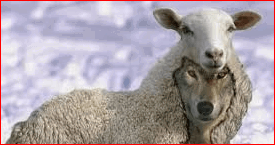
Have you ever noticed that just 57 verses into YHWH’s Word, we are given a very deep insight into just how skilled satan is at deception ?
I’m sure you can recall that :
in the first two chapters of YHWH’s Word, we are told about how wonderful, powerful, & magnificent the Creator is.
We read that Adam & Eve are created in a perfect paradise, where they were in an incredibly intimate, & wonderful relationship with that Creator, & were given dominion over it all.
Under those perfect conditions & circumstances, can you imagine that it would be possible that Eve could be deceived into not believing what her Creator had said to them ?
Yet, that is exactly what happened !
To awaken us to how skilled satan is at deceiving people, let’s remember that satan went into that place of perfection, to a woman who had intimate knowledge, and a relationship with YHWH, the Creator, and deceived her into believing she ought to disobey what YHWH had said !
Isn’t that unbelievably, powerful deception ?
We are told in Genesis 3 that “the serpent was cunning above every beast of the field which YAHWEH Elohim had made”. The Hebrew word translated as “cunning” is H7, arum, which, according to Strong’s & BDB, can mean subtle, shrewd, crafty, sly, & cunning.
Interestingly, the English word, “cunning”, means “to be very skilled at achieving a goal by means of deception”.
Isn’t Genesis 3 really warning us that this serpent, this beast, (satan), is the most skilled deceiver ever to exist ?
Let me write that another way.
YHWH’s Word tells us right there in the beginning, that there is a very powerful spiritual entity at work, satan, who wants to deceive us, & we're told that he is more skilled at doing that, than any living being.
We are told that his craft hinges on his ability to get people to question, & then to reject, the things that YHWH said.
We are told exactly how much success he had, & we see in Genesis 3 that his very first attempt to do this, did not fail.
Again, satan went into that perfect environment - he went to a woman who had a very intimate relationship with YHWH, & was very aware of
what YHWH had said - satan set out to deceive the woman into
committing an act of disobedience in the very beginning of our Bible.
Isn’t it true, that satan is so skilled & powerful as a deceiver, that he has gotten many Christians to believe that Messiah Yahushua would want them to disobey what YHWH, His Father, said ?
In my teaching on “is your faith a Bible-based faith ?”, I examined Matt 7:21-23 & Matt 24:4-5, showing that Messiah Yahushua prophesied that “many” people would be deceived.
If we read Mark 13:22-23, aren’t we told that “even the elect could be led astray, & be deceived" ?
If satan has continued deceiving people throughout the centuries using this same method, why do some of us think we are immuned ? Shouldn't we be combating any possible deception by continually TESTING all things (1 Thes 5:21) ?
What I am about to present is a TEST of the possible scenarios for the original Passover.
Detailed Possible Scenarios for the Original Passover
There are two main belief systems that relate to the keeping of the original Passover. To assess which belief system is scripturally correct, I will present two possible scenarios, thus TESTING each scripturally.
The first scenario involves keeping Passover by starting at the beginning of the 14th of Aviv – soon after sunset.
The second way involves celebrating Passover from around 3 pm on the 14th of Aviv, and continuing on into the 15th of Aviv.
By comparing these scenarios, we should be able to ascertain which is more scripturally accurate.
Could I strongly encourage the reader to "put aside", what they think they know about Passover, based on the Renewed Covenant Scriptures (NT), & focus only on the original Passover Scriptures ?
This first scenario relies on the idea that “between the evenings” means from sunset to dark at the start of Day 14. The times are hypothetical to see if this idea would fit in with the specific Scriptures. They are based on real times in Cairo, Egypt. Sunset is about 6 p.m. The days indicated are for the month of the Aviv. Please take as much times as you need, to very carefully examine all the details in each row.
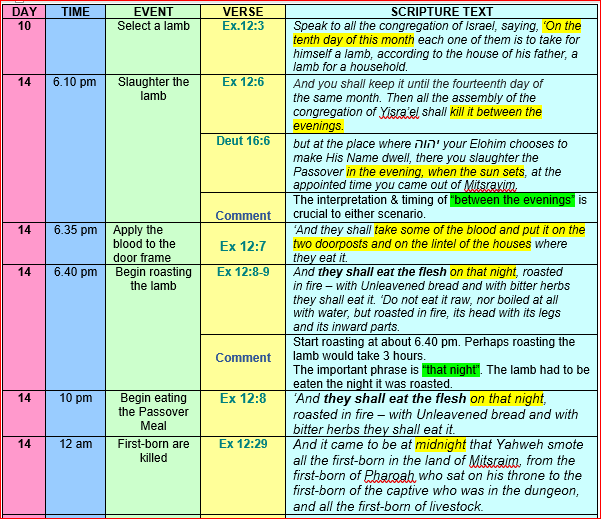
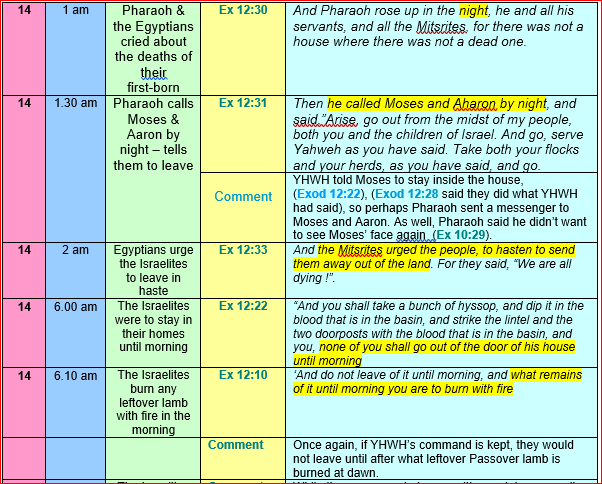
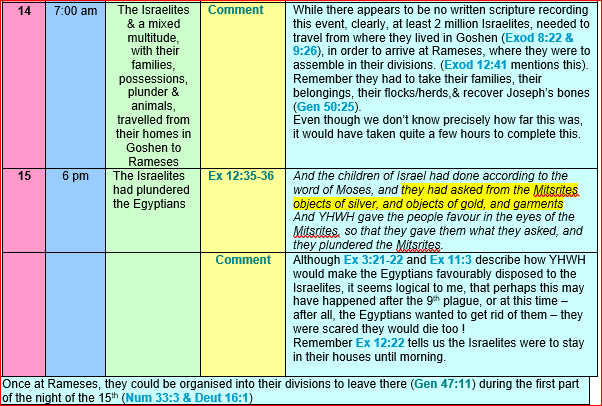
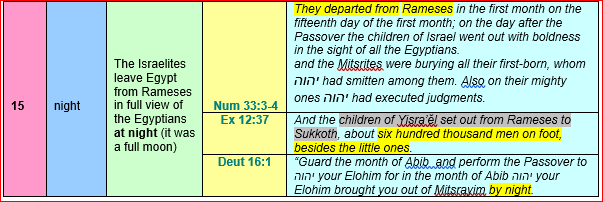
This second scenario relies on the idea that “between the evenings” means from 3 pm until sunset on the afternoon of Day 14. The times are hypothetical to see if this idea would fit in with the specific Scriptures. They are based on real times in Cairo, Egypt. The days indicated are for the month of the Aviv.
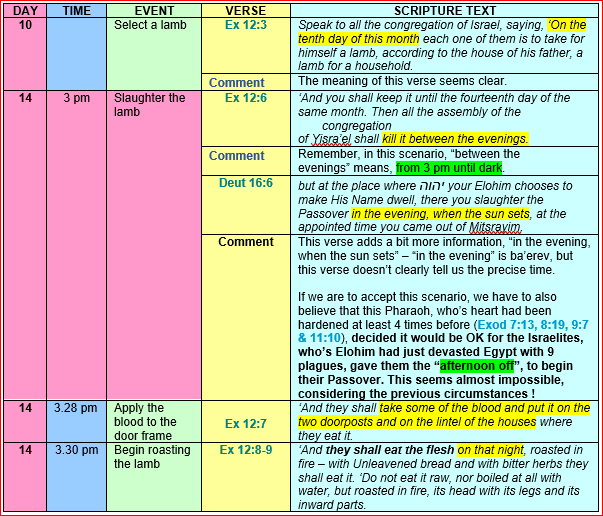
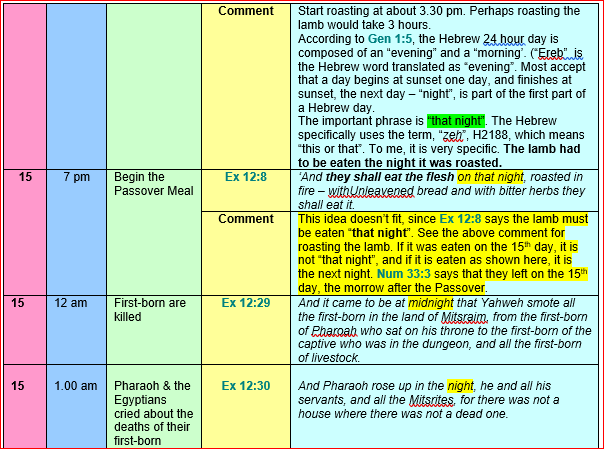
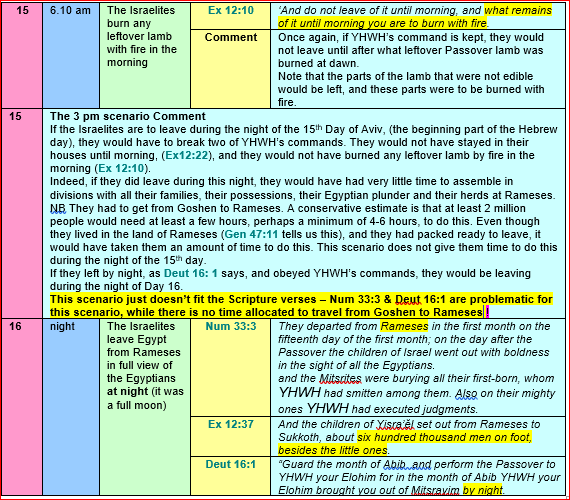
Analysis of the Two Possible Scenarios concerning the Passover Event
There appears to be only minor problems with the first scenario.
One is that in Exod 12:11, the Israelites were told "to eat the Passover lamb with their belt fastened, their sandals on their feet and with their staff in hand – to eat it in haste". If they didn’t leave until almost 20 hours later, why were they told this ?
A possible answer is that they knew that they were not to do any work on the 1st day of Unleavened Bread, the 14th of Aviv.
Another possible reason is that they knew they were leaving, but they didn’t know exactly when – after all, they had to have Pharaoh’s permission to leave.
A third possible problem with this scenario is that it doesn’t seem to fit the timing of Messiah Yahushua’s death as the Passover Lamb (3 pm). He did die on the 14th Day of Aviv, though not at the exact time that the Passover lamb was slaughtered on the original day of Passover. For many people, this is unacceptable, since they say, the Messiah must fulfil every detail of prophesy. If we check Exod 12:14, we are told that the day, the 14th day of Aviv, was to be a memorial, not a re-enactment.
Exo 12:14 And this day shall be unto you for a memorial; and ye shall keep it a feast to the LORD throughout your generations; ye shall keep it a feast by an ordinance for ever.
One study makes the point that the Jews, before and during Yahushua’s time on earth, had no idea of any connection between the original Passover lamb, and the death of the Messiah. Keith Hunt claims that there is no scripture in the Tanach connecting these two events. Indeed the only scripture verse about a slaughtered lamb in the Tanach, that I could find was Isaiah 53:7. The Messiah is only described as the Passover once in the Apostolic Writings (1 Cor 5:7).
Isa 53:7 He was oppressed, and he was afflicted, yet he opened not his mouth: he is brought as a lamb to the slaughter, and as a sheep before her shearers is dumb, so he openeth not his mouth.
1Co 5:7 Purge out therefore the old leaven, that ye may be a new lump, as ye are unleavened. For even Messiah our passover is sacrificed for us:
I believes that Messiah Yahushua celebrated the Passover on the evening at the beginning of the14th day of Aviv, on the day He died. It seems logic that He would have gotten it right.
If we look at Exodus 12:50-51, we notice that there appears to be a contradiction about the day the Hebrews left Egypt. This is the same issue I dealt with in Exod 12:17.
Exod 12:50-51 And all the children of Israel did as Yahweh commanded Moses and Aharon, so they did. And it came to be on that same day that YHWH brought the children of Yisra’ĕl out of the land of Mitsrayim according to their divisions.
A possible explanation is that Pharaoh freed the Hebrews after midnight on the 14th day of Aviv, & even though they didn’t leave Rameses until the 15th day, they were free to do so. Remember also that it would take a considerable amount of time for the Israelites to travel from Goshen to Rameses.
Scenario two has problems that are more concerning.
A major problem here is that if the Israelites left on the 15th day of Aviv, the day many interpret as the first day of the festival of Unleavened Bread. In doing so, they would be breaking the direct command (Exod 12:16), not to do any manner of work, that YHWH gave the Israelites just a few days before.
Exo 12:16 And in the first day there shall be an holy convocation, and in the seventh day there shall be an holy convocation to you; no manner of work shall be done in them, save that which every man must eat, that only may be done of you.
Another problem with scenario two is that some of the specific events described in the scriptures cannot fit into the possible time-frame that would have needed to occur.
Exodus 12:8 tells us that the Passover lamb had to be eaten, the night it was roasted, and this cannot happen with scenario two.
Exod 12:8 ‘And they shall eat the flesh on that night, roasted in fire – with Unleavened bread and with bitter herbs they shall eat it.
A similar problem occurs when we attempt to match the leaving from Egypt with the timing stated in Numbers 33:3, that is, during the night of the 15th day of Aviv (Deut 16:1). This timing just won’t fit the scriptural details of scenario two.
Num 33:3 And they departed from Rameses in the first month, on the fifteenth day of the first month; on the morrow after the passover the children of Israel went out with an high hand in the sight of all the Egyptians.
Deu 16:1 Observe the month of the Abib, and keep the passover unto the LORD thy God: for in the month of the Abib; YHWH Your Elohim brought thee forth out of Egypt by night.
If the above scenario is correct, I believe the following summary of points, have to be true.
1: We have to believe that "between the evenings", beyn ha’everim, must mean "from 3 pm until sunset".
2: If "between the evenings" is a time from 3 pm until sunset, then we also must believe that Pharaoh, who's heart was hardened at least four times because of the plagues that YHWH had sent upon Egypt, decided to give the Israelites "the afternoon" off from their slavery, namely, the 14th day of Aviv, so that they could "slaughter the Passover animals", & roast them, from 3 pm to sunset.
3: If we compare the HRB of Lev 23:5, with the Greek Septuagint, we notice that the Greek word, translated as "evening" in the Septuagint is G2073, hespera.
Lev 23:5 In the fourteenth day of the first month between the evenings is YHWH's passover. (HRB)
 If we check Strong's Concordance & Thayer's Lexicon, we see that clearly, from these two witnesses, G2073, hespera, means “evening”.
If we check Strong's Concordance & Thayer's Lexicon, we see that clearly, from these two witnesses, G2073, hespera, means “evening”.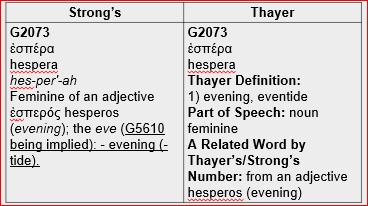
If we now look at Matt 14, there appear to be two “evenings” in the one scenario.
Mat 14:15 And when it was evening, his disciples came to him, saying, This is a desert place, and the time is now past; send the multitude away, that they may go into the villages, and buy themselves victuals.
Mat 14:23 And when he had sent the multitudes away, he went up into a mountain apart to pray: and when the evening was come, he was there alone.
If we check the APB+ translation of Matt 14:15, please notice that the Greek word, translated as "evening" is G3798, opsios. I have copied Strong's & Thayer's definitions below.

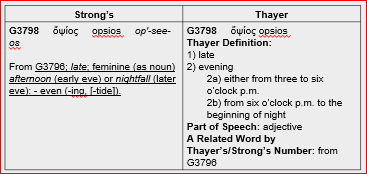
Based on this information, isn’t it now obvious that the “evening” in the verse 15 is probably referring to the “afternoon”, while the “evening” in verse 23 is referring to a later time such as “evening” or “night” ?
Some supporters of the interpretation of "between the evenings" meaning from "3 pm until sunset" claim that, for the Jews of Israel, as native speakers of Hebrew, this term, beyn ha’everim, means "afternoon".
While I would not question the validity of that statement with the current Jews of Israel, if “between the evenings” meant “from 3 pm until sunset”, back when the Torah was written, why does the Septuagint use G2073 in Lev 23:5 & elsewhere, when there is a perfectly good Greek word, G3798, that can be translated as “afternoon ?
Doesn't it seem likely that the translators of the Septuagint, understood that “between the evenings” to mean, “from sunset to dark”, & not “from 3 pm until sunset"?
4: We must ignore several scriptural verses as being translation errors.
~ In Exod 12:8, we must impose the interpretation of the phrase “that night” to mean the next night.
~ In Deut 16:1, we must translate “by night” as meaning during the daylight.
5: We must expect that, either YHWH gave one command, & then changed His mind, as in the case of Exod 12:16, or the Israelites disobeyed YHWH by working on a day He proclaimed a few days earlier as a “non-work” day.
We know for sure, that the Israelites left Rameses on the 15th day of Aviv, (Num 33:3) whether it was during the night time, or during the daylight hours (Deut 16:1 says at night). In travelling out of Egypt, they certainly did “work of some manner”. So that means, (a) they disobeyed YHWH’s command of Exod 12:16 to do “no manner of work”, on the first day of the seven days of unleavened bread, or (b) the 15th day is NOT the first day of the seven days of unleavened bread.
Num 33:3 And they departed from Rameses in the first month, on the fifteenth day of the first month; on the morrow after the passover the children of Israel went out with an high hand in the sight of all the Egyptians.
6: I mentioned this point briefly in the scenario chart above, but, because I strongly believe that most people seem to ignore it, I'd like to elaborate on it here.
We are told in several verses that the Israelites lived in Goshen, Egypt (Gen 45:10, 46:34, 47:6, & Exod 8:22). We know from Num 33:3, that they left Rameses on the 15th day of Aviv.
That means that when Pharaoh ordered them out of Egypt, they had to travel from where, at least 2 million of them lived in Goshen, to get to Rameses.
We don't know precisely where these places are, but I do know that it would have taken quite some time for these 2 million people to travel from Goshen to Rameses with their families, possessions, plunder, & animals.
This scenario does not allow for significant event.
Conclusion
Based on what the Scripture verses tell us, all the practical aspects involved, & the above information, I strongly believe that Scenario one, is the only real possible scenario.
What do you think ?
Was Messiah Yahushua's last meal a Passover celebration ?
I realise that this process is quite complicated, and I may not have answers to every question - I may not even have all the questions. I might not have covered all the possibilities. If you find any errors in logic, or any omissions or any corrections, please let me know, at askseekknockand test@gmail.com & I will address them.
In order to arrive at a correct conclusion, I will attempt to present :
(a) a statement of the two main scenarios with regard to the meal eaten on the evening before Messiah Yahushua was crucified
(b) a statement of the command to keep Passover
(c) the evidence for each scenario
(d) the problems with each scenario
(e) the subsequent beliefs associated with each scenario, and
(f) my conclusion.
Some of the time, I will simply make statements or comments, while at other times, I will ask, and attempt to answer questions in order to add clarity to my understanding.
I'd like to strongly encourage you the reader, to be involved in this study process. While it is my intention to present accurate information, I will be recording "my" verdict about each piece of evidence presented, but I ask you to think about, & perhaps record "your" comments & verdict, as well. I plan to assess the strength of the evidence in my verdict, & hope that you can do the same.
Limitations for this study
While I have access to several tools, such as e-Sword, concordances & etymological books, where I can examine Hebrew & Greek words for possible meanings, and can check the various forms of these words, my knowledge of Hebrew & Greek grammar is limited - I call myself an "advanced" beginner. I will therefore, do the best that I can to examine, and explain my reasoning & understanding of the scripture verses, I will be referring to, hopefully in their correct context.
The two main scenarios commonly practised are :
A: Messiah Yahushua ate the Passover meal on the evening at the start of the 14th of Aviv, &
B: Messiah Yahushua did not eat the Passover meal, but instead ate a practice sedar to teach His disciples (This assumes an evening to evening determination of a day).
Background Information
The full description of the original Passover event is given in Exodus 12.
1: Exod 12:14 states the command about keeping the Passover -it is to kept as a memorial.
Exo 12:14 And this day shall be unto you for a memorial; and ye shall keep it a feast to YHWH throughout your generations; ye shall keep it a feast by an ordinance for ever.
Q: Which day is to be a memorial ?
A: Based on Exod 12, it must be the 14th day of Aviv, since it is the last day mentioned previously in this chapter (Exod 12:6). There are several other scriptures that state that the Israelites kept, and/or killed the Passover on the 14th day of Aviv (Num 9:5, 2 Ch 30:15, Erza 6:19, Ezek 45:21)
2: There are some other commands directly related to Passover.
a) Exod 23:14-17 tells us that Passover along with Shavuot, & Tabernacles are to be kept as pilgrimage feasts each year. Deut 16:16 adds a little more detail by explaining that all males are to do this in the place YHWH chooses.
Exo 23:14 Three times thou shalt keep a feast unto me in the year.
Exo 23:15 Thou shalt keep the feast of unleavened bread: (thou shalt eat unleavened bread seven days, as I commanded thee, in the time appointed of the month Abib; for in it thou camest out from Egypt: and none shall appear before me empty:)
Exo 23:16 And the feast of harvest, the firstfruits of thy labours, which thou hast sown in the field: and the feast of ingathering, which is in the end of the year, when thou hast gathered in thy labours out of the field.
Exo 23:17 Three times in the year all thy males shall appear before YHWH your Elohim.
Deu 16:16 Three times in a year shall all thy males appear before YHWH your Elohim in the place which he shall choose; in the feast of unleavened bread, and in the feast of weeks, and in the feast of tabernacles: and they shall not appear before YHWH empty:
b) Deut 16:1-2 tells us we are to observe the month of the Aviv, & keep the Passover
Deu 16:1 Observe the month of the Abib, and keep the passover unto YHWH Your Elohim for in the month of the Abib YHWH Your Elohim brought thee forth out of Egypt by night.
Deu 16:2 Thou shalt therefore sacrifice the passover unto YHWH Your Elohim, of the flock and the herd, in the place which YHWH shall choose to place his name there.
c) Deut 16:5-7 tells us we may not sacrifice the Passover lamb within our gates (our towns), but at the place YHWH chooses. We are reminded to do this at even, ba erev, at the going down of the sun, at the time Israel came out of Egypt.
Deu 16:5 Thou mayest not sacrifice the passover within any of thy gates, which YHWH Your Elohim giveth thee:
Deu 16:6 But at the place which YHWH Your Elohim shall choose to place his name in, there thou shalt sacrifice the passover at even, at the going down of the sun, at the season that thou camest forth out of Egypt.
Deu 16:7 And thou shalt roast and eat it in the place which YHWH Your Elohim shall choose: and thou shalt turn in the morning, and go unto thy tents.
d) Exod 12:43-49 tell us details about who can part-take of the Passover. The Hebrew word translated as "stranger" is nekar, & means a non-Israelite passing through the nation of Israel, but not living with them. A foreigner is a non-Israelite person dwelling with the nation of Israel. The "stranger" in v48, is a ger - a non-Israelite who is wanting to become a legal Israelite citizen - he is studying, in preparation for becoming a full-time Israelite, sometimes called a proselyte.
Exo 12:43 And YHWH said unto Moses and Aaron, This is the ordinance of the passover: There shall no stranger eat thereof:
Exo 12:44 But every man's servant that is bought for money, when thou hast circumcised him, then shall he eat thereof.
Exo 12:45 A foreigner and an hired servant shall not eat thereof.
Exo 12:46 In one house shall it be eaten; thou shalt not carry forth ought of the flesh abroad out of the house; neither shall ye break a bone thereof.
Exo 12:47 All the congregation of Israel shall keep it.
Exo 12:48 And when a stranger (ger) shall sojourn with thee, and will keep the passover to YHWH, let all his males be circumcised, and then let him come near and keep it; and he shall be as one that is born in the land: for no uncircumcised person shall eat thereof.
Exo 12:49 One law shall be to him that is homeborn, and unto the stranger that sojourneth among you.
Q: Where does YHWH choose to place His name ?
A: I believe that before the Temple was built in Jerusalem, it was where ever the Tabernacle was located. 2 Kings 21:4 tells us that when the Temple was built, it was Jerusalem.
2Ki 21:4 And he built altars in the house of YAHWEH, of which YAHWEH had said, In Jerusalem I will put My name.
Q: What does "observe the month the Aviv" mean ?
A: Some would say it means determining when the barley is "aviv", by "looking" at it.
The Hebrew word translated as "observe" is the word, shamar, which can mean to guard, protect, hedge, attend to, or keep.
Therefore it could also simply mean "celebrate Passover in the first month of the year", at the time when the barley is Aviv.
Q: What does Deut 16:5 mean - it is translated as above ?
A: I'm not sure. The Hebrew word translated as "within any" is "echad", which can mean "united, one, first, each or every". When combined with verse 6, perhaps it is saying "the Tabernacle" at this time, & then later, "the Temple" in Jerusalem. The CJB translates it as follows :
Deu 16:5 You may not sacrifice the Pesach offering in just any of the towns that Adonai your God is giving you.
I am inclined to think that this may be a better translations, since the Hebrew word translated as "gates", H8179, sha'ar, is probably referring to the city or town gates, not the "gates" of a specific house.
Evidence that supports Scenario 1 - Messiah Yahushua is eating the Passover meal
1: Matt 26:17-21, Mark 14:12-18, & Luke 22:7-20 each describe the preparation, & eating of the Passover by Yahushua & His disciples. Please note that the words in brackets are NOT in the original manuscript.
Mat 26:17 Now the first (day) of the (feast of) unleavened bread the disciples came to Yahushua, saying unto him, Where wilt thou that we prepare for thee to eat the passover?
Mat 26:18 And he said, Go into the city to such a man, and say unto him, The Master saith, My time is at hand; I will keep the passover at thy house with my disciples.
Mat 26:19 And the disciples did as Yahushua had appointed them; and they made ready the passover.
Mat 26:20 Now when the even was come, he sat down with the twelve.
Mat 26:21 And as they did eat, he said, Verily I say unto you, that one of you shall betray me.
Mar 14:12 And the first day of unleavened bread, when they killed the passover, his disciples said unto him, Where wilt thou that we go and prepare that thou mayest eat the passover?
Mar 14:13 And he sendeth forth two of his disciples, and saith unto them, Go ye into the city, and there shall meet you a man bearing a pitcher of water: follow him.
Mar 14:14 And wheresoever he shall go in, say ye to the goodman of the house, The Master saith, Where is the guest chamber, where I shall eat the passover with my disciples?
Mar 14:15 And he will shew you a large upper room furnished and prepared: there make ready for us.
Mar 14:16 And his disciples went forth, and came into the city, and found as he had said unto them: and they made ready the passover.
Mar 14:17 And in the evening he cometh with the twelve.
Mar 14:18 And as they sat and did eat, Yahushua said, Verily I say unto you, One of you which eateth with me shall betray me.
Luk 22:7 Then came the day of unleavened bread, when the passover must be killed.
Luk 22:8 And he sent Peter and John, saying, Go and prepare us the passover, that we may eat.
Luk 22:9 And they said unto him, Where wilt thou that we prepare?
Luk 22:10 And he said unto them, Behold, when ye are entered into the city, there shall a man meet you, bearing a pitcher of water; follow him into the house where he entereth in.
Luk 22:11 And ye shall say unto the goodman of the house, The Master saith unto thee, Where is the guest chamber, where I shall eat the passover with my disciples?
Luk 22:12 And he shall shew you a large upper room furnished: there make ready.
Luk 22:13 And they went, and found as he had said unto them: and they made ready the passover.
Luk 22:14 And when the hour was come, he sat down, and the twelve apostles with him.
Luk 22:15 And he said unto them, With desire I have desired to eat this passover with you before I suffer:
Luk 22:16 For I say unto you, I will not any more eat thereof, until it be fulfilled in the kingdom of YHWH.
Luk 22:17 And he took the cup, and gave thanks, and said, Take this, and divide it among yourselves:
Luk 22:18 For I say unto you, I will not drink of the fruit of the vine, until the kingdom of God shall come.
Luk 22:19 And he took bread, and gave thanks, and brake it, and gave unto them, saying, This is my body which is given for you: this do in remembrance of me.
Luk 22:20 Likewise also the cup after supper, saying, This cup is the new testament in my blood, which is shed for you.
a) Matt 26:17, Mark 14:12, & Luke 22:8 each make reference to "preparing to eat the Passover".
In Matt 26:17, the Greek word translated as "prepare" is hetoimazo, G2090, ἑτοιμάζω. Strong's Concordance claims that it means "prepare". Mark 14:12 & Luke 22:8 use the same word. The Greek word, ετοιμασωμεν , is the form of G2090 in Matt 26:17, while ετοιμασατε , is used in Luke 22:8. While I do not understand these differences, I know they are grammatically different.
Q: What did they prepare ?
A: All three sources tell us "the Passover"
Q: What is the Passover ?
A: Strong's Concordance tells us that the Greek word translated as "Passover" is G3957. The concordance says it means the Passover (the meal, the day, the festival or the special sacrifices connected with it). In this context, it may mean the meal, the day, or the festival. Since we are told later in each chapter that they are eating a meal, clearly it means preparing for the meal.
VERDICT - I believe this is very strong scriptural evidence that the apostles intended to prepare for an actual Passover memorial meal.
b) Matt 26:19 & Mark 14:16 tell us that the disciples did as Yahushua had told them - they made ready (prepared) the Passover. Again, the Greek word translated as "made ready" is the Greek word G2090.
Mat 26:19 And the disciples did as Jesus had appointed them; and they made ready the passover.
Mar 14:16 And his disciples went forth, and came into the city, and found as he had said unto them: and they made ready the passover.
VERDICT - I believe this is strong scriptural evidence that they went, & prepared a Passover memorial meal.
c) Matt 26:21 & Mark 14:22 each use the expression "as they did eat". G2068 is the Greek word translated as "did eat". Clearly they were eating a meal.
Mat 26:21 And as they did eat, he said, Verily I say unto you, that one of you shall betray me.
Mar 14:22 And as they did eat, Jesus took bread, and blessed, and brake it, and gave to them, and said, Take, eat: this is my body.
Matt 26:2 1 & Mark 14:18 read "as they did eat". Clearly, "when even was come" translated from G3798, ὄψίος op'-see-os, (meaning late, afternoon, evening or nightfall), refers to evening or nightfall since it is likely that they had begun preparing things (Matt 26:19, Mark 14:16 & Luke 22:8) at the start of the 14th of Aviv.
Q: What did they eat ?
A: Since there are several references to the Passover, it must be the Passover meal - bread & the fruit of the vine are specifically mentioned.
VERDICT - I believe this is strong supporting evidence that they ate the Passover memorial meal.
2: There is not one scripture that says, or implies that the Passover was kept on the 15th Aviv. In fact, there are several scriptures that tell us that the Passover was kept on the 14th of Aviv (Num 9:5, Josh 5:10, & Ezra 6:19).
Num 9:5 And they kept the passover on the fourteenth day of the first month at even in the wilderness of Sinai: according to all that the LORD commanded Moses, so did the children of Israel.
Jos 5:10 And the children of Israel encamped in Gilgal, and kept the passover on the fourteenth day of the month at even in the plains of Jericho.
Ezr 6:19 And the children of the captivity kept the passover upon the fourteenth day of the first month.
VERDICT - I believe this is strong implied evidence that they prepared, & then ate the Passover memorial meal.
3: There are several verses that state that the day the Passover lambs are killed is the day of Unleavened Bread. (Mark 14:1 tells us the Passover & Unleavened Bread are the same day;
Mar 14:1 After two days was the (feast of) the passover, and of unleavened bread: and the chief priests and the scribes sought how they might take him by craft, and put him to death.
Clearly, this cannot be saying that the "feast" of Unleavened Bread is the same as the day of Passover, since the 15th of Aviv is the "feast of unleavened Bread" (Lev 23:6). Note "feast of" is added, & isn't in the original manuscript.
Matt 26:17 tells us the first of unleavened bread was the day they asked about preparing the Passover; Mark 14:12 tells us that the first day of unleavened bread was when the Passover was killed; Luke 22:7 agrees). If you check Exod 12:18, I believe this also supports the idea that the 14th of Aviv, Passover, is the first day of unleavened bread.
VERDICT - I believe this is strong scriptural evidence that they day Yahushua & the apostles prepared, & ate the Passover memorial meal, & the day Yahushua was crucified, was the first day of Unleavened Bread.
4: Matt 26:28, Mark 14:24 & Luke 22:20 all use the expression "blood or cup of the new convenant which IS shed for many". Most, if not all translations use this present tense expression, "which IS shed", implying that Yahushua's blood is already shed. It is almost as if, as soon as Judas leaves, the process of Him dying begins, & so in just a few hours, in reality, His blood will begin to be literally shed.
VERDICT - I believe this is fairly strong scriptural evidence this the meal at which this phrase was spoken was the Passover meal (part of which was certainly a covenant confirming meal).
5: Evidence from Mark 14:12-15
Mar 14:12 And the first day of unleavened bread, when they killed the passover, his disciples said unto him, Where wilt thou that we go and prepare that thou mayest eat the passover?
Mar 14:13 And he sendeth forth two of his disciples, and saith unto them, Go ye into the city, and there shall meet you a man bearing a pitcher of water: follow him.
Mar 14:14 And wheresoever he shall go in, say ye to the goodman of the house, The Master saith, Where is the guestchamber, where I shall eat the passover with my disciples?
Mar 14:15 And he will shew you a large upper room furnished and prepared: there make ready for us.
Q: Why are we given the detail of the water carrier of verse 13 ?
A: It could be telling us that he was an Essene, since only women, or slaves carried water at this time in Israel's history.
Q: What can we infer about the "goodman of the house" in verse 14 ?
A:
1: "goodman of the house" simply means "head of the house"
2: He had the upper room "furnished & prepared" (verse 15)
3: He used the same calendar as Yahushua, since there is no mention of any other time
4: Since the water carrier may have been an Essene, so may the "goodman" have been an Essene
Q: If the upper room was furnished, & prepared (v15), what can we infer?
A: The room had been cleared of "leaven", & set up for the apostles & Yahushua to use to celebrate a Passover meal.
Q: If this is so, what preparations, would the two disciples need to do so that Yahushua could "eat the Passover" (v12) ?
A: Probably preparing the Passover lamb, & getting the other Passover meal materials (bitter herbs, unleaven bread, wine)
VERDICT - this is fairly strong to strong evidence that Yahushua used a different calendar to the Pharisees & Sadducees
- it is strong evidence to support the claim that Yahushua kept the biblical Passover, the night before He died.
6: Luke 22:15 tells us that Yahushua says that He "greatly" desires to eat this Passover with them BEFORE He suffers.
Luk 22:15 And He said to them, I have greatly desired that I eat this Passover with you before I suffer.
Q: What is the immediate context for Yahushua making this statement ?
A: This statement is made after verse 13 where we are told that "they prepared the Passover".
Verse 14 tells us "when the hour came, He reclined, & the 12 apostles were with Him". Perhaps we can assume that this statement is the first recorded words Yahushua says to His apostles at the prepared Passover meal.
Q: Some claim that Yahushua, who died at 3pm on the 14th of Aviv, cannot have eaten a Passover meal on the evening before He died, when He in fact, is that Passover lamb. Is this claim supported by this verse ?
A: While we can't be absolutely certain, this verse certainly indicates that Yahushua wants to eat this Passover meal with His apostles BEFORE He suffers. Even though, "it is not spelled out in words of one syllable", and even though verse 16 tells us that He will not eat it again until it is fulfilled in YHWH's kingdom, verses 17-20 give details of Yahushua sharing unleavened bread & wine with His apostles. Verse 19 tells us that Yahushua is keeping this as a memorial (possibly quoting Exod 12:14).
Q: If Luke 22:15 doesn't mean what it reads, what else could it mean ?
A: Yahushua is not a liar, so I take Him at what He says !
VERDICT - this verse is strong evidence that Yahushua ate a Passover meal.
Evidence that supports Scenario 2 - Yahushua is not eating a Passover meal
Those who believe that Yahushua did not eat a Passover meal have several reasons for believing this. These are :
1: Proponents believe that, based on 1 Cor 5:7, Yahushua is the Passover lamb.
1Co 5:7 Purge out therefore the old leaven, that ye may be a new lump, as ye are unleavened. For even Messiah our passover is sacrificed for us:
VERDICT - Even though, this is the only verse that I can find, that specifically points to Messiah Yahushua as "our Passover", I believe this is reasonable scriptural evidence.
2: Proponents believe that, based on Matt 27:46-50, Yahushua died at the ninth hour, namely, 3 pm, & claim that this ties in with a "between the evenings" understanding of 3 pm to sunset, the same time they claim the original Passover lambs were killed, on the 14th of Aviv.
VERDICT - I believe that, based on their understanding that, this is good scriptural evidence that implies that Yahushua was the Passover lamb.
3: Proponents also cite the following scriptures as evidence. They do this by claiming that the Greek word, G4413, can in this instance mean "before". They use Strong's explanation as evidence. Using this logic, they claim that these verses should read :
Matt 26:17 "before the first of unleavened bread, the disciples came to Jesus said unto him where wilt thou that we prepare for thee to eat the passover" and
Mark 14:12 "before the first day of unleavened bread when they killed the passover, his disciples said unto him, where wilt thou that we go and prepare that thou mayest eat the passover".
For comparison, here are the KJV translations of these verses :
Mat 26:17 Now the first day (of the feast) of unleavened bread the disciples came to Jesus, saying unto him, Where wilt thou that we prepare for thee to eat the passover?
Mar 14:12 And the first day of unleavened bread, when they killed the passover, his disciples said unto him, Where wilt thou that we go and prepare that thou mayest eat the passover?
The Greek word translated as "first" is G4413, protos. Strong's Concordance explains it as follows :
G4413 Strong's πρῶτος prōtos
Contracted superlative of G4253; foremost (in time, place, order or importance): - before, beginning, best, chief (-est), first (of all), former.
G4253 Strong's πρό pro
A primary preposition; “fore”, that is, in front of, prior (figuratively superior) to. In compounds it retains the same significations: - above, ago, before, or ever. In compounds it retains the same significations.
VERDICT - I'm not sure this is supporting evidence for either scenario. If this preparation was done at the start of the 14th of Aviv, then the idea of "before" is irrelevant. Either way, it is implied evidence, not direct scriptural evidence
4: Proponents claim that "the preparation" referred to in these verses is simply the getting ready of everything for the Passover meal. This includes cleaning the house of leaven, getting all the food & other materials, and the taking care of the Passover lamb. They claim that the apostles are preparing things for a Passover meal at the start of the 15th of Aviv.
VERDICT - I believe this is only implied evidence - its strength is fair.
5: Proponents claim that the bread used at the "last super" was not unleavened bread, & so it could not have been a Passover meal. In Matt 26:26, we are told Yahushua took "bread". The claim is that when we examine this word, G740, using Strong's Concordance, we are told that it refers to "leavened" bread.
Mat 26:26 And as they were eating, Jesus took bread, and blessed it, and brake it, and gave it to the disciples, and said, Take, eat; this is my body.
G740 Strong's ἄρτος artos
From G142; bread (as raised) or a loaf: - (shew-) bread, loaf.
G142 Strong's αἴρω airō
A primary verb; to lift; by implication to take up or away; figuratively to raise (the voice), keep in suspense (the mind); specifically to sail away (that is, weigh anchor); by Hebraism (compare [H5375]) to expiate sin: - away with, bear (up), carry, lift up, loose, make to doubt, put away, remove, take (away, up).
VERDICT - While this evidence appears to be convincing, I believe this is poor supporting evidence. My latest research seems to indicate that there is no word for "unleavened bread", so the word G740 is used to indicate any bread at all. "Unleavened" is only ever used when referring to the "feast" of Unleavened Bread.
6: Proponents claim that it is unscriptural to eat the Passover meal before the Passover lamb is killed, and so it cannot have been the Passover meal.
VERDICT - I believe this is only fair supporting implied evidence.
7: Proponents claim that it can't be the Passover meal, since the disciples thought Judas was going to buy for the feast, quoting, John 13:29. They assert that it is against Torah to do so on a moed & chag (feast).
Joh 13:29 For some (of them) thought, because Judas had the bag, that Jesus had said unto him, Buy (those things) that we have need of against the feast; or, that he should give something to the poor.
One line of thought is that Passover is the night beginning the 14th, and the Feast of Unleavened Bread begins on the 15th. So, if Yahushua & the disciples were eating Passover the night of the 14th, it would have been possible for Judas to buy something for the Feast of Unleavened bread that would begin the following night.
VERDICT - I believe this is fairly strong supporting evidence against the scenario, which claims this is the first day of Unleavened Bread.
8: Some claim that Matthew was originally written in Hebrew, & then translated into Greek. They then argue that, if we are going to understand what Matthew really says, we must translate the Greek back into Hebrew, & analyse it from that perspective.
VERDICT - While I have often used this strategy, I'm not sure how anyone would do this, & I'm not sure this is evidence at all.
9: Others claim that there is no mention of 'the original exodus' in any of the gospels. In several places in the Tanach, we are told to remember the time the Israelites were set free from the slavery of Egypt.
VERDICT - I'm not sure that this is evidence that can be used for this discussion.
10: Proponents also claim that Yahushua & the apostles went out of the house after eating, an action that was forbidden for the original Passover (Exod 12:22).
VERDICT - I believe this is fair supporting evidence against scenario 1. My understanding of Exod 12:22 is that a command given there, was for that group of people, at that time.
11: I believe the most Jews kept the pharisaic Passover that is mentioned in John 18:28, & indirectly in John 19:31. The pharisaic method is :
(1) kill the Passover lambs at 3 pm on the 14th of Aviv,
(2) prepare the Passover lamb for the Passover meal (still on the 14th),
(3) eat it at the start of the 15th of Aviv.
Believers in scenario 2, use the preparation for the Passover idea (John 9:14) as evidence as well.
VERDICT - this seems like good evidence if the pharisaic method is correct.
12: Many quote Col 2:16-17, which they claim, is a statement saying that the "moedim" of Lev 23, had been "shadow-pictures" of things to come. They argue that Yahushua has fulfilled the first three moedim, that is, He is the Passover lamb, He is the Unleavened Bread, and He is the First Fruits. Heb 10:1 gives us a similar.message.
Col 2:16 Let no man therefore judge you in meat, or in drink, or in respect of an holyday, or of the new moon, or of the sabbath days:
Col 2:17 Which are a shadow of things to come; but the body is of Christ.
Heb 10:1 For the law having a shadow of good things to come, and not the very image of the things, can never with those sacrifices which they offered year by year continually make the comers thereunto perfect.
VERDICT - I believe this is fair evidence.
Problems with scenario 1 - Yahushua is eating a Passover meal
1: Again, in point (5) in the evidence for scenario 2, we see in several scriptures such as Matt 26:26, the Greek word translated as "bread", is G740. Strong's Concordance tells us this word, artos, means bread or loaf. It comes from G142, airo, which means to lift, take up, raise, keep in suspense or sail away.
The claim is that when we examine this word, G740, using Strong's Concordance, we are told that it refers to "leavened" bread, & therefore, this meal cannot be a Passover meal.
Mat 26:26 And as they were eating, Jesus took bread, and blessed it, and brake it, and gave it to the disciples, and said, Take, eat; this is my body.
Rebuttal :
A careful search of the Renewed Covenant, will show that the only Greek word ever used for "bread" is artos, G740. The Greek word, azumos, G106, is translated as unleavened, but "bread" is always added by the translators. "azumos" is only ever used when referring to the "feast" or "day" of unleavened bread. If artos refers only to leavened bread, & the road to Emmaus event of Luke 24:30 was during the 7 days of Unleavened Bread, why were Yahushua & the two disciples eating "bread", artos in the Greek?
Luk 24:30 And it came to pass, as he sat at meat with them, he took bread, (artos) and blessed it, and brake, and gave to them.
We also see artos being used as the Greek word for the "showbread" in the Temple, which was also unleavened bread. (Matt 12:3-4 & Heb 9:2).
Mat 12:3 But he said unto them, Have ye not read what David did, when he was an hungred, and they that were with him;
Mat 12:4 How he entered into the house of YHWH, and did eat the shewbread, (artos) which was not lawful for him to eat, neither for them which were with him, but only for the priests?
Heb 9:2 For there was a tabernacle made; the first, wherein was the candlestick, and the table, and the shewbread (artos); which is called the sanctuary.
How do we know the showbread was unleavened? It is mentioned in a number of places including the Talmud, & by the Jewish Historian Josephus, but more importantly, it is mentioned in the Torah, in Exod 29:23.
Exo 29:23 And one loaf of bread, and one cake of oiled bread, and one wafer out of the basket of the unleavened bread that is before YHWH:
Therefore, any claim that the use of the word artos always refers to "leavened bread" is clearly an error - you cannot conclude that they ate leavened bread at the Last Supper. Clearly, this is not evidence against Scenario 1.
VERDICT - this claim is not evidence.
2: It is unscriptural to eat a Passover meal before the Passover lamb is killed.
Rebuttal :
This may appear to be correct.
However, if we refer to Exod 12:14, we are told specifically, that Passover is to be kept as a "memorial", implying that we do not need to totally re-create the original scenario.
We also need to consider the following.
Matt 26:28, Mark 14:24 & Luke 22:20 all use the expression "blood or cup of the new convenant which IS shed for many". Most, if not all translations use this present tense expression, implying that Yahushua's blood is already shed. It is almost as if, as soon as Judas leaves, the process of Him dying begins, & so in just a few hours, in reality, His blood will begin to be shed.
VERDICT - I believe the original command has precedence over what men may have done. Is the timing of the killing of the Passover lambs a man-made decision ? Perhaps this idea has some worth !
3: When we examine scriptures such as John 18:28, clearly they are referring to two passovers. Proponents of scenario 2, use this second passover as evidence that Yahushua's "last supper" was not a passover meal.
Joh 18:28 Then led they Jesus from Caiaphas unto the hall of judgment: and it was early; and they themselves went not into the judgment hall, lest they should be defiled; but that they might eat the passover.
If we check John 6:4 & John 7:2, we notice that a reference to "passover a feast of the Jews", & "the Jews feast of Tabernacles", respectively. THis is strange because Lev 23:4 calls them, "the feasts of YHWH". They are not, "feasts of the Jews".
I believe because John is the only writer who uses this description, that these "feasts of the Jews" are actually, feasts that have been determined by the pharisaic Jews, as opposed to when the "feasts" of YHWH should be held. Why else would John describe them this way?
The time of day in this verse may have been 5 - 6 am on the 14th of Aviv. Clearly, this is referring to the eating of the Passover AFTER Yahushua is crucified. If Yahushua celebrated the Passover the night before, this is clearly a second Passover. This is the time, the modern day Jews keep their Passover today.
Rebuttal :
Here no rebuttal is required since it seems clear that there were two Passovers being kept. The following sources support this.
Encyclopaedia Judaica on page 690 tells us that :
"The feast of Passover consists of two parts: The Passover ceremony and the Feast of Unleavened Bread. Originally both parts existed separately; but at the beginning of the Exile they were combined".
Eerdman's Dictionary of the Bible p.1076
"Before a.d. 70, the Jews followed Sadduccian reckoning which regulated the Temple services. Afterwards, the Pharisaic system became the norm. It is apparent in John 18:28, that the calendar kept by the Jewish leaders & the one used by Yahushua & His disciples were not the same, as Passover was celebrated on different days".
VERDICT - I believe that the scriptural evidence highlighting the "feasts of the Jews", rather than the feasts of YHWH, is extremely strong evidence to support scenario 1 - Yahushua ate a Passover meal.
4: Earlier in this study, it is claimed that the meal eaten by Yahushua & His disciples can't be a Passover meal since the disciples thought Judas was going to buy for the feast, quoting, John 13:29. They claim it is against Torah to buy & sell so on a moed.
Joh 13:29 For some of them thought, because Judas had the bag, that Jesus had said unto him, Buy those things that we have need of against the feast; or, that he should give something to the poor.
Rebuttal :
This needs to be considered further because I currently, believe that the first day of unleavened bread is the 14th of Aviv - the day of the Passover, when unleavened bread is eaten.
If I am mistaken, & the 14th of Aviv is not the first day of Unleavened Bread, then there is no problem with what the apostles thought Judas was doing.
VERDICT - this could be strong evidence for secenario 2.
5: John 13:1-2 clearly reads in the KJV, "before" the Passover - it uses G4253, pro. If this is so, then it was clearly before the feast of Passover that Yahushua ate a meal with his disciples and washed their feet, & therefore cannot be a passover meal.
Joh 13:1 Now before the feast of the passover, when Jesus knew that his hour was come that he should depart out of this world unto the Father, having loved his own which were in the world, he loved them unto the end.
Joh 13:2 And supper being ended, the devil having now put into the heart of Judas Iscariot, Simon's son, to betray him;
G4253 Strong's πρό pro
A primary preposition; “fore”, that is, in front of, prior (figuratively superior) to. In compounds it retains the same significations: - above, ago, before, or ever. In compounds it retains the same significations.
Rebuttal :
One possibility is that verse one is not connected with verse two. If we examine John 12:1, it speaks of "the Passover", while here, it definitely says "the feast of the Passover".
Joh 12:1 Then Jesus six days before the passover came to Bethany, where Lazarus was which had been dead, whom he raised from the dead.
Q: Why are they different ?
A: There must be a difference otherwise they would use the same phrase.
In John 13:2, the Greek word translated as "being ended" is G1096, ginomai. It can mean to become into being, to arise, be made, or possibly finished. A search of its use in e-Sword results in 456 verses where it is used. Only once out of 456 different translations is "being ended" used. Could this be that the translators do not really know what its meaning is here. Verse 26 tells us that Yahushua had not "ended" His meal since He "dipped the sop & gave it to Judas". The ABP+ Bible says John 13:2 reads, "and supper taking place", while the CJB reads "They were at supper". I believe these are more accurate translations.
VERDICT - It seems to me that the KJV+ translation is not completely accurate.
6: There no mention of the Passover lamb being eaten.
Yes, the word "lamb" is not mentioned explicitly, but it is implied. The Gospels tell us the disciples were "preparing the Passover", which implies they were preparing the lamb for Passover. So, when it says they went to prepare "the Passover", shouldn't this be understood that they were preparing the Passover lamb. The text even tells us it was on the day the Passover was supposed to be killed. (Luke 22:7-13)
So, on the day the Passover lamb is to be killed, Yahushua told His disciples to prepare the Passover so He can eat it with them.
Q: What were they preparing?
A: They were preparing the Passover lamb for supper. Aren't we told in Mark 14:22-23, that "as they did eat" Yahushua took the bread and wine, so, what meal did they eat? Surely, they weren't only eating bread and wine, - they had a Passover meal, which would have included a lamb and bitter herbs. Why would the disciples say in Matt 26:17 " Where wilt thou that we prepare for thee to eat the passover?", if He really wasn't going to eat a Passover with them?
Mar 14:22 And as they did eat, Jesus took bread, and blessed, and brake it, and gave to them, and said, Take, eat: this is my body.
Mar 14:23 And he took the cup, and when he had given thanks, he gave it to them: and they all drank of it.
Rebuttal :
Perhaps there was no Passover lamb mentioned because the people reading these letters knew that the Passover lamb was so much a part of the Passover meal, that it was not necessary to mention it.
VERDICT - Perhaps this should be given some consideration.
7: There is no mention of the exodus from Egypt
Rebuttal :
Perhaps this is because the people reading these letters knew that the telling of the Exodus story is so much a part of a Passover meal, that it was not necessary to mention it.
VERDICT - Perhaps this should be given some consideration.
Problems with scenario 2 - Yahushua did not eat the Passover meal.
While I do not want to offend anyone, I do want to be honest, & I do want to examine all things, & I certainly want to find YHWH's truth.
Many people strongly believe that Yahushua the Messiah is the Passover lamb, & as such, must fulfill all the requirements of the original Passover lambs. This is their major focus.
My question then is, could it be possible that some of these folks have "flavoured" their interpretation of all the Passover scriptures, so that their strong belief in Yahushua as the Passover lamb will not be threatened ?
Please, please decide to have an open mind as you read on, so that we can find YHWH's truth about this matter.
1: While it cannot be denied that Yahushua the Messiah is referred to as our Passover in 1 Cor 5:7, I believe that His death was for several reasons including :
~ the sin of the world (John 1:29), Israel
~ the adulterous bride (to bring back the lost sheep of the house of Israel - note that Yahuhsua was sold for 30 pieces of silver - the price of a woman) (Matt 26:38-40 & Luke 22:41-43)
~ closely connected to this is the fact that Yahushua also died for all those who broke the Mt Sinai Covenant (Exod 32).
~ He died for the elder son (Judah), and others).
~ John 1:29 tells us He was the "lamb of Elohim", who takes away the sin of the world. This title is repeated in John 1:36. It seems to me that this is a reference to a "sin" offering - for the sins of the world.
Joh 1:29 The next day John seeth Jesus coming unto him, and saith, Behold the Lamb of YHWH, which taketh away the sin of the world.
Joh 1:36 And looking upon Jesus as he walked, he saith, Behold the Lamb of YHWH!
The original Passover sacrifice was NOT a sin offering. Please note that in 1 Cor 5:7, Yahushua is referred to as our "Passover", not our Passover lamb - "lamb" is implied. Also note, that this is the only witness in Scripture that I can find which directly connects Yahushua as being the Passover lamb. There is no such connection the Tanach.
Q: Don't Deut 17:6 & 19:15 tells us we need at least two witnesses to establish a matter, & that one witness isn't enough ?
Deu 17:6 At the mouth of two witnesses, or three witnesses, shall he that is worthy of death be put to death; but at the mouth of one witness he shall not be put to death.
Deu 19:15 One witness shall not rise up against a man for any iniquity, or for any sin, in any sin that he sinneth: at the mouth of two witnesses, or at the mouth of three witnesses, shall the matter be established.
Q: Based on these two verses, how then can we use 1 Cor 5:7, one scriptural witness, to claim that Yahushua is the Passover lamb ?
A: If we do, we are going against Torah - so I believe, it must mean something else.
Isn't it true that, the context of this verse, based on the metaphor of "leaven", is about removing sin from our lives? Perhaps the statement that "Messiah our passover is sacrificed for us", is more evidence to support this idea. I am not sure!
At the same time, the statement about Yahushua dying for the sin of the world also has a problem, because Lev 4:14 tells us the sin offering for the congregation is a bullock, while Lev 4:27-28 tells us the sin offering for a person is a female goat.
Heb 9:11-28 compares the sacrifice of Yahushua's death & shedding of His blood, with the sacrifices offered by the high priest, according to the Torah of Moses. Verse 28 tells us Yahushua the Messiah was offered to bear the sins of many, so clearly, His death was a sin offering.
Rebuttal :
The original Passover lamb was a shadow-picture of the Messiah. Both referred to the first-born son. The original Passover lamb's blood was used as a way of freeing the Hebrews from their slavery in Egypt. The blood of Yahushua the Messiah was used to free people from the penalty of their sins.
Again, while many claim, quoting the principle of Deut 17:6, that we need at least two witnesses to establish a matter, from my study, 1 Cor 5:7, is the only specific reference to Yahushua being the Passover (lamb).
VERDICT - If the principle of Deut 17:6 is applied, this the strength of this evidence must be minimal.
2: I believe, & I have searched carefully, that there is no scripture in the Tanach that specifically connects the Messiah with the Passover lamb. To explain this further let's examine one scenario, and ask some questions.
Rebuttal :
Can we examine this idea by imagining that you were a Jew who lived in Israel, just before Yahushua was born.
Q: What would you know about Passover from the Tanach ?
A: You have been told from your birth that the annual keeping of Passover was to remember how YHWH saved, & then delivered Israel on the 14th of Aviv from the bondage of slavery in Egypt. You would have observed the Passover & heard the story of Exodus 12 & 13 many times.
Q: What have you never heard, or read at home or at synogogue?
A: You have never been told, or read that the Passover lamb that was slaughtered on the 14th of Aviv was to represent the Messiah. You were never told that this Passover lamb is a picture of the coming Messiah - a representation of His death.
Q: Is the death of the Messiah mentioned in the Tanach ?
A: It is "kind of" mentioned, but not in any specific or obvious words. It is shrouded in language that was not clear to most people. Ps 22 and Is 53 are the usual scriptures quoted by those who believe this scenario. Ps 22 doesn't mention a lamb at all, while Is 53:7 simply reads "he is brought as a lamb to the slaughter".
To illustrate this lack of understanding, let's recall the story of the Ethiopian eunich in Acts 8. He was reading Isaiah 53. When Phillip asked him if he understood what it meant, his answer was no !
Q: Did the Jews of Yahushua's day have an expectation that the Messiah would come, & deliver them from the Romans ?
A: Yes, I believe so. Acts 1:6 tells us the disciples asked Yahushua if He was going to restore the kingdom of Israel.
Act 1:6 When they therefore were come together, they asked of him, saying, Lord, wilt thou at this time restore again the kingdom to Israel?
Q: Do you think that if the Messiah was the Passover lamb, then it would be common knowledge ? Wouldn't it have been talked about by the rabbis ?
A: I believe so.
Q: Did the Pharisees & scribes know that Yahushua claimed to be the Messiah?
A: Yes. In Matt 26:63, the high priest asks Him straight out "whether thou be the Messiah, the son of Elohim ?". The high priest would not have asked him this, if Yahushua hadn't claimed to be the Messiah.
Q: If the Pharisees & scribes had known that the coming Messiah would be slain as the Passover lamb, would they have killed Messiah Yahushua on the 14th of Aviv ?
A: No, in fact because they hated him, I believe that they would have done everything in their power to make sure that he WASN'T killed on the 14th of Aviv.
Q: Did the disciples of Yahushua ever ask him "we know that you are the Passover lamb who will be slain for the sins of the world on the 14th of the first month, so will it be this year ?".
A: No. They had no clue about this. They never thought that He would be betrayed, or killed, even though He told them that He was going to be betrayed & be killed.
Q: John 1:1-11 refer to "the Word"& "the Light", as references to Messiah Yahushua. Verse 11 specifically tells us, that the Messiah came to His own people, and THEY didn't receive Him. Who were His own people ?
A: His own people were Israel, part of whom were the Jews of His time.
Q: Why didn't they receive Him ?
A: Some realised He was the Messiah, but because the Pharisees had "added to, & taken away" from YHWH's written Word, most didn't. I don't believe they knew He would be the Passover lamb because there is no scripture connecting the two concepts. As stated earlier, there is one verse (1 Cor 5:7), that directly refers to Yahushua the Messiah as the Passover (lamb).
Based on the above questions & answers, it seems very clear that the Jews of Yahushua's day saw no scriptural connection between the coming Messiah and Yahushua, as being the Passover lamb.
VERDICT - This is very strong evidence against the idea that the major purpose of Yahushua's death was as the Passover lamb. However, I am not sure how important this is, with relation to His eating or not eating the Passover meal.
3: Based on Exod 12:5, the original Passover lamb had to be a one year old male, without blemish.
Exo 12:5 Your lamb shall be without blemish, a male of the first year: ye shall take it out from the sheep, or from the goats:
It had to be slaughtered "between the evenings", roasted by fire & eaten with unleavened bread & bitter herbs. Any not eaten Passover lamb, had to be burnt in the morning. The door-posts had to be sprinkled with the blood of the lamb.
Yahushua wasn't one year old, he was without blemish, but He certainly wasn't eaten, and He certainly was not burnt. If He was the Passover lamb, & we know several other of the original conditions were not met, (the door-posts had to be sprinkled with the blood of the lamb), why is the timing of the killing of the Passover lambs important. Again, Exod 12:14 tells us Passover is to be a memorial, not a re-enactment.
Rebuttal:
Again, the original Passover lamb was a shadow-picture of the Messiah. Both referred to the first-born son. The original Passover lamb's blood was used as a way of freeing the Hebrews from their slavery in Egypt. The blood of Yahushua the Messiah was used to free people from the penalty of their sins.
The other aspects of the original Passover (being eaten, burning the remains) are not as relevant here.
Q: If any subsequent celebrations of Passover were to be memorials, why is the so-called "precise" timing so important?
A: I have no answer.
VERDICT - The points made in 3, are relevant. This is strong evidence against the idea that the major purpose of Yahushua's death was as the Passover lamb. However, I am not sure how important this is, with regard to His eating, or not eating the Passover meal.
4: Proponents of scenario 2 claim that in some specific scriptures, such as Mark 14:12, words like G4413, protos, have been mistranslated. They claim it should read "before". My understanding of Greek is quite limited, but I have been told that Greek is a very precise language with very strict grammar rules. If this is so, why wouldn't the writer's of these texts have used a perfectly clear word such as G4253, pro, which means "in front of".
Mar 14:12 And the first day of unleavened bread, when they killed the passover, his disciples said unto him, Where wilt thou that we go and prepare that thou mayest eat the passover?
Rebuttal :
My logic tells me that this is a translation error - the KJV translation does not appear to match the other facts presented in the gospels of Matthew, Mark & Luke. However, I can't think of any reason why G4253, pro, wasn't used.
VERDICT - If I accept that this is a translation error, and accept that it should read "before the first day of Unleavened Bread/Passover", this evidence is irrelevant.
5: Proponents use the argument about "leavened bread" to support their belief. Clearly, the information provided for point 1 of Problems with Scenario 1 above applies here.
VERDICT - This is no evidence at all.
6: The biggest problem with this scenario related to the many scriptures that refer to "preparing to eat the Passover", "the actual eating of a meal", and "the specific mention of Passover".
Rebuttal :
The usual explanation of these involves what is called a "rabbi's tish or tisch".
Wikipedia.com claims that a rabbi's tish was held the night before the real Passover meal - it was like a "practice" for the real thing. If this is so, eating "leavened" bread is not a problem, nor is "buying & selling". The preparation mentioned involves cleaning the house of leaven, obtaining all the materials needed, getting the Passover lamb ready. The "eating" is simply eating like an ordinary meal.
Questions for the Rebuttal
Q: Why would a rabbi's tish be necessary since the only people who seem to be at the meal were the 12 apostles, & they would have had two previous Passovers with Yahushua?
Q: If this is a rabbi's tish, why isn't it specifically stated ?
Q: Why is there a constant reference to making ready, & eating "the Passover", if it was not a real "passover meal"?
Q: Did any preparing occur at the start of the 14th of Aviv, such as cleaning the house of leaven ? If so, wouldn't it be difficult to do a good job when it is getting dark ?
Q: How do you explain away the 26 verses of Matt 26:17-21, Mark 14:12-18, and Luke 22:7-20, that specifically mention "passover", preparation for passover", & "eating passover"
VERDICT - I believe this is only fair evidence.
7: John 19:42 tells us that the day Yahushua died was preparation day for Passover. It seems very possible that some preparing took place during the daylight part of the 13th of Aviv, not on the 14th of Aviv, the day He died.
Q: Doesn't this contradict the idea that the 14th of Aviv, the day of the Passover was the day of preparation ?
A: It does to my way of thinking. Don't Mark 15:42, Luke 23:54 each mention "preparation day" as it refers to the Sabbath? In John 19:14, it is in reference to the Passover.
Joh 19:42 There laid they Jesus therefore because of the Jews' preparation day; for the sepulchre was nigh at hand.
Mar 15:42 And now when the even was come, because it was the preparation, that is, the day before the sabbath,
Luk 23:54 And that day was the preparation, and the sabbath drew on.
Q: Does this mean that the preparation of the Passover is the same as the preparation of the Sabbath, & is Passover also a Sabbath ?
A: Firstly, there is no specific mention of any preparation day in the Tanach. The only scripture that refers to "preparing" anything connected with the Passover is in Exod 16:5, where it specifically relates to preparing the manna on the sixth day.
Exo 16:5 And it shall come to pass, that on the sixth day they shall prepare that which they bring in; and it shall be twice as much as they gather daily.
I believe that over time, this may have been expanded to include the whole of the day before a Sabbath - it became their tradition.
With regard to the stated question, it has been proposed that "preparation for the Passover", simply means preparing for the Passover meal (cleaning the house of leaven, roasting the Passover lamb, obtaining all the other materials), while preparation of the Sabbath means, doing all the things necessary so that there would be no work done on the Sabbath day itself.
Rebuttal :
At the moment, I have no rebuttal for the first part of 7. In terms of the second part of 7, again, I say that it is a tradition (a good tradition), which expanded the original statement in Exod 16:5. (It almost sounds like something from the oral Torah).
VERDICT - I believe this is reasonable evidence.
8: Both Col 2:17 states that the moedim (new moons & Sabbaths) are "a shadow" of things to come ! Since these were written after Yahushua had died, then these verses must be referring to a future time, not to the time Yahushua lived, died and was resurrected.
Col 2:17 Which are a shadow of things to come; but the body is of Christ.
Rebuttal : I don't have one
VERDICT : I'm not sure what this is evidence for.
Problems for scenarios 1 and 2.
1: How is it that the day of Unleavened Bread is the day the Passover is killed, as mentioned in Luke 22:7 ?
Luk 22:7 Then came the day of unleavened bread, when the passover must be killed.
Response :
Possibilities
1: I believe that Exod 12:18 tells us that the first day of unleavened bread is the 14th of Aviv. The reason this is true is that, no matter how or when "at even", ba'erev, is determined, (whether at the beginning of the 14th day from sunset to dark, OR, from 3 pm until sunset), it is some part of the 14th day of Aviv, making it the first day of the 7 days of unleavened bread. Luke 22:7 simply confirms this.
Exo 12:18 In the first (month), on the fourteenth day of the month at even, ye shall eat unleavened bread, until the one and twentieth day of the month at even.
2: I have read (somewhere), that in Yahushua's time, the term "Passover", & "Unleavened Bread" were used synonymously. I cannot comment on whether this is true or not. But this appears to be something a little different. This is saying the "day of Unleavened Bread" (the 15th of Aviv - Lev 23:6) is the day the Passover lambs were killed.
In reference to Matt 26:17, Clarke comments :
"As the feast of unleavened bread did not begin till the day after the passover, the fifteenth day of the month, Lev_23:5, Lev_23:6; Num_28:16, Num_28:17, this could not have been, properly, the first day of that feast; but as the Jews began to eat unleavened bread on the fourteenth, Exo_12:18, this day was often termed the first of unleavened bread. The evangelists use it in this sense, and call even the paschal day by this name".
3: In context, Luke 22:7 appears to be referring to the daytime portion of the 13th of Aviv. How can this be the day of Unleavened Bread and/or the day the Passover is killed ?
Response :
In the past, I have believed that the day the apostles asked Yahushua where He wanted the Passover meal to be prepared were the afternoon of the 13th of Aviv. Recently, I have re-examined this idea & decided that it is actually the start (sunset) of the 14th of Aviv. In doing this, several problems are resolved.
Evidence Summary
I have included the following "summaries" as a possible way to evaluate the evidences & problems. Please note that the values given are my estimates only.
Scenario 1 - Messiah Yahushua did eat a Passover Meal
1: Matt 26:17-21, Mark 14:12-18, & Luke 22:7-20 each describe the preparation, & eating of the Passover
Very Strong Evidence (9/10)
2: Matt 26:19 & Mark 14:16 tells u that the disciples did as Yahushua had told them - they made ready (prepared) the Passover
Strong Evidence (8/10)
3: Matt 26:21 & Mark 14:22 each use the expression "as they did eat". G2068 is the Greek word translated as "did eat". Clearly they were eating a meal.
Strong Evidence (8/10)
4: There is not one scripture verse that says or implies that the Passover was kept on the 15th Aviv. In fact, there are several scriptures that tell us that the Passover was kept on the 14th of Aviv.
Very Strong Evidence (9/10)
Problems Summary
A: Leaven Bread was used
Very Poor Evidence (0/10)
B: Unscriptural to eat a Passover meal BEFORE a Passover Lamb is killed
Only Fair Evidence (3/10)
C: Two Passovers
Very Poor Evidence (0/10) Very Strong evidence for Scenario 1
D: Perhaps Judas went to buy for the feast
Only Fair Evidence (3/10)
E: John 13:1-2 appears to a meal eaten before the Passover day
Only Fair Evidence (3/10)
F: No mention of a Passover lamb being eaten
Only Fair Evidence (3/10)
G: No mention of the exodus from Egypt
Only Fair Evidence (3/10)
Scenario 2 - Messiah Yahushua did not eat a Passover Meal
1: Yahushua was the Passover lamb of 1 Cor 5:7
Fair Evidence (5/10)
2: Yahushua died at the same time as the Passover lambs were killed
Good Evidence (7/10)
3: Some words mistranslated such as G4413
Very Poor Evidence (0/10)
4: Preparation means cleaning a house of leaven, getting food & materials ready, taking care of a Passover lamb
Fair Evidence (5/10)
5: Leavened Bread used
Very Poor Evidence (0/10)
6: Unscriptural to eat a Passover meal before the Passover lambs are killed
Only Fair Evidence (3/10)
7: Perhaps Judas went to buy for the feast
Only Fair Evidence (3/10)
8: because the gospel of Matthew was written in Hebrew, perhaps we should translate the Greek back into Hebrew
Very Poor Evidence (0/10)
9: No mention of the exodus from Egypt
Only Fair Evidence (3/10)
10: Yahushua & the apostles left their house - prohibited for the original Passover
Only Fair Evidence (3/10)
Problems Summary
A: 1 Cor 5:7 tells us that Yahushua is the Passover lamb
Only one witness (5/10)
B: No scripture that specifically connects the Messiah & the Passover Lamb
Strong Evidence (9/10)
C: Yahushua doesn't match several original Passover lamb features
Good Evidence (7/10)
D: Some words mistranslated such as G4413
Very Poor Evidence (0/10)
E: Leavened Bread used
Very Poor Evidence (0/10)
F: It was a rabbi's tish
Only Fair Evidence (5/10)
G: If preparation day is the 14th of Aviv, why did some preparation happen on the 13th of Aviv
Only Fair Evidence (4/10)
Concluding Thoughts
Backdrop
The Jews of Yahushua's day had been under the domination of the Romans for quite some time. Even though they may not have been slaves, they certainly felt oppressed by them & wanted them out of their land.
The Tanach promised Israel a Messiah, who would be their king (1 Sam 2:10), and who would reign on David's throne (1 Ch 17:12-13). He would come & save his people (Is 35:4). However, there was no specific scripture that claimed that he would be the Passover lamb.
Scenario 1 - Yahushua ate the Passover meal.
The case for scenario 1 relies heavily on scriptural evidence. The scriptural evidence provided by the Renewed Covenant, (Matt 26:17-21, Mark 14:12-18, & Luke 22:7-20) describing the events leading up to, and including the meal, is detailed and significant.
The scriptural evidence given to us in the Tanach (Exod 12 and especially Exod 12:14, Exod 23:14-15, & Deut 16:1-7) is quite clear, and explains how the Israelites were to keep the Passover. Exod 12:14, Lev 23:5 & several other verses, tell us that the Passover is to be kept or observed on the 14th of Aviv.
There does not appear to be any evidence that the events of scenario 1 contravened any of the Passover commands given in the Tanach (Exod 12, specifically verse 14, Lev 23:5, & Deut 16:1-7)
The arguments put forward to discredit scenario 1 are generally weak, & can usually be explained in a satisfactory manner.
Author's Comments
I have studied Passover several times & from different perspectives. I want to quickly re-state, & re-examine the key points that I had previously made, to see if they still apply.
1: The meaning of "erev" and " beyn ha-erevim" are crucial to my understanding.
~ beyn ha-erevim, "between the evenings" refers to a period of time, not a precise moment in time. In one context, it can possibly refer to a time between sunset & complete darkness (Exod 12:6), while in another context, it can possibly refer to a time before sunset (Exod 29:38-39).
~ erev, "evening" refers to a time when there is a "mixture" of light & "darkness" that is, when the daylight is plunging into night. In scripture, I believe it is mostly defining the moment immediately after the sun sets - when the sun falls completely below the horizon (Deut 16:6). Possibly, it can refer to a time before sunset.
Conclusion - context is therefore vital to my understanding !
2: The scenario for the original Passover, & Yahushua's Passover which seems to best fit with all the scriptures, is for beyn ha-erevim to mean between sunset & complete darkness.
3: If beyn ha-erevim means something else, then the following problems need to be explained or ignored :
~ why would slaves be given time off from their work to slaughter their Passover lamb at 3pm ?
(Exod 1:14 tells us the Hebrew's lives were made bitter with hard bondage [work])
~ when did the Hebrews get from where they lived in Goshen (Exod 8:22) to Rameses (Exod 12:37 & Num 33:3) ?
~ why would the writers of the Renewed Covenant give some many verses that specifically relate to a Passover meal (Matt 26:17-21, Mark 14:12-18, & Luke 22:7-20), if it was not really a Passover meal ?
Scenario 2 - Yahushua did not eat the Passover meal.
The case for scenario 2 relies heavily on circumstantial evidence. It's key premise is 1 Cor 5:7, which tells us that Yahushua is our Passover. Scenario 2 uses the logic that, if Yahushua was the Passover "lamb", then He had to die at the same time as the Passover lambs were being killed, that is, at about 3 pm on the afternoon of the 14th of Aviv (Mark 15:34 & Luke 23:44-46). This by-the-way relies heavily on the belief that, beyn ha-erevim, "between the evenings", must mean "3 pm to sunset".
The logic continues - if the Passover lambs were killed at 3 pm on the afternoon of the 14th of Aviv, then the meal on the evening before, at the start of the 14th, could not have been the Passover meal, since it is unscriptural to eat the Passover lamb before it is killed.
If this is true, they reason that this logic must also apply to the original Passover. Since the Passover lambs of Yahushua's day were killed at 3 pm, then the original Passover lambs must also have been killed at 3 pm.
Therefore, beyn ha-erevim must mean from midday until sunset (despite the fact that this time violates the original meaning of the word, erev, & implies that the original Israelite slaves were dismissed from their work during the afternoon of the 14th of Aviv).
This case also presents the following evidence. It claims :
1: some Greek words are mistranslated, for example, G4413,
2: the meaning of "prepare" in Matt 26:17, Mark 14:12, & Luke 22:8 refers to a variety of tasks, including cleaning the house of leaven, obtaining all the food & other materials & taking care of the lamb to be slaughtered. It does not only just refer to the preparations for the meal,
3: the Greek word for bread means only "leavened" bread,
4: there is no mention of the original exodus,
5: there is no mention that any Passover lamb was eaten at the meal, and
6: the actual meal being eaten was a rabbi's tish, not a Passover meal.
The arguments put forward to discredit scenario 2 are much more solid than those against scenario 1. For example, the fact that there is no specific scripture connecting the Messiah with the Passover lamb is very significant.
The reality that Yahushua did not have at least two of the characteristics of the original Passover lamb (He was not one year old, & wasn't burnt) is also important. The argument of the rabbi's tish, explaining away many specific verses of scripture is interesting, but is very circumstantial. If it is true, we must ignore 26 verses of scripture (Matt 26:17-21, Mark 14:12-18 & Luke 22:7-9) that directly mention a "Passover meal". The statement about the "leavened" bread is incorrect.
The logic explained above is based on the idea that Yahushua died mainly as our Passover lamb, & as the "first-born" of the Father delivers us from the slavery of our sins, in the same way the original Passover lamb indirectly delivered Israel from their physical slavery. Note again - the Passover lamb was not a sin-offering !
Scenario 2 seems to ignore the fact that, the main stated purpose of Yahushua's life was to die for the sin of the world (John 1:29, 36, Heb 9:28), & to die so that the penalty of that sin would be covered for all people.
The other evidence presented in (1)-(6), again, is largely circumstantial. To my way of thinking, scriptural evidence far out-weighs circumstantial evidence.
The arguments against scenario 2 are to my mind, quite significant.
Author's Conclusion
Based on the evidence presented for both scenarios, I must conclude that Yahushua did eat the Passover meal at the start of the 14th of Aviv.
The Awesome Power of Forgiveness
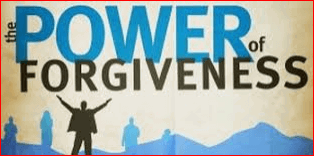
Recently, I looked at the subject of FORGIVENESS, & even though I thought I knew a lot about it, I discovered that there were very important aspects of it that I hadn’t seen before.
May I share them with you now ?
Before I begin, I'd like to acknowledge the work of Rabbi Steve Berkson, of Messianic Torah Observant Israel for his videos on this subject. You can access these videos at https://www.youtube.com/watch?v=lIyIlt1JXKo&t=87s
While I agree with many of Rabbi Steve's ideas, I do not agree with them all, & as usual, I strongly encourage the reader, who wishes to view his, or any other person's videos, to TEST what is being said, before, taking any information into their belief system.
As we live our lives, I believe that we experience three different relationships - with ourselves, with others, & with YHWH.
During our lives, sometimes we are offended. We get upset, & suffer hurt & pain, when someone else, “trespasses” against us. At that time, we were made to feel embarrassment, & ashamed, we felt rejected, & of less worth. The degree of that hurt & pain, varied from horrific to just being upset.
WHAT IS TRESPASSING ?
The “trespassing” that caused the offense, happened when someone infringed, overstepped, or crossed a boundary that we have, without permission. Sometimes the “trespassing” was deliberate, while at other times it was unintentional, & done in complete ignorance. In actual fact, the trespassing can be real, or perceived, but either way, unpleasant, negative emotions are experienced.
When we have been offended by someone trespassing against us, don’t we have two choices – don’t we always have choices ? We can choose to forgive the trespass, or we can choose not to forgive it.
WHAT IS FORGIVENESS ?
Forgiveness is something you do, when someone has trespassed against you.
It is a releasing of all resentments against the one who trespassed against you, & letting go of the desire to punish them for doing it.
It is excusing a person for a fault, or to overlook an offense.
Forgiveness is necessary for you to be “healed”, so that you can move forward.
When you forgive, you personally pardon the offense, & the offender, & you release them from further punishment or debt – this happens from your point of view. This does not involve them.
That doesn’t mean you are releasing them from YHWH’s decision to punish them.
The first thing we need to realise is that “forgiveness, or unforgiveness affects you”, not the offender. When you forgive, you release hurt, anger, & negative emotions. Your forgiveness doesn’t have anything to do with what the other person does.

Forgiveness starts with deciding to let go of the situation, releasing it, & then saying, “I forgive you” (within yourself, & not personally to the offender).
All “trespasses” must be forgiven, by everyone, always ! If you don’t “forgive”, it WILL hurt YOU.
When you deal with forgiveness, you stop the hurt & pain, & the negative emotions, that resulted from you being offended by someone trespassing against you – it will stop the offense from affecting your future.

Forgiveness is essential for your present, & future peace ! We must forgive, if we really want to be free !
Letting go of the negative emotion, that was stimulated by the trespass, through forgiveness, has the benefit that it no longer damages, infringes, or impedes your forward progress through life. It won’t affect your future relationships.
By the way, the “letting go” will involve some kind of grief – if it was a very serious trespass, the grieving will take longer, & you could need counselling.
So, when we forgive the person who has trespassed against us, we experience three on-going, extremely important benefits :
1: on-going peace,
2: the ability to have healthy, present & future relationships, and
3: freedom
Most people don’t realise it, but if you don’t deal with forgiveness, it will “leak” into your future life by “popping up” at the most inopportune moment, & it never goes away.
By the way, the “popping up” doesn’t have to be with the same person – it can happen with a person who demonstrates similar behaviours to the original person who trespassed against you. Because you didn’t deal with it by “forgiving”, the ugliness can “pop” back up, at any time.
The “popping up” problems include, ongoing negative emotions, lack of on-going peace, & freedom, explained & unexplained resentments, & destructive relationships – all of these lead to depression. When I am in a negative emotional state as a result of someone trespassing against me, I am unable to understand what true justice is.
When you objectively think about the benefits of “forgiving” a trespass, compared to the on-going problems associated with “unforgiveness”, isn’t it a “no-brainer” decision, as to what will be your choice ?
By the way, forgiving someone for their trespassing, does not mean that you “forget” what happened, so that you are now vulnerable to it happening again. It is very important that you have the “information” about what happened, without hanging on to the negative emotions. That way, if at any time in the future, something happens that looks “a little similar to the original situation”, it will alert you to be on your guard, so that you can recognise that it was a problem in the past.
Again, forgiveness is something we must all do, every time there has been a trespass, & remember, there is nothing anyone can do to you, that you can’t forgive !
WHAT CAN HAPPEN ONCE YOU HAVE FORGIVEN A TRESPASS !
Another point we need to realise is that, forgiveness doesn’t include reconciliation. Forgiveness however, is absolutely essential, IF, “we desire” any of the future possible steps of resolution, reconciliation, & restoration.
RESOLUTION
Often you may desire reconciliation, & restoration, but each situation will depend on you, & the other person working together towards a mutual agreed resolution. Resolution is a firm decision between you & the offender, to do or not do something, but it can only happen, AFTER forgiveness. Resolution settles the trespass.
Resolution involves a relationship change, because “I want the offender to stop trespassing against me, & acting in a more appropriate way”.
REPENTANCE
Repentance is part of the resolution process. When I repent, I ask for forgiveness – I say that I want to make it right – I say I wish had never done it, & that I would reverse it if I can !

Repentance is apologising by sincerely saying, “I did it, & I am sorry for doing it”. By sincerely apologising, you express genuine remorse, regret & ownership for doing what you did.
When repenting, you might say something like, “I really wish I hadn't done it, and if I could go back and undo it I would, but I can't – I will make every effort to fix the damage that I caused – I will never ever do it again.
When you add forgiveness, & resolution together, it provides a platform potentially for reconciliation & restoration. If a situation has been forgiven, & the necessary compensation & resolution is made, then & only then, can there be reconciliation and/or restoration.
Forgiveness, & resolution need to happen, but they begin with just ourselves.
Reconciliation
You may desire reconciliation, & restoration, but again, each will depend on you & the other person working together towards a mutual agreed resolution.
Forgiveness, reconciliation, & restoration are three separate steps.

Reconciliation is the situation in which two people restore, or recreate a previous relationship that was damaged by one person’s trespass – it is the end of any estrangement.
Again, reconciliation can only result after forgiveness & restoration have happened – it is a process.
Reconciliation is optional – it can be a new relationship, especially if the previous relationship was a bad one – it can result from a desired relationship for both. If the “offending” relationship was horrible, you may never, ever want to reconcile with the one who trespassed against you, & that is OK !
Resolution & reconciliation can only come through a repentance process ! This must start with again, owning what you did; genuinely regretting it – there must be emotional, from the heart regret – with tears type apology
Very few people who are approached in this way, can refuse such an apology.
If I trespass against you, & I wish to reconcile with you, you will want a repentance type process to happen. Again, you’ll want to know that I am sorry for what I did, that I plan never to do it again with all the effort I can muster - you're going to want to know that I wish I could undo it if I could - you're going to want to know all of that as far as being able to reconcile, but none of it is necessary for forgiveness.
A very important point is that each person must have the ability to communicate precisely what each one needs for the reconciliation to happen. If you want to be reconciled, you must figure out what you need to resolve the trespass.
Examples
What you did made me feel unsafe. Well, what do you need to make you feel safe ?
Well what you did made me feel insecure. Well what do you need so that you will feel secure ?
Reconciliation isn’t evidence of forgiveness – people have reconciled, but haven’t forgiven the other.
The steps of resolution, reconciliation & restoration are freely available, but none of them can happen until you do step 1, forgiveness.

By the way, again, a consequence of the trespass may be that there is no reconciliation !
Restoration is optional, AFTER forgiveness – it is the action of returning something to a former place or condition. If the previous relationship wasn’t good, then restoration isn’t what you are looking for.
Unless you want to experience all the disadvantages that unforgiveness brings, ALL trespasses must be forgiven, no matter what the other person does.
Forgiveness needs to be done by everyone, all the time. It doesn’t have any requirement beyond “you”.
One Last Thought
Have you or someone dear to you, ever suffered from mental illness and/or depression ? Could it be that one factor that significantly contributes to that mental illness and/or depression is “unforgiveness” ? I strongly believe it is !
Could you be a Flesh & Blood Israelite ?
Elsewhere on this website, there is a study called, "The Journey", where I provided details of where you might be in your "spiritual" walk.
In this study, which was originally put together by Rabbi Rob Miller, I want to attempt to explain details about "who you really are", in other words, your "IDENTITY".
Before we get started with it, there are a few things I think we need to go over to make your learning experience the most enlightening it can be.
By now I am sure that you will have noticed that again, in place of the word “GOD” or “LORD”, I have used the personal proper name of our Heavenly Father – Yahweh , יהוה (read from right to left). Known as the Tetragrammaton, meaning “four letters,” His Name is represented by our English YHWH, which I frequently use. Transliterating the Creator’s Name into English, I believe that you would pronounce it properly as YahOOOeh, or “Yahweh.” It was the only name used prior to 800 BCE.
The Name “Yahweh” has been known for over 5700 years, & is written 6,823 times in the so-called Old Testament alone.
Again, in the place of the word “God”, I use the proper Hebrew word “Elohim,” plural form of the word Eloah, understood to denote the single deity of Israel. We know this because singular verbs and adjectives are used in the Hebrew text when the particular meaning of the deity of Israel (a singular) is intended.
In Exod 3:15, we have :
“Elohim also said to Moses, ‘Say to the Israelites, “Yahweh, the Elohim of your fathers—the Elohim of Abraham, the Elohim of Isaac and the Elohim of Jacob—has sent me to you.” This is my name forever, the name by which I am to be remembered from generation to generation.’”
Likewise, speaking about Yahweh’s only begotten son, I use the Hebrew name ישׁועת “Yahushua”, instead of the name “Jesus.” The Name Yahushua means, “Yahweh is salvation.” When translating the Messiah’s name into English, instead of Jesus, it should have been Joshua.
Matt 1:21 should read :
“She will give birth to a son, and you are to give him the name Yahushua, because he will save his people from their sins.”
This practice will assist in liberating you from deep-seated bias, as well as allowing you to view the Sacred Scriptures as a Hebrew book, not a Western book.
In this study, I will be providing many original slides that Rabbi Miller prepared for his presentation, "Mistaken Identity", together with comments & questions that I will add. May I please ask you, the reader, to carefully read the important details provided in those slides.

Q: I wonder how many of you can identify a life point in time when your life changed?
A: This message changed my life! When I found out who I was, it totally changed everything for me!
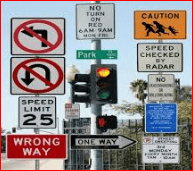
Do you feel like this ?
Or perhaps you feel like this ?
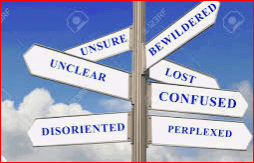

I know many people are unaware of it, but we are really in a CRISIS!

Doesn't the fact that this book is such a best seller, that at least 38 million people :
~ have no idea what their purpose in life is ?
~ who they are ?
~ where they are going ?
Q: Would you agree that it is very important to :
1: know who you are . . . THEN,
2: Learn what your mission is . . . THEN,
You'll be able to read the signs !
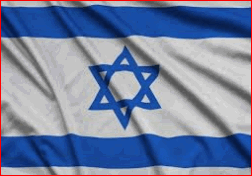
WHO do you say ISRAEL is Today ?
- The JEWS
- A Trouble Maker in the Middle East
- Jacob of the Tanach (OT)
- The Church
- The Christians
Common Beliefs :
1: The JEWS are the CHOSEN PEOPLE of the Scriptures
2: The Torah (law) was given to the JEWS
3: The feasts in the Tanach (OT) that Messiah Yahushua, & His DISCIPLES kept, were JEWISH feasts
Do you know that BEHIND every myth is the TRUTH waiting to be told ?
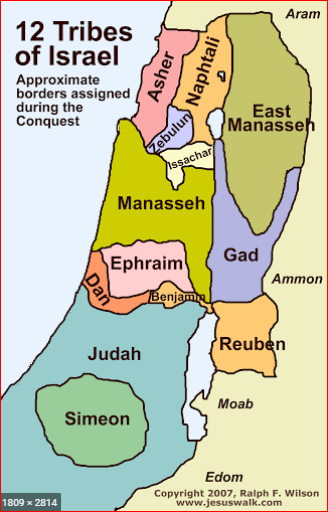
Q: How many Tribes were at Mount Sinai to receive the Torah (law)?
A: ALL 12 tribes, & the mixed multitudes
Q: How many Tribes were JEWISH ?
A: One Tribe - Judah
The Twelve Tribes of ISRAEL
Manasseh Asher
Naphtali Zebulun
Issachar Gad
Ephraim Dan
Benjamin Reubin
Simeon Judah
Don't we know where JUDAH (the JEWS) is now ?
WHERE are all the other Tribes ?
Recently, the world has been caught up in a story of a mystical bloodline, & how this affects world history & religion.
The assertions of these authors are erroneous at the least, & heretical at its worst.

There is however, a sacred bloodline that is flowing through the veins of most people today - the ABRAHAMIC Bloodline.
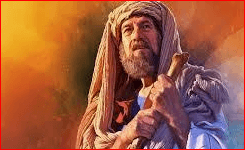
This I believe, is the greatest "cover-up" in human history !
The following blessings are promised to Abram, (later Abraham), by YHWH - it is later called the ABRAHAMIC Covenant.
Gen 12:2 And I will make of thee a great nation, and I will bless thee, and make thy name great; and thou shalt be a blessing:
Gen 12:3 And I will bless them that bless thee, and curse him that curseth thee: and in thee shall all families of the earth be blessed.
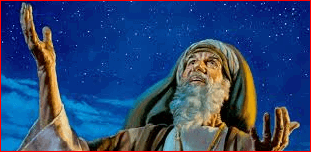
To actualise the Abrahamic Covenant in Abram's mind, YHWH creates a ceremony recorded in Gen 15 to indicate this promise covenant.
YHWH commanded Abram to divide animals into two pieces. Then YHWH causes a smoking furnace & a burning lamp, to pass between the pieces, binding the covenant.
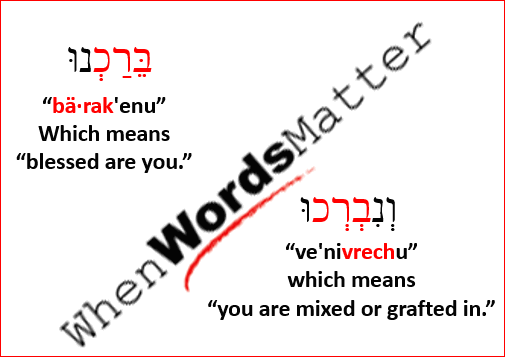
If we apply this information to Gen 12:2-3, it would read as follows :
Gen 12:2 And I (YHWH) will make of thee (Abram) a great nation, and I will bless thee, and make thy name great; and thou shalt be a blessing:
Gen 12:3 And I will bless them that bless thee, and curse him that curseth thee: and in thee shall all families of the earth be mixed or grafted in.
Gen 28:14 will also read as follows :
Gen 28:14 And thy seed shall be as the dust of the earth, and thou shalt spread abroad to the west, and to the east, and to the north, and to the south: and in thee and in thy seed shall all the families of the earth be mixed or grafted in.
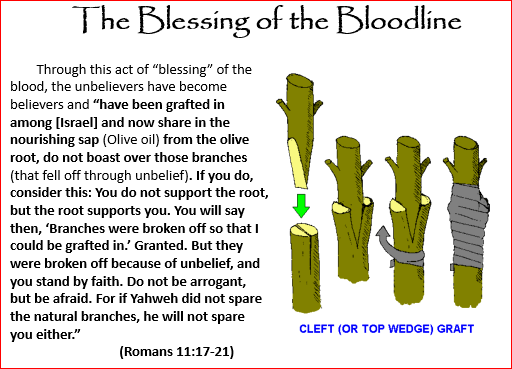
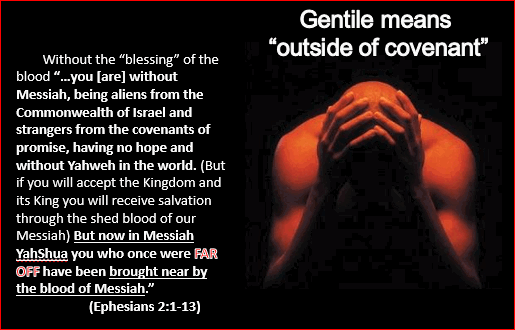
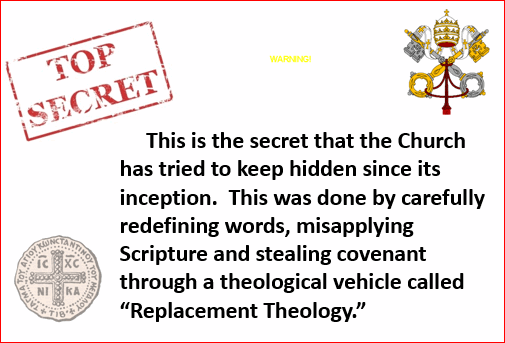
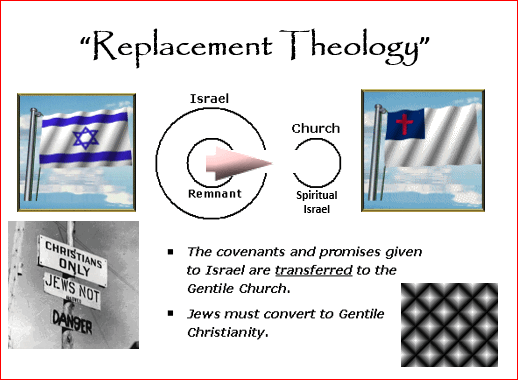
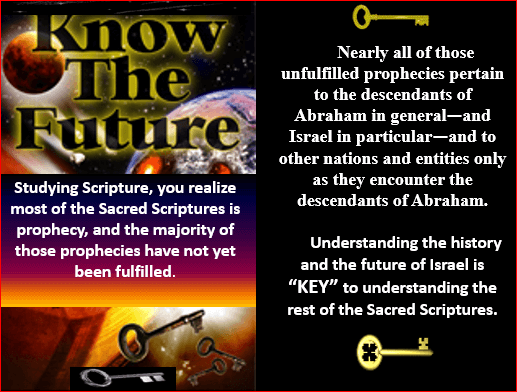
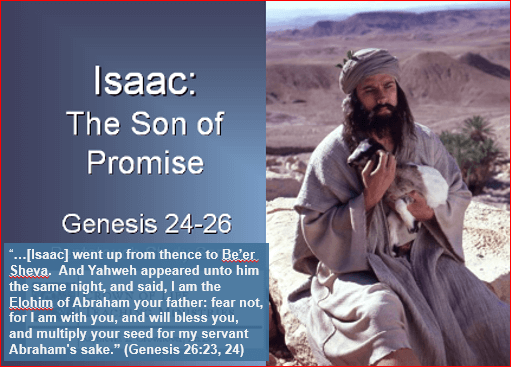
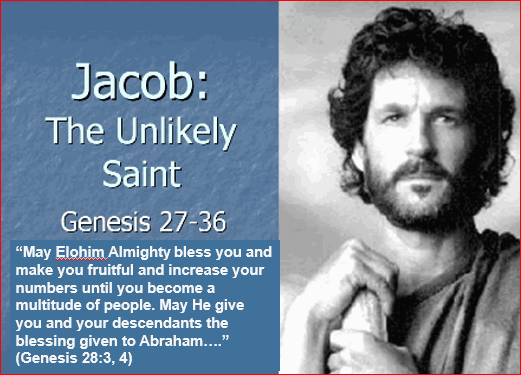
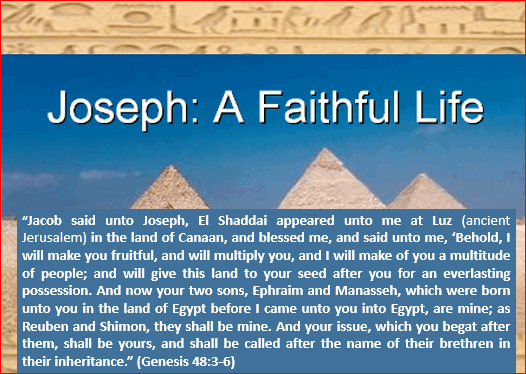
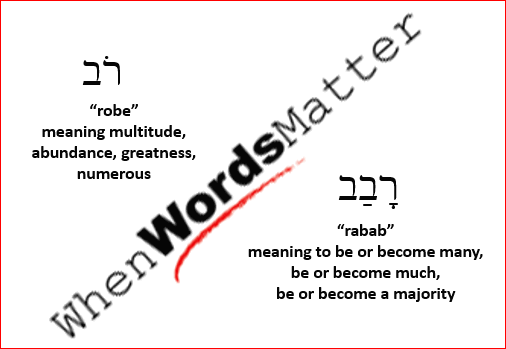

S T A R S

So by the END of DAYS, the majority of the people on Earth will be
ABRAHAM's SEED !
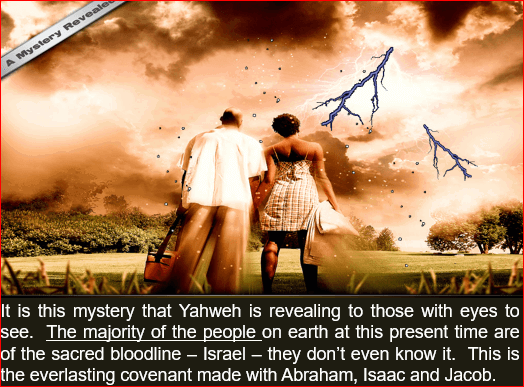
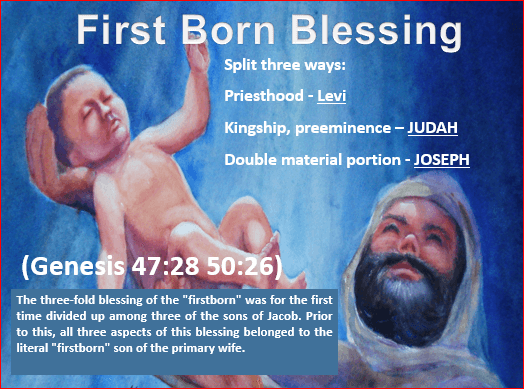
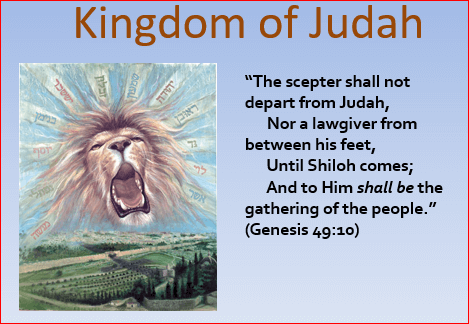
Rom 3:1-2 “What advantage, then, is there in being a Jew, or what value is there in circumcision? Much in every way!
Primarily, the Jews have been entrusted with the very words of Yahweh (Torah).
Rom 3:3-4 What if some (of Israel) were unfaithful? Will their unfaithfulness nullify the Faith of Yahweh? Not at all! Let Yahweh be true, and every human being a liar.”
Joh 4:19 The woman (acting like a Gentile) saith unto him, Sir, I perceive that thou art a prophet.
Joh 4:20 Our fathers (10 Northern tribes) worshipped in this mountain (Mount of Blessing) ; and ye say, that in Jerusalem is the place where men ought to worship (at the Temple)..
Joh 4:21 Yahushua saith unto her, Woman, believe me, the hour cometh, when ye shall neither in this mountain, nor yet at Jerusalem, worship the Father.
Joh 4:22 Ye worship ye know not what: we know what we worship: for salvation is of the Jews.
Joh 4:23 But the hour cometh, and now is, when the true worshippers shall worship the Father in spirit and in Truth: for the Father seeketh such to worship him.
Joh 4:24 God is a Spirit: and they that worship him must worship him in spirit and in Truth.
Have you ever examined the following several scriptural verses that tell us about YHWH's TRUTH ? I encourage you to ponder them very carefully.
Joh 14:6 Yahushua saith unto him, I am the way, the truth, and the life: no man cometh unto the Father, but by me.
Psa 119:142 (YHWH) Thy righteousness is an everlasting righteousness, and thy Torah (law) is the truth.
Psa 119:160 (YHWH) Thy word is true from the beginning: and every one of thy righteous judgments endureth for ever.
Joh 17:17 Sanctify them through thy truth: (YHWH) thy word is truth.
Psa 33:4 For the word of YHWH is right; and all his works are done in truth.
Psa 119:151 Thou art near, YHWH; and all thy (YHWH) commandments are truth.
Jacob Blesses Joseph : Ephraim & Manasseh
Gen 48:19 And his father refused, and said, I know it, my son, I know it: he also shall become a people, and he also shall be great: but truly his younger brother (Ephraim) shall be greater than he (Manasseh), and his seed shall become a multitude of nations.
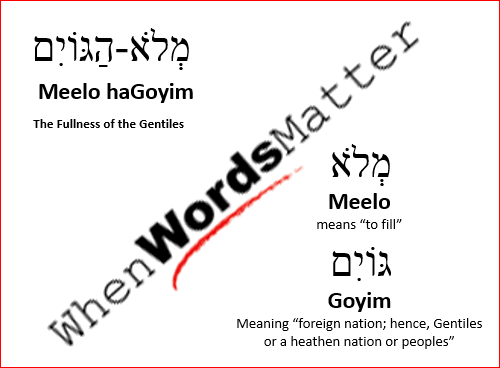
Q: Did you notice the sequence of blessings ?
A: It went from Abraham to Isaac to Jacob to Ephraim
Ephraim, who carried the double portion blessing of the HOUSE of ISRAEL, was to be a MULTITUDE of NATIONS - a bunch of out-of-covenant people !
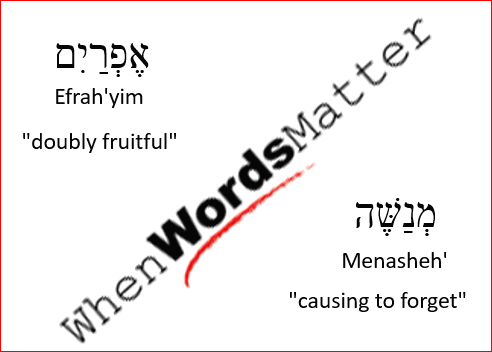
In Gen 47, we are told that Jacob's family moved from Canaan (the Promised Land), & settled in Egypt.
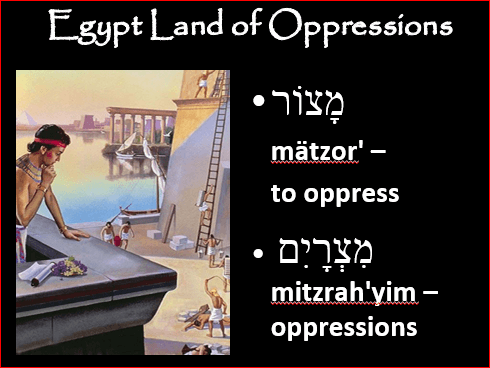
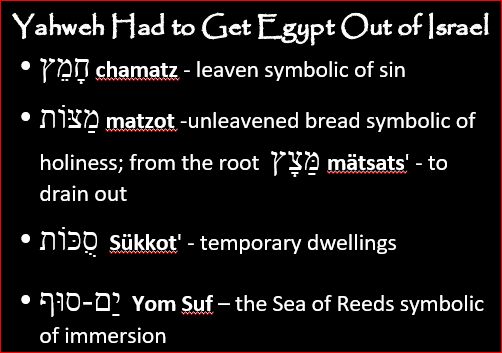
In 1 Cor 10:1-4, Paul adds his perspective :
1Co 10:1 Moreover, brethren, I would not that ye should be ignorant, how that all our fathers were under the cloud, and all passed through the sea;
1Co 10:2 And were all baptized unto Moses in the cloud and in the sea;
1Co 10:3 And did all eat the same spiritual meat;
1Co 10:4 And did all drink the same spiritual drink: for they drank of that spiritual Rock that followed them: and that Rock was Messiah.
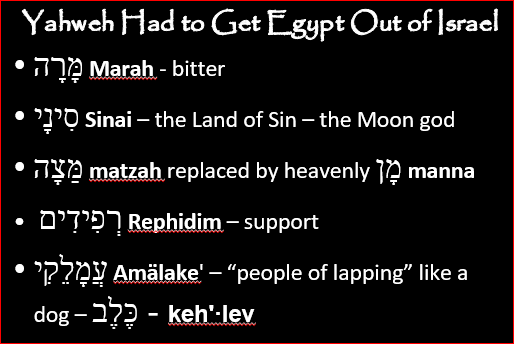
YHWH took Jacob's family from Canaan (the Promised Land) to Egypt, & then back to the Promised Land.
Isn't it true that, since we were children many of us have been taught that the Old Testament was OLD, and the New Testament was NEW!
It plants in our minds that the so-called Old Testament doesn’t have any value!
Are you aware that about 78% of the so-called Old Testament hasn’t even happened yet - so how can it be OLD?
I believe that there are over 500 verses of the so-called New Testament, that quoted from the so-called Old Testament - so how can it be NEW?
All the stories, whether it be Adam & Chavah (Eve) leaving the Garden, or Israel leaving the Promise Land, are always about, GOOD versus EVIL. It’s the same STORY – RESTORATION!!!!!
If you put on your "Prophesy" hat, then :
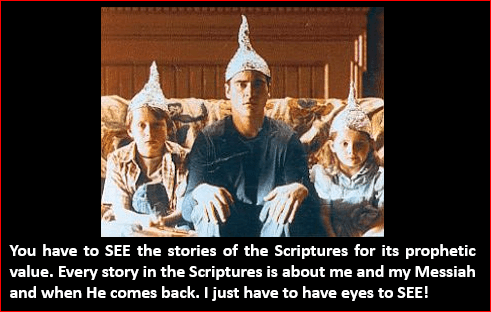
So, what do you think might be the Most AMAZING Prophesy ?
Let me explain.
Standing at the Jordan River, YHWH says through Moses to Israel in Deut 28:15 & 64 :
“…if you do not obey Yahweh your Elohim and do not carefully follow all His commands and decrees I am giving you today, all these curses will come on you and overtake you…Then Yahweh will scatter you among all nations, from one end of the earth to the other. There you will worship other gods—gods of wood and stone, which neither you nor your ancestors have known.”
Did you get it ?
If we do not obey YHWH, & carefully follow ALL His commands & decrees, THEN, He will scatter us among the nations !
In Deut 29:1, 14-15, & 30:1-3, YHWH made this COVENANT - please read it carefully.
“These are the terms of the covenant Yahweh commanded Moses to make with the Israelites in Moab, in addition to the covenant He had made with them at Horeb… I am making this covenant, with its oath, not only with you who are standing here with us today in the presence of Yahweh our Elohim but also with those who are not here today… When all these blessings and curses I have set before you come on you and you take them to heart wherever Yahweh your Elohim disperses you among the nations, and when you and your children return to Yahweh your Elohim and obey Him with all your heart and with all your soul according to everything I command you today, then Yahweh your Elohim will restore your inheritance and have compassion on you and gather you again from all the nations where He scattered you.”
Did you see it - YHWH promised with an oath, that He will "gather" Israel from all the nations where He scattered them !
Let's go through some history.
In the book of Judges, we have a time when "Judges" oversaw Israel.
In Jud 17:6, we are told :
“In those days there was no king in Israel, but every man did that which was right in his own eyes.”
Then, we have the time of the Kings - Saul, David & Solomon.
1 Sam 8:4-5 reads :
“So all the elders of Israel gathered together and came to Samuel at Ramah. They said to him, ‘You are old, and your sons do not follow your ways; now appoint a king to lead us, such as all the other nations have.’
Saul, David & Solomon governed the 12 Tribes of Israel UNTIL ....
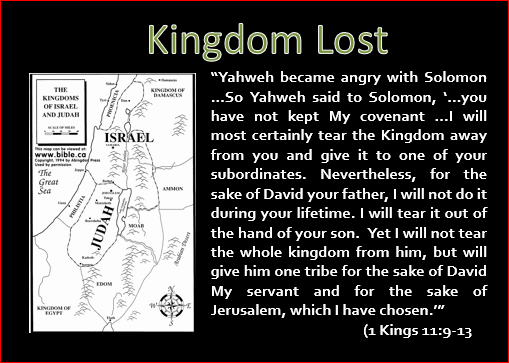
1 Kings 11:34-39 provides more details
“I will not take the whole kingdom out of Solomon’s hand; I have made him ruler all the days of his life for the sake of David my servant, whom I chose and who obeyed my commands and decrees. I will take the kingdom from his son’s hands and give you ten tribes. I will give one tribe (Judah) to his son (Rehoboam) so that David my servant may always have a lamp before me in Jerusalem, the city where I chose to put my Name. However, as for you, I will take you, and you will rule over all that your heart desires; you will be king over Israel. If you do whatever I command you and walk in obedience to me and do what is right in my eyes by obeying my decrees and commands, as David my servant did, I will be with you. I will build you a dynasty as enduring as the one I built for David and will give Israel to you. I will humble David’s descendants because of this, but not forever.’”
Why did YHWH say this ?
1Ki 11:33 Because that they have forsaken me, and have worshipped Ashtoreth the goddess of the Zidonians, Chemosh the god of the Moabites, and Milcom the god of the children of Ammon, and have not walked in my ways, to do (that which) is right in mine eyes, and to (keep) my statutes and my judgments, as (did) David his father.
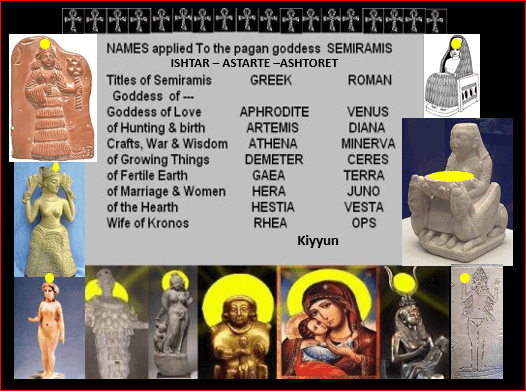
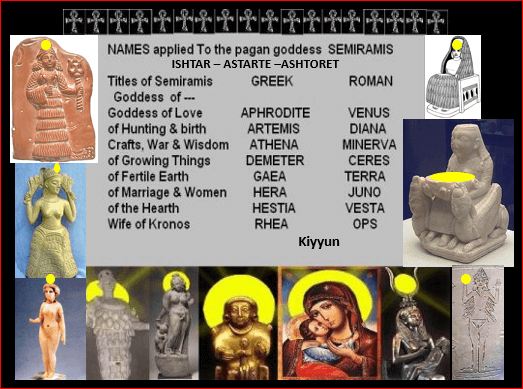
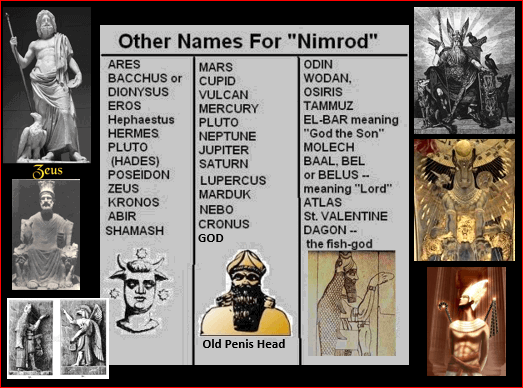
The Ultimate SIN
Exod 20:3, 5 “You shall have no other gods before Me… for I Yahweh your Elohim, am a jealous Elohim…”
The Kingdom of ISRAEL
1Ki 12:16 So when all Israel saw that the king hearkened not unto them, the people answered the king, saying, What portion have we in David? neither have we inheritance in the son of Jesse: to your tents, O Israel: now see to thine own house, David. So Israel departed unto their tents.
Then the UNION is DISSOLVED !
What was the Sin of JEROBOAM ?
2 Kings 17:21 tells us that "Jeroboam enticed Israel away from following Yahweh and caused them to commit a great sin”, while 2 Chron 11:15 says, “…he appointed for himself priests for the high places, for the demons, and the calf idols which he had made.”
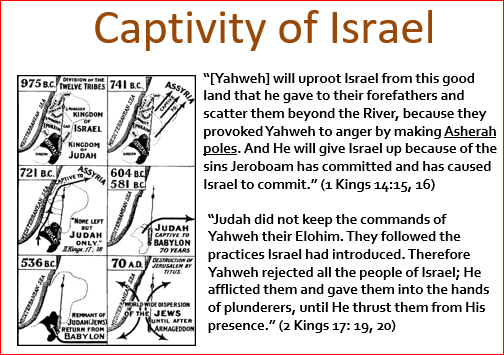
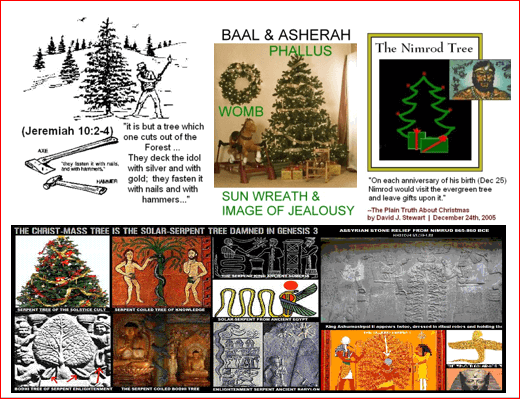
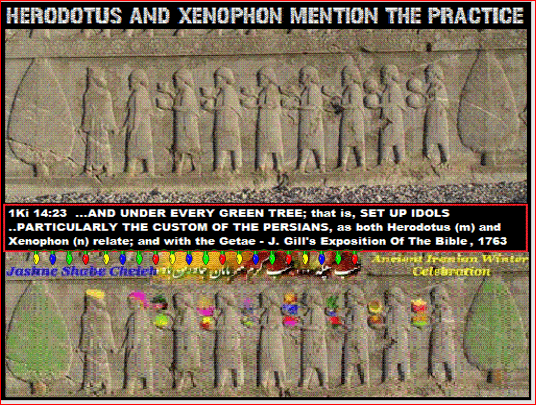
Do we know WHO many of the Gentiles are ??
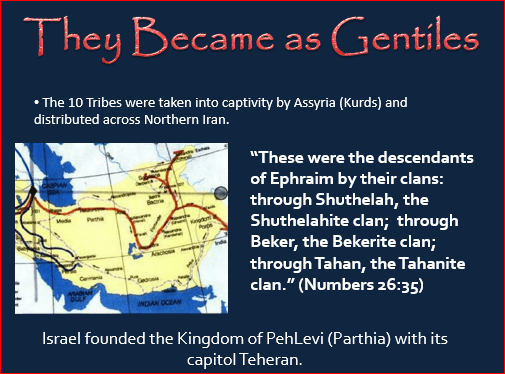
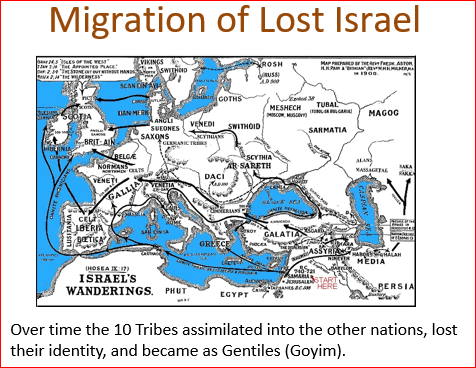
Again in Deut 29:1, 14-15, & 30:1-3, YHWH made this COVENANT - please read it carefully.
“These are the terms of the covenant Yahweh commanded Moses to make with the Israelites in Moab, in addition to the covenant He had made with them at Horeb… I am making this covenant, with its oath, not only with you who are standing here with us today in the presence of Yahweh our Elohim but also with those who are not here today… When all these blessings and curses I have set before you come on you and you take them to heart wherever Yahweh your Elohim disperses you among the nations, and when you and your children return to Yahweh your Elohim and obey Him with all your heart and with all your soul according to everything I command you today, then Yahweh your Elohim will restore your inheritance and have compassion on you and gather you again from all the nations where He scattered you.”
YHWH promised with an oath, that He will "gather" Israel from all the nations where He scattered them, when the children of Israel return to YHWH !
In Jer 31:31 to 34, we have the "new", or "renewed" covenant, that was promised AFTER the northern & southern kingdoms, rebelled against the Mt Sinai covenant, & the Moab covenant.
Jer 31:31 Behold, the days come, saith YHWH, that I will make a new covenant with the house of Israel, and with the house of Judah:
Jer 31:32 Not according to the covenant that I made with their fathers in the day that I took them by the hand to bring them out of the land of Egypt; which my covenant they brake, although I was an husband unto them, saith YHWH:
Jer 31:33 But this shall be the covenant that I will make with the house of Israel; After those days, saith YHWH, I will put my law in their inward parts, and write it in their hearts; and will be their Elohim, and they shall be my people.
Jer 31:34 And they shall teach no more every man his neighbour, and every man his brother, saying, Know YHWH: for they shall all know me, from the least of them unto the greatest of them, saith YHWH: for I will forgive their iniquity, and I will remember their sin no more.
Note what Ezek 37:15-23 tell us :
Eze 37:15 The word of YHWH came again unto me, saying,
Eze 37:16 Moreover, thou son of man, take thee one stick, and write upon it, For Judah, and for the children of Israel his companions: then take another stick, and write upon it, For Joseph, the stick of Ephraim, and for all the house of Israel his companions:
Eze 37:17 And join them one to another into one stick; and they shall become one in thine hand.
Eze 37:18 And when the children of thy people shall speak unto thee, saying, Wilt thou not shew us what thou meanest by these?
Eze 37:19 Say unto them, Thus saith YHWH your Elohim; Behold, I will take the stick of Joseph, which is in the hand of Ephraim, and the tribes of Israel his fellows, and will put them with him, even with the stick of Judah, and make them one stick, and they shall be one in mine hand.
Eze 37:20 And the sticks whereon thou writest shall be in thine hand before their eyes.
Eze 37:21 And say unto them, Thus saith YHWH your Elohim; Behold, I will take the children of Israel from among the heathen, whither they be gone, and will gather them on every side, and bring them into their own land:
Eze 37:22 And I will make them one nation in the land upon the mountains of Israel; and one king shall be king to them all: and they shall be no more two nations, neither shall they be divided into two kingdoms any more at all:
Eze 37:23 Neither shall they defile themselves any more with their idols, nor with their detestable things, nor with any of their transgressions: but I will save them out of all their dwelling places, wherein they have sinned, and will cleanse them: so shall they be my people, and I will be their Elohim.
We are told in Eph 2:14-18 :
“For [Messiah] Himself is our peace, who has made the two groups one and has destroyed the barrier, the dividing wall, by removing in his flesh the hostility for the Torah, with its commands and regulations. His purpose was to create in himself one new humanity (the Commonwealth of Israel – the Kingdom of Yahweh) out of the two (Israel & Judah) , thus making peace, and in one body to reconcile both of them to Yahweh through the gallows, by which He put to death their hostility. He came and preached peace to you who were far away (Diaspora) and peace to those who were near (in Judea). For through Him we both have access to the Father by one Spirit.”
Luke 19:9-10 tell us :
“Yahushua said to him, ‘Today salvation has come to this house, because this man, too, is a son of Abraham. For the Son of Man came to seek and to save what was lost.’
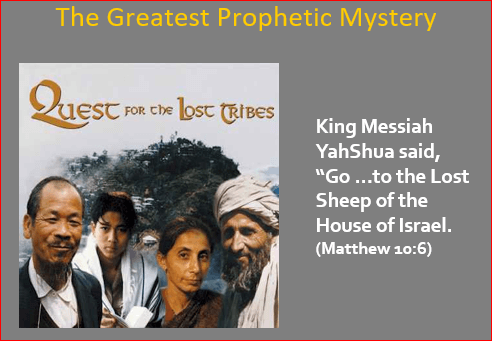
The Ministry of the Apostles
Mat 10:5 These twelve Jesus sent forth, and commanded them, saying, Go not into the way of the Gentiles, and into any city of the Samaritans enter ye not:
Mat 10:6 But go rather to the lost sheep of the house of Israel.
Mat 10:7 And as ye go, preach, saying, The kingdom of heaven is at hand.
WHO are the SHEEP ?
John 10:3-4, 7 “The one who enters by the gate is the shepherd of the sheep. The watchman opens the gate for him, and the sheep listen to his voice. He calls his own sheep by name and leads them out. When he has brought out all his own, he goes on ahead of them, and his sheep follow him because they know his voice… Therefore Yahushua said again, “I tell you the truth, I am the gate for the sheep.”
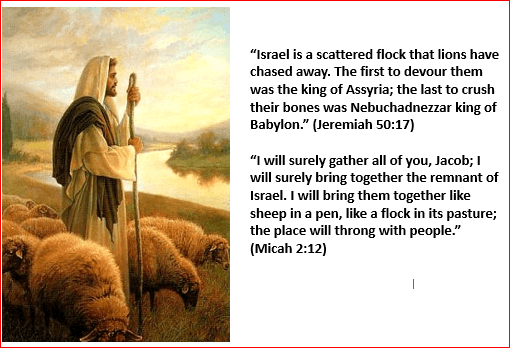
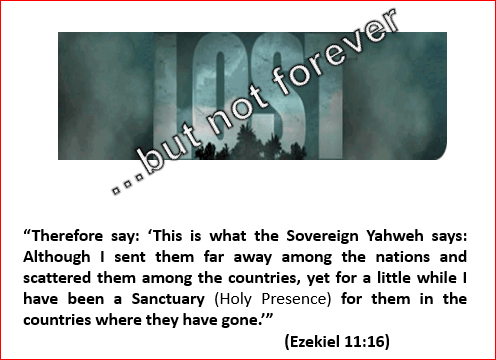
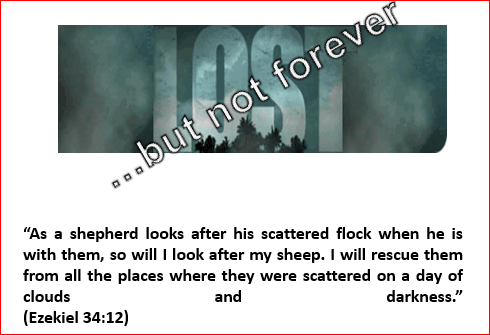
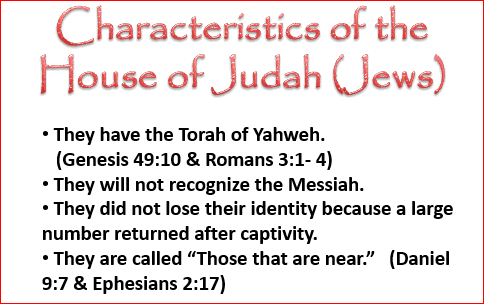
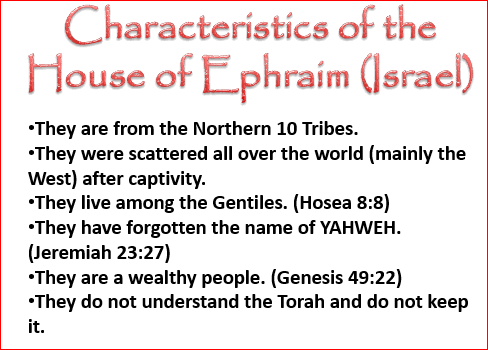
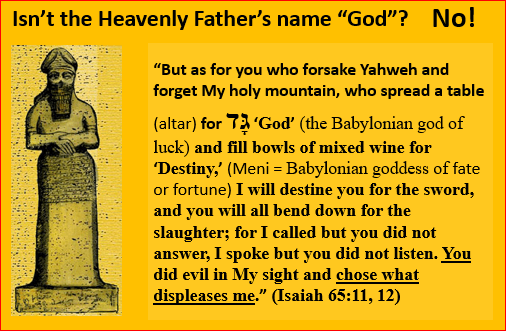
Did you get that - "god is not YHWH's name !
Hos 8:10, 12 records :
“Although they have hired themselves among the nations, I will now gather them together. They will begin to waste away under the oppression of the mighty ruler…I wrote for them the many things of My Torah, but they regarded them as something foreign.”
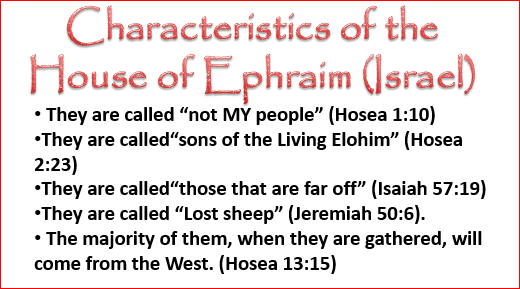
Ministry of Ya'akov (James the Just)
James 1:1 tells us ;
“Ya’akov (James, brother of Yahushua), a servant of Yahweh and of King Messiah Yahushua, to the twelve tribes scattered among the nations: Shalom.”
Again, did you get who James was writing to ?
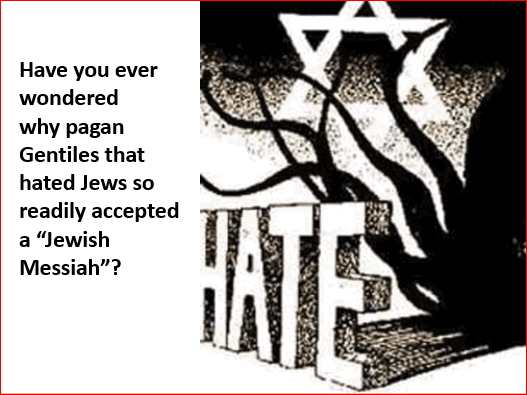
A: They weren't pagan Gentiles !
They were Israelite Gentiles !
Have you ever noticed what Amos 9:9 says ?
“For I will give the command, and I will sift the people of Israel among all the Gentiles as grain is sifted in a sieve, and not a kernal will reach the ground.” (Amos 9:9)
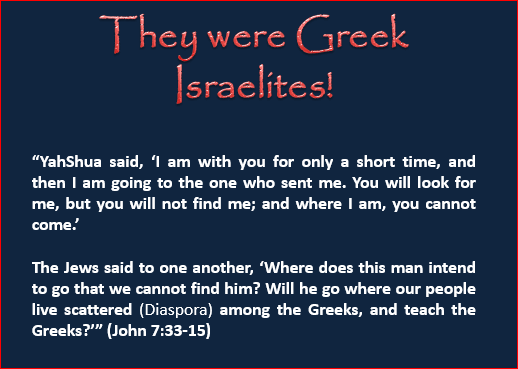
Rom 12:14-15 reads :
“(Indeed, when Gentiles, who do not have the Torah, do by nature things required by the Torah, they are a law for themselves, even though they do not have the Torah. They show that the requirements of the Torah are written on their hearts, their consciences also bearing witness, and their thoughts sometimes accusing them and at other times even defending them.)”
Ministry of Peter
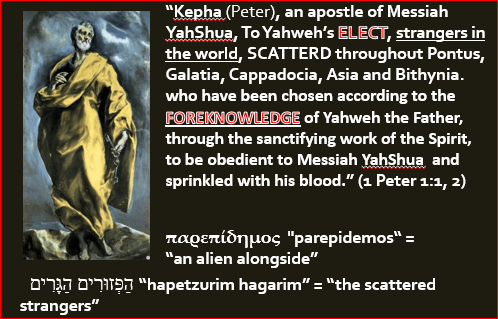
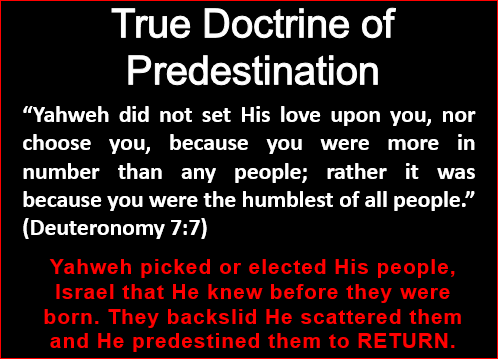
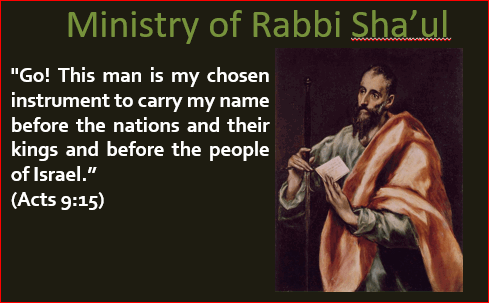
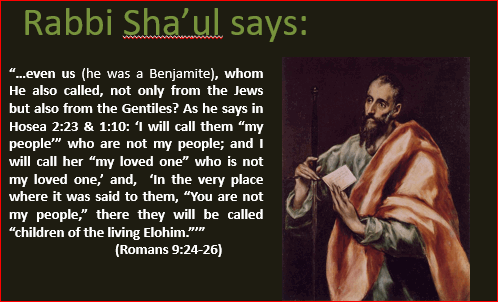
Hos 1:6-7, 10-11 tells us :
“I will no longer show love to Israel, that I should at all forgive them. Yet I will show love to Judah; and I will save them—not by bow, sword or battle, or by horses and horsemen, but I, Yahweh their Elohim, will save them…
Yet the Israelites (the northern tribes) will be like the sand on the seashore, which cannot be measured or counted. In the place where it was said to them, ‘You are not my people,’ they will be called ‘children of the living Elohim.’ The people of Judah and the people of Israel will come together; they will appoint one leader (Messiah) and will come up out of the land, for great will be the day of Yiz·reh·āl' (El sows).”
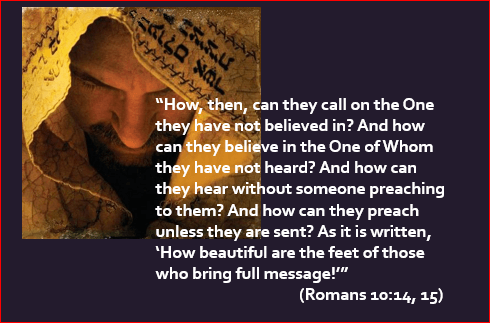
Q: What is the "full message" ?
Again, Jer 31:31-34 tells us about the "New Covenant"
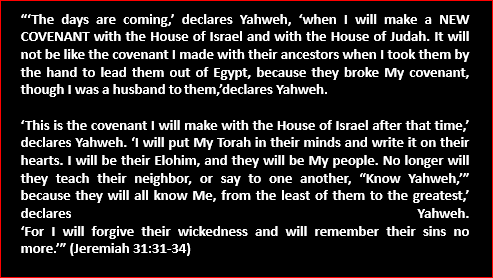
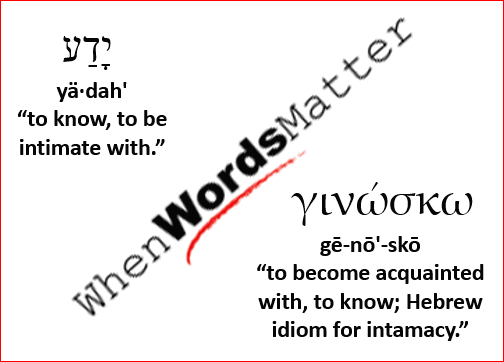
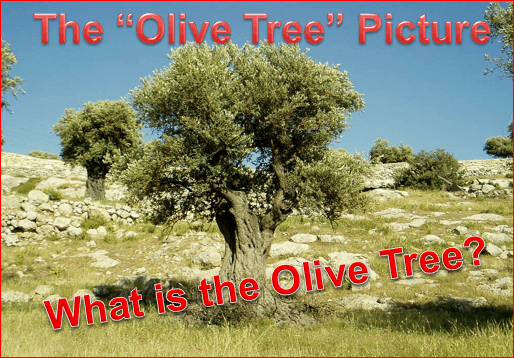
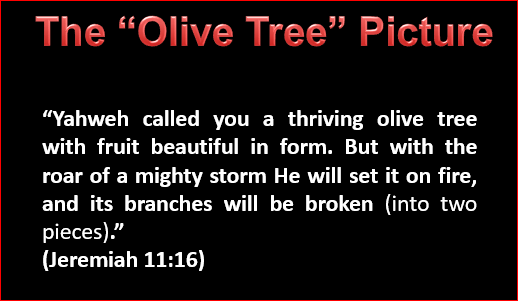
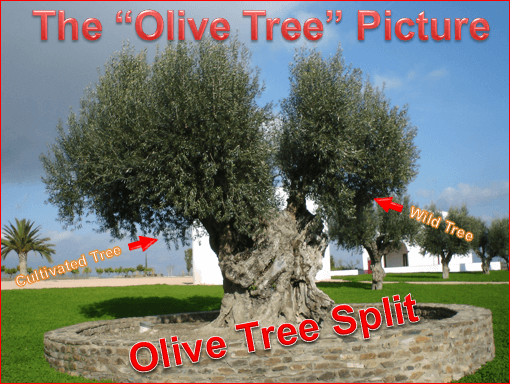
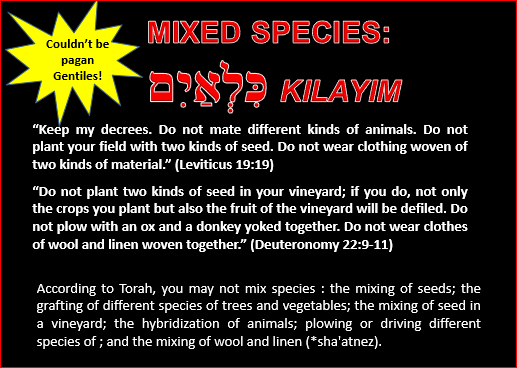
Romans 11:24 tells us :
“After all, if you were cut out of an olive tree that is wild by nature, and contrary to nature were grafted into a cultivated olive tree, how much more readily will these, the natural branches, be grafted into their own olive tree!”
From Ezek 37:17, we are reminded
“Join them together into one stick so that they will become one in your hand.”
Eph 2:15 tells us that :
“[Messiah's] purpose was to create in Himself one new humanity out of the two, thus making peace.”
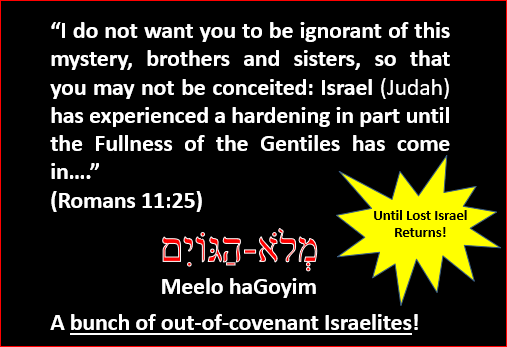
Rom 11:26-27 quotes Is 59:20 :
“…and in this way all Israel will be saved. As it is written: ‘The Deliverer (Savior) will come from Zion (Jerusalem); He will turn godlessness away from Jacob (Israel).’ For this is my covenant unto them, when I shall take away their sins. (Isaiah 59:20)”
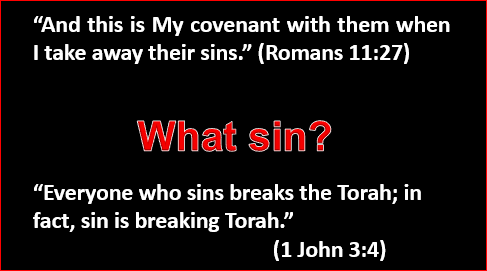
Yahushua's words of Matt 5:17-20 are devastatingly clear :
Mat 5:17 Think not that I am come to destroy the law, or the prophets: I am not come to destroy, but to fulfil (rightly interpret).
Mat 5:18 For verily I say unto you, Till heaven and earth pass, one jot (smallest letter in the AlephBet) or one tittle (accent marks above the letters) shall in no wise pass from the law, till all be fulfilled.
Mat 5:19 Whosoever therefore shall break one of these least commandments, and shall teach men so, he shall be called the least in the kingdom of heaven: but whosoever shall do and teach them, the same shall be called great in the kingdom of heaven.
Mat 5:20 For I say unto you, That except your righteousness shall exceed the righteousness of the scribes and Pharisees, ye shall in no case enter into the kingdom of heaven.
SHALOM to you who were far off
Eph 2:11 Wherefore remember, that ye being in time past Gentiles in the flesh, who are called Uncircumcision by that which is called the Circumcision in the flesh made by hands;
Eph 2:12 That at that time ye were without Messiah, being aliens from the commonwealth of Israel, and strangers from the covenants of promise, having no hope, and without YHWH in the world:
Eph 2:13 But now in Messiah Yahushua ye who sometimes were far off are made nigh by the blood of Messiah.
John 10:16, Yahushua mentions other sheep
“I have other sheep that are not of this sheep pen. I must bring them also. They too will listen to my voice, and there shall be one flock and one shepherd.”
Eph 2:14-18 tells us that Messiah Yahushua came to preach peace to those lost Israelites, who were far away.
“For [Messiah] Himself is our peace (Shalom – perfect wholeness), who has made the two groups one and has destroyed the barrier, the dividing wall, by setting aside in His flesh the hostility for the Torah, with its commands and regulations. His purpose was to create in Himself one new humanity out of the two, thus making peace, and in one body to reconcile both of them to Yahweh through the gallows, by which He put to death their hostility. He came and preached peace to you who were far away (lost Israel) and peace to those who were near (Judah). For through him we both have access to the Father by one Spirit.”
Is 57:18-19 is also a reference to the lost Israelites who are far away.
“‘I have seen their ways, but I will heal them; I will guide them and restore comfort to Israel’s mourners, creating praise on their lips. Peace, peace, to those far and near,’ says Yahweh. ‘And I will heal them.’”
One NEW Man
Ezek 37:15-23 describes how YHWH will bring the two houses of Israel back to be one united house.
“The word of Yahweh came to me: ‘Son of man, take a stick of wood and write on it, “BELONGING TO JUDAH AND THE ISRASELITES ASSOCIATED WITH HIM.” Then take another stick of wood, and write on it, “BELONGING TO JOSEPH (that is, to Ephraim) AND ALL THE ISRASELITES ASSOCIATED WITH HIM.” Join them together into one stick so that they will become one in your hand. When your people ask you, “Won’t you tell us what you mean by this?” say to them, “This is what the Sovereign Yahweh says: ‘I am going to take the stick of Joseph—which is in Ephraim’s hand—and of the Israelite tribes associated with him, and join it to Judah’s stick. I will make them into a single stick of wood, and they will become one in my hand. Hold before their eyes the sticks you have written on and say to them, “This is what the Sovereign Yahweh says: ‘I will take the Israelites out of the nations where they have gone. I will gather them from all around and bring them back into their own land. I will make them one nation in the land, on the mountains of Israel. There will be one king over all of them and they will never again be two nations or be divided into two kingdoms. They will no longer defile themselves with their idols and vile images or with any of their offenses, for I will save them from all their sinful backsliding, and I will cleanse them. They will be my people, and I will be their Elohim.”
Messiah Died to Restore Israel
In John 11:49-52, Caiaphas prophesied that Messiah Yahushua died to restore the two houses of Israel.
“Then one of them, named Caiaphas, who was high priest that year, spoke up, ‘You know nothing at all! You do not realize that it is better for you that one man die for the people than that the whole nation perish.’ He did not say this on his own, but as high priest that year he prophesied that Yahushua would die for the Jewish nation, and not only for that nation but also for the scattered children of Yahweh, to bring them together and make them one.”
MESSIAH YAHUSHUA said :
Matt 15:24 “I was sent only to the lost sheep of Israel.”

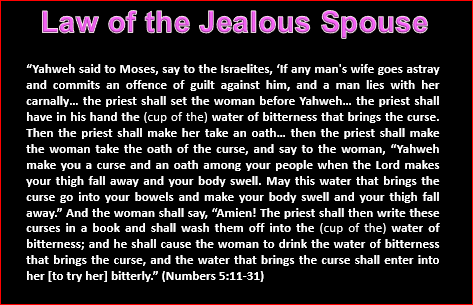
LEGAL SEPARATION
Jer 3:8 explains :
“I gave faithless Israel (northern tribes) her certificate of divorce and sent her away because of all her adulteries. Yet I saw that her unfaithful sister Judah (Jews) had no fear; she also went out and committed adultery.”
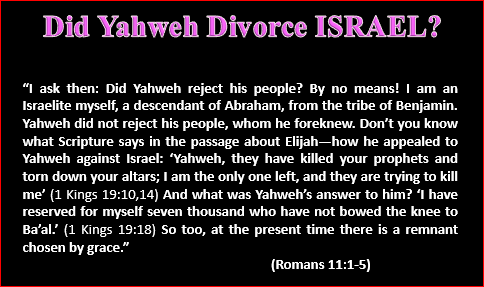
YHWH HATES DIVORCE !
Mal 2:16 tells us :
“‘I hate divorce,’ says Yahweh, the Elohim of Israel, ‘because the man who divorces his wife does violence to the one he should protect, so be on your guard, and do not be unfaithful.’
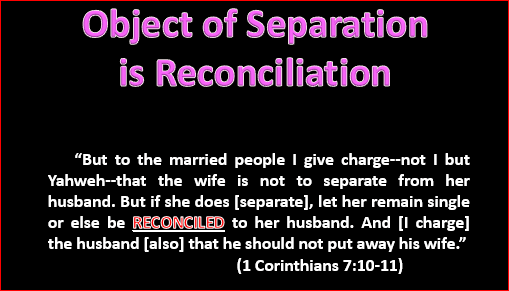
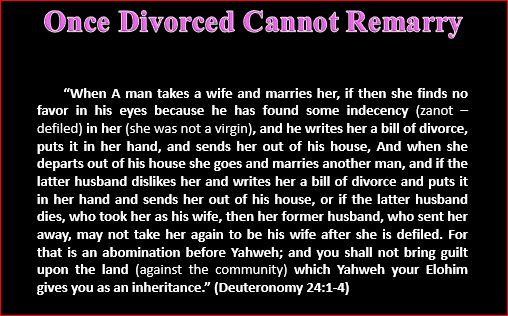
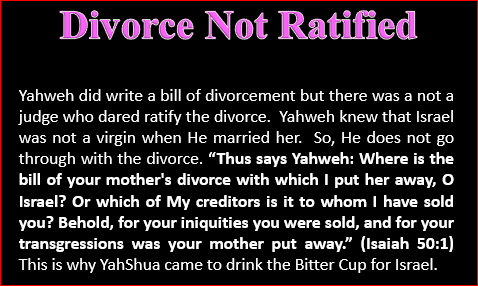
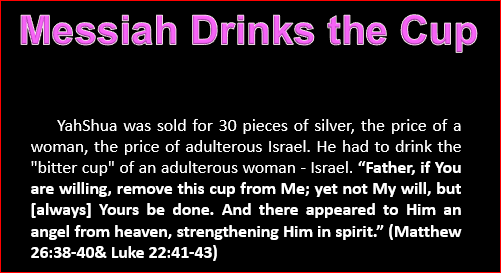
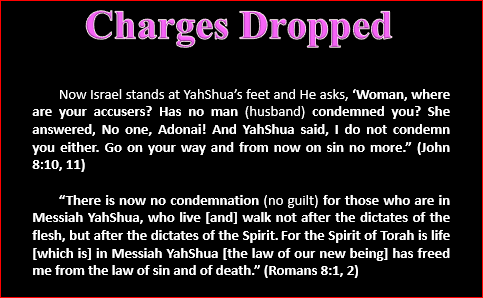
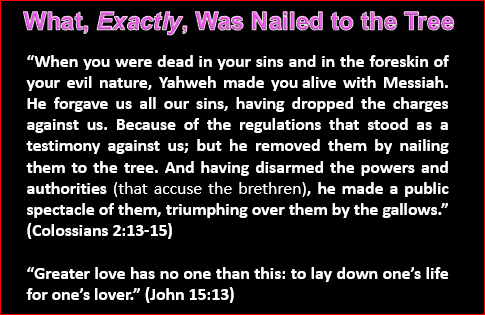
Did you see it - "YHWH dropped the charges against us", for our sins ?
That's what was "nailed to the tree (cross) !
RETURN to ME !
Jer 3:14-15 says :
“Return, O backsliding children, says Yahweh; for I am married to you: and I will take you one of a city, and two of a family, and I will bring you to Zion: and I will give you Pastors according to My heart which shall feed you with knowledge and understanding.”
MESSIAH YAHUSHUA could not RATIFY the Divorce, BUT, He did RATIFY the NEW COVENANT
Matt 26:27-29 explains :
“Then he took a cup (of Redemption), and when he had given thanks, he gave it to them, saying, ‘Drink from it, all of you. This is my blood of the New Covenant, which is poured out for many for the forgiveness of sins. I tell you, I will not drink from this fruit of the vine from now on until that day when I drink it new with you in my Father’s Kingdom (at the Marriage Feast of the Lamb).’”
Hos 2:14-15, 19-20 tell us :
“Therefore, behold, I will allure her, will bring her into the wilderness, and speak comfort to her. I will give her vineyards from there, and the Valley of Achor as a door of hope; she shall sing there, as in the days of her youth, as in the day when she came up from the land of Egypt…I will betroth you to Me forever; yes, I will betroth you to Me in righteousness and justice, in lovingkindness and mercy; I will betroth you to Me in faithfulness, and you shall know Yahweh.”
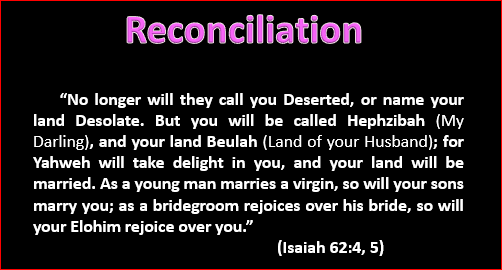
Dr Charles Adelle Lewis Totten said :
“I can never be too thankful to the Almighty that in my youth he used the late Professor Wilson to show me the difference between the TWO HOUSES.
The very understanding of this difference is the KEY by which almost the entire Bible becomes intelligible, and I cannot state too strongly that the man who has not yet seen that Israel of the Scripture is totally distinct from the Jewish people, is yet in the very infancy, the mere alphabet, of Biblical study, and that to this day the meaning of seven-eighths of the Bible is shut to his understanding.”
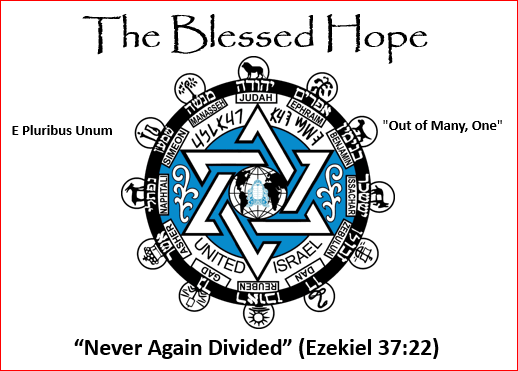
In Rom 10:5-13 we read :
“Moses writes this about the righteousness that is grounded in the Torah: ‘The person who does these things will live by them.’ (Leviticus 18:5) Moreover the righteousness that is grounded in faith says: ‘Do not say in your heart, “Who will ascend into heaven?” (that is, to bring Messiah down) or “Who will descend into the deep?” (that is, to bring Messiah up from the dead). What then does it say? “The word is near you; it is in your mouth and in your heart,” (Deuteronomy 30:12-14) that is, the Word of Faith that we preach: If you pledge allegiance with your mouth, ‘Yahushua is Sovereign,’ and believe in your heart that Yahweh raised him from the dead, you will be saved. For it is with your heart that you believe and are justified, and it is with your mouth that you pledge your allegiance and are saved. As Scripture says, ‘Anyone who believes in him will never be put to shame.’ (Isaiah 28:16) For there is no difference between Jew and Gentile — the same Sovereign is sovereign of all and richly blesses all who call on him, for, ‘Everyone who calls on the name of Yahweh will be saved.’”
I hope you can now see that, once you accept Messiah Yahushua as your Saviour, & King, you are now, a full member of Israel - although you were scattered for your "transgressions", you are now back in YHWH's family. WELCOME home !
If you'd like to read a study that provides physical evidence that you may be a "physical" Israelite, I encourage you to read :
"The Lost Tribes of Israel, Found" by Stephen Collins.
A Study Comparing ALL the Moedim (Appointed Times) of YHWH
There is often confusion about how the appointed times of YHWH are understood. This is because the English translations of the Hebrew, and/or Greek, are sometimes, not carefully defined, and because tradition has described them in a particular way.
The Hebrew word translated as appointed times or feasts is מועדים moedim (moed s).
YHWH’s appointed times, be they weekly (the 7th Day Sabbath), or annual, are all moedim.
Some moedim are chags חג (feasts), and some are chagags (pilgrimage chags).
Not all moedim are chags and/or chagags.
Some moedim are Shabbat Shabbatons (Sabbaths of rest).
Others moedim are Shabbatons (rests).
Some moedim are neither, Shabbat Shabbatons, or Shabbatons.
ALL of YHWH’s moedim are His appointed times.
Not all YHWH’s appointed times are feasts, and/or pilgrimage feasts.
Not all YHWH’s appointed times are Sabbaths (as in 7th Day Sabbaths) because they have different work requirements.
The 7th Day Sabbath, and Yom Kippur have the requirement of doing “no work” לאכה לא (Lev 23:3, & Lev 23:28, 30-31).
All of the other annual moedim have the requirement of doing “no servile work” כל מלאכת עבדה (Lev 23:7, 8, 21, 25, 35, 36).
“no work” is related to the 7th day of the week when you are to refrain from the work you did, on the previous 6 days (Ex 23:12).
“no servile work” possibly relates to the work the Hebrews did, when they were slaves to the Egyptians (Ex 1:14).
The following sections show the main characteristics of each of the moed, each "appointed time" of YHWH
THE 7th DAY SABBATH
It is always called “the” Sabbath
Celebrate the Sabbath on the seventh day of each week (Gen 2:1, Exod 16:23-30)
1: It is :
YHWH's weekly Appointed Time, His moed, & is indicated in Lev 23:2 – the Hebrew word, moed is Strong’s Number, H4150
a Sabbath of Rest, a Shabbat Shabbaton – Lev 23:3
an everlasting Ordinance – Exod 31:17
the sign of YHWH's Covenant with Israel – Exod 31:13-17
2: It is NOT:
a chag, a feast, or a chagag, a Pilgrimage Feast
3: Its purpose is to :
remind us of YHWH's creative power as told in Gen 1 & 2 – YHWH is our focus
remind us of YHWH's eternal covenant with Israel (Exod 31:17)
remember that our ancestors were slaves in Egypt, & that YHWH brought them out of Egypt with an out-stretched arm (Deut 5:12).
4: On the 7th day Sabbath, we are commanded to :
“Remember” the Sabbath – to zakar it – Exod 20:8
Remember to keep it set apart (holy) to YHWH - Exod 20:8
Guard/Protect/Keep/Observe the Sabbath – Deut 5:12
Do no work on the Sabbath – Exod 31:14-15
Rest on the Sabbath – Lev 23:3
Cause no one else to work on the Sabbath – Exod 20:10
Have a set-apart (holy) gathering on the Sabbath – Lev 23:3
Kindle no fire on the Sabbath – Exod 35:3
5: Because the following verses are not found in the first five books of YHWH’s Word, it seems logical that we are also encouraged to :
Not to buy and/or Sell on the Sabbath – Neh 10:31 & Neh 13:15
Not to do things for your own pleasure on the Sabbath – Isaiah 58:13-14
6: When we had a Temple, specific sacrifices were offered – Num 28:9-10
7: Because we are commanded NOT to do any work on “the Sabbath”, all food preparation should be done on the 6th day
8: Some other associated Scriptures are – Gen 2:2-3, Exod 20:8-11, Exod 31:16, Lev 23:3-4, & Deut 5:14
PASSOVER
Celebrate YHWH's Passover on the 14th day of the first month of the Biblical Year
1: It is :
an Appointed Time, a moed, as indicated in Lev 23:5-6 – it has Strong’s Number H4150
a chag, a Feast - Exod 12:14, Exod 34:25
a chagag, a Pilgrimage Feast - Exod 12:14
a memorial day - Exod 12:14
an everlasting Ordinance – Exod 12:14
an annual moed - Lev 23
the first day of unleavened bread - Exod 12:18, Matt 26:17
the start of the seven days of unleavened bread
2: It is not :
a Shabbaton or a Shabbat Shabbaton
3: Its purpose :
Passover is to remind us of how YHWH protected & saved Israel's first-born from being destroyed by the tenth plague
4: We are commanded to :
A: have a set-apart (holy) gathering (Lev 23:4)
B: keep this day as a "memorial" (Exod 12:14)
C:have a Passover meal as part of our memorial celebration (Exod 12:11)
D: keep no meat until morning (Num 9:12)
E: eat the Passover meal with Unleavened Bread, & bitter herbs (Exod 12:18, 8)
F: offer specific sacrifices when we had a Temple, (Num 28:19-25)
G: remove leaven from our houses (Exod 12:15)
5: Only circumcised males can part-take of the Passover meal (Exod 12:44, 48). Passover is a covenant renewal occasion.
6: Because cooking of the Passover meal is required, "cooking" is allowed.
7: No "servile work" is to be done (Lev 23:7)
8: Some other associated Scriptures are – Exod chapter 12, Lev 23:4-8, Num chapter 9, & Deut 16:1-8
Celebrate the Feast of Unleavened Bread on the 15th day of the first biblical month
1: It is :
an Appointed Time, a moed, as indicated in Lev 23:5-6 – it has Strong’s Number H4150
a chag, a Feast - Lev 23:6, Exod 23:15
a chagag, a Pilgrimage Feast - Exod 12:14-16, Deut 16:16
an everlasting Ordinance – Exod 12:17
part of the seven days of unleavened bread
an annual moed - Lev 23:4
2: It is not :
a Sabbaton or a Shabbat Shabbaton
as is commonly believed, based on Exod 12:18, & Matt 26:17, the first day of unleavened bread
3: Its purpose is
to remind us that our ancestors were slaves in Egypt, & YHWH delivered them from that slavery
4: We are commanded to :
A: have a set-apart (holy) gathering (Lev 23:4)
B: eat unleavened bread (Exod 12:15)
C: offer specific sacrifices when we had a Temple, (Num 28:19-25)
5: Because it is a festival day, I believe we are allowed to "cook" meals on this day
6: No "servile work" is to be done (Lev 23:7)
7: Some other associated Scriptures are – Exod 12:17, 23:15, 34:18, Lev 23:6, & Num 28:17
Comment
It is important to note that Lev 23:5 & 6 are joined with the Hebrew letter, vav, translated as "and". This means that the command to eat unleavened bread for seven days, is not to be interpreted to mean that this day is the first day of unleavened bread
The First Day of Unleavened Bread and the seventh day of Unleavened Bread
Based on Exod 12:18, Matt 26:17 & Mark 14:12, the first day of unleavened bread is the day of Passover, the 14th day of the first biblical month.
1: Each is :
an Appointed Time, a moed, as indicated in Lev 23:5-6 – it has Strong’s Number H4150
a chag, a Feast - Exod 23:15, since they are part of the seven days of Unleavened Bread
a chagag, a Pilgrimage Feast - Exod 12:14-16, Deut 16:16, since they are part of the seven days of Unleavened Bread
an everlasting Ordinance – Exod 12:17
an annual moed - Lev 23:4
2: Each is not :
a Shabbaton or Shabbat Shabbaton
3: Its purpose is
to remind us that our ancestors were slaves in Egypt, & YHWH delivered them from that slavery
4: We are commanded to :
A: have a set-apart (holy) gathering (Lev 23:4)
B: eat unleavened bread (Exod 12:15)
C: offer specific sacrifices when we had a Temple, (Num 28:19-25)
5: Because each is a festival day, I believe we are allowed to "cook" meals on these days
6: No "servile work" is to be done (Lev 23:7)
7: Some other associated Scriptures are – Exod 12:17, 23:15, 34:18, Lev 23:6, & Num 28:17, Deut 16:16
First Fruits
Celebrated on the day that the sheaf of first-fruits of the harvest are waved before YHWH
It is celebrated on the Sunday after the 7th day Sabbath, that follows the day of Passover (Lev 23:11)
1: It is :
an Appointed Time, a moed, as indicated in Lev 23:5-6 – it has Strong’s Number H4150
the first day of the counting of the Omer - Lev 23:15-16
an everlasting Ordinance – Exod 12:17 as it applies to the seven days of Unleavened Bread
an annual moed - Lev 23:4
2: It is not :
a Shabbaton or a Shabbat Shabbaton
a chag, a Feast
a chagag, a Pilgrimage Feast
a day of doing "no servile" work, or no work at all
3: Its purpose is :
to acknowledge that YHWH is the provider of all our needs
4: We are commanded to :
A: have a set-apart (holy) gathering (Lev 23:4)
B: eat unleavened bread (Exod 12:15)
C: offer specific sacrifices when we had a Temple, (Num 28:26-31)
D: start the count of the 50 days until the Feast of Shavuot (Lev 23:15-16)
Because Lev 23:11 uses the term "the Sabbath", we know that it is a reference to the seventh day Sabbath, & so the count of the Omer begins on the day after that seventh day Sabbath
5: Some other associated Scriptures are – Exod 23:16, 19, 34:26, Lev 2:12, 14, Lev 23:10-14, 20 & Num 28:26
Shavuot
Also called the Feast of Weeks and Pentecost
Celebrated by counting the 50 days of the Omer, starting on the Sunday of First Fruits (Lev 23:15-16, Deut 16:9)
A very good video on "How to count the 50 days to Shavuot" can be viewed @
https://www.youtube.com/watch?v=9y3L90OMbXI
1: It is :
an Appointed Time, a moed, as indicated in Lev 23:5-6 – it has Strong’s Number H4150
a chag, a Feast - Exod 34:22, Deut 16:10
a chagag, a Pilgrimage Feast - Exod 23:14-16, Deut 16:16,
the day after counting of 50 days of the Omer - Lev 23:15-16
an everlasting Ordinance Lev 23:21
an annual moed - Lev 23:4
2: It is not :
a Shabbaton or a Shabbat Shabbaton
3: Its purpose is to :
thank YHWH for the first-fruits of the wheat harvest (Exod 34:22), to rejoice before Him for His great blessings of the wheat harvest (Deut 16:11), & to remember that our ancestors were bondservants in Egypt (Deut 16:12)
4: We are commanded to :
A: have a set-apart (holy) gathering (Lev 23:4)
B: rejoice before YHWH (Deut 16:11)
C: do no "servile work" (Lev 23:7)
D: remember that we were bondservants in Egypt (Deut 16:12)
E: offer specific sacrifices when we had a Temple, (Num 28:26-31)
5: Because it is a festival day, I believe we are allowed to "cook" meals on these days
6: Some other associated Scriptures are –
Exod 23:14-15, 34:22, Lev 23:4, 15-22, Deut 16:10-12
Links
Shavuot the feast of weeks or Pentecost
https://www.youtube.com/watch?v=7o-b2_XjQ_E
MTOI– Shavuot from Sinai to the upper room (also see very good Notes)
http://www.mtoi.org/teachings/shavuot_from_sinai_to_the_upper_room.shtml
Tom @ Eliyah.com – Shavuot article
http://www.eliyah.com/transcripts/html/20150502.html
MTOI– Shavuot The Launching Point
https://www.youtube.com/watch?time_continue=6&v=bZW3Q-hQTiA
TOM TERUAH
Also called the Feast of Trumpets
Celebrated on the first day of the seventh month of the biblical year
1: It is :
an Appointed Time, a moed, as indicated in Lev 23:5-6 – it has Strong’s Number H4150
a Shabbaton, but not a Shabbat Shabbaton (Lev 23:24)
probably an everlasting Ordinance (but no reference found)
an annual moed - Lev 23:4
2: It is not :
a Shabbat Shabbaton
a chag, a Feast
a chagag, a Pilgrimage Feast
3: Its purpose is to :
remind us of making a very loud noise by shouting, & blowing shofars before YHWH
4: We are commanded to :
A: have a set-apart (holy) gathering (Lev 23:4)
B: create a noise traditionally by shouting, & by blowing the shofar (Lev 23:24, Num 29:1, Num 10:10)
C: do no "servile work" (Lev 23:7)
D: offer specific sacrifices when we had a Temple, (Num 29:1-6)
5: Because it is a festival day, I believe we are allowed to "cook" meals on these days
6: Neh 8 recommends us to :
A: Read the Book of the Torah (Neh 8:2-5)
B: Make a free-will offering (Neh 8:10)
C: Rejoice before YHWH (Neh 8:10)
D: Eat the Fat, & drink sweet drink (Neh 8:10, 12)
E: Send portions to the poor (Neh 8:10)
7: Some other associated Scriptures are –
Exod 23:14-16, Lev 23:24-25, Num 29:1-6, Neh 8:2-12
Links
http://www.unlearnthelies.com/yom-teruah-the-feast-of-trumpets.html
Shofar Blasts video https://www.youtube.com/watch?v=3yb_9Vt-Eso
Mark Biltz @ https://www.youtube.com/watch?v=shIMX5c08K0
http://www.hebrew4christians.com/Holidays/Fall_Holidays/Rosh_Hashannah/rosh_hashannah.html
http://www.lightofmashiach.org/yomteruah.html
http://blog.judahgabriel.com/2008/09/significance-of-yom-teruah-for.html
http://www.betemunah.org/teruah.html#_Toc368233932
YOM KIPPUR
Also known as the "Day of Atonements"
Celebrated on the tenth day of the seventh month of the biblical year
1: It is :
an Appointed Time, a moed, as indicated in Lev 23:5-6 – it has Strong’s Number H4150
a Shabbat Shabbaton (Lev 23:32)
an everlasting Ordinance (Lev 23:31)
an annual moed - Lev 23:4
2: It is not :
a chag, a Feast
a chagag, a Pilgrimage Feast
3: Its purpose is to :
remind us that on this day each year, YHWH forgave all the sins of the Israelites before Messiah Yahushua's sacrifice on the stake
4: We are commanded to :
have a set-apart (holy) gathering (Lev 23:4)
Do no work on Yom Kippur – Lev 23:27, 31
Afflict our souls - Lev 23:27, 32
Rest on Yom Kippur - Lev23:3
offer specific sacrifices when we had a Temple, (Num 29:7-11)
5: Related Scriptures - Lev 16:29,Lev 23:27-32, Num 29:7-11, Deut 16:13, 16
SUKKOT
Also known as the "Feast of Tabernacles"
Celebrated on the fifteenth day of the seventh month of the biblical year
1: It is :
an Appointed Time, a moed, as indicated in Lev 23:5-6 – it has Strong’s Number H4150
an everlasting Ordinance (Lev 23:31)
an annual moed - (Lev 23:4)
a shabbaton - (Lev 23:39)
a chag, a Feast (Lev 23:34)
a chagag, a Pilgrimage Feast (Lev 23:39)
2: It is not :
a Shabbat Shabbaton
3: Its purpose is to :
to acknowledge & thank YHWH for the harvest
4: We are commanded to :
have a set-apart (holy) gathering (Lev 23:4)
do no "servile work" (Lev 23:7)
rest on the 15th day of the seventh month (Leve 23:39)
celebrate for seven days (Lev 23:34)
dwell in booths (Lev 23:42)
take branches of various trees & rejoice for the seven days (Lev 23:40)
offer specific sacrifices when we had a Temple, (Num 29:12-40)
5: Because it is a festival day, I believe we are allowed to "cook" meals on these days
6: Some other associated Scriptures are –
Exod 23:14-16, Lev 23:34-43, Num 29:13-34, Deut 16:13, 16
The Eight Great Day
Celebrated on the eight day following the Feast of Sukkot
1: It is :
an Appointed Time, a moed, as indicated in Lev 23:5-6 – it has Strong’s Number H4150
an everlasting Ordinance (Lev 23:41)
an annual moed - (Lev 23:4)
a Shabbaton, but not a Shabbat Shabbaton (Lev 23:24)
2: It is not :
a Shabbat Shabbaton
3: Its purpose seems to :
remind us that the eighth day is about new beginnings which appears to be prophetic of the ultimate Eighth Day or the eighth millennium. On this day, the eighth day, YHWH will make everything new, & will dwell with mankind forever. All things will be restored, as it was before sin.
4: We are commanded to :
have a set-apart (holy) gathering (Lev 23:4)
do no "servile work" (Lev 23:7)
rest on the 8th day of the feastival of Sukkot (Leve 23:39)
5: Because it is a festival day, I believe we are allowed to "cook" meals on these days
offer specific sacrifices when we had a Temple, (Num 29:12-40)
6: Some other associated Scriptures are – Lev 23:36, Num 29:35-39, Deut 16:13, 16